

Search Smartraveller

Latest update
Exercise a high degree of caution in Azerbaijan overall due to the unpredictable security situation and ongoing tension along the border between Azerbaijan and Armenia.
Higher levels apply in some areas.
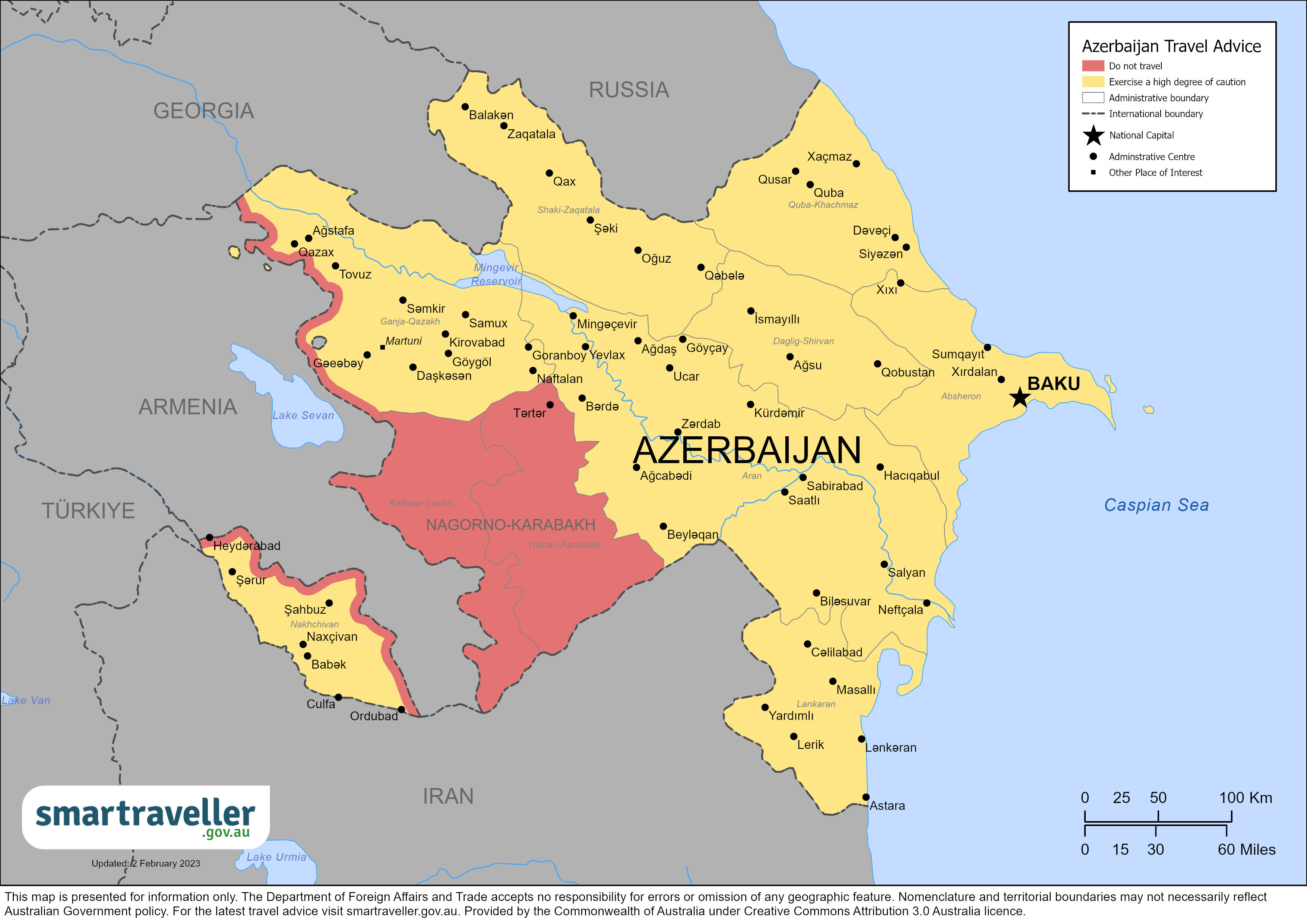
Azerbaijan (PDF 222.56 KB)
Europe (PDF 2.62 MB)
Local emergency contacts
Fire and rescue services, medical emergencies.
Call 112 for the emergency hotline.
Advice levels
Exercise a high degree of caution in Azerbaijan overall.
Do not travel to Armenia-Azerbaijan border areas or Nagorno-Karabakh and surrounding military occupied areas.
Do not travel to:
- Armenia-Azerbaijan border areas due to the risk of regular armed clashes
- Nagorno-Karabakh and surrounding areas due to the uncertain security environment and unmarked landmines.
- The security situation in Nagorno-Karabakh remains uncertain following military action in the region in September 2023.
- It's illegal to enter Nagorno-Karabakh without a permit. Nagorno-Karabakh and the surrounding region can have unmarked landmines. If, despite our advice, you travel to these areas, get professional security advice.
- Protests can turn violent. Avoid large public gatherings and exercise heightened caution in locations where foreigners may gather.
- Violent crime is rare in Azerbaijan, but foreigners have reported serious crimes, including home burglaries, robbery and assault. Be alert when walking after dark, including near hotels and residential areas. Don't use unofficial taxis. Don't use ATMs on the street.
- Terrorist attacks could occur anywhere and at any time. Terrorists may target tourist areas and attractions or other places frequented by foreigners. Take official warnings seriously. If there's a security incident, follow the advice of local authorities. There's an increased threat of attacks against Israel and Israeli interests.
Full travel advice: Safety
- Medical facilities are adequate in private hospitals in Baku. Services in government hospitals and rural areas are often limited.
- If you're seriously ill or injured, you may need medical evacuation to Turkiye or Western Europe. Ensure your travel insurance covers this.
- Malaria is a risk in the southern lowland areas. The risk is higher in summer, from June to August. Consider taking anti-malarial medication if you're travelling to these areas. Ensure your accommodation is insect-proof. Use insect repellent.
- Foodborne, waterborne and other infectious diseases include typhoid, hepatitis and brucellosis. Drink only boiled or bottled water. Avoid raw or undercooked food. Avoid unpasteurised dairy products.
Full travel advice: Health
- Always carry a copy of your passport and visa. The police can fine or detain you if you don't show a valid travel document when asked.
- Ensure you have the proper permits for buying antiques or cultural artefacts. It's illegal to export them without an official certificate and receipt of purchase. Export rules apply to religious objects, carpets, artworks and caviar. Check with local authorities before you export any items.
- It's illegal to convert a person to another faith.
- Most of Azerbaijan is conservative. Public displays of affection may not be welcome. Same-sex relations are legal but aren't widely accepted. LGBTI people may face discrimination, intolerance or violence based on sexuality and gender identity.
Full travel advice: Local laws
- You'll need a visa to visit Azerbaijan. You can apply for an electronic visa valid for 90 days.
- Contact the nearest embassy or consulate of Azerbaijan for details about visas, currency, customs and quarantine rules.
Full travel advice: Travel
Local contacts
- The Consular Services Charter details what we can and can't do to help you overseas.
- Australia doesn't have an embassy in Azerbaijan. For consular assistance, contact the Australian Embassy in Turkiye .
- You can also get limited consular assistance from the British Embassy in Baku . They can't provide notarial services or issue Australian passports.
- Follow the embassy's social media accounts to stay up to date with local information.
Full travel advice: Local contacts
Full advice
Civil unrest and political tension.
Demonstrations and protests
Public protests and events that draw large groups of people can turn violent. Police sometimes use force to break up demonstrations.
To stay safe during periods of unrest:
- avoid public protests and rallies
- monitor local media and other sources
- follow the advice of local authorities
More information:
- Demonstrations and civil unrest
Conflict zones
The region of Nagorno-Karabakh is now under the control of Azerbaijan following military action in September 2023. The security situation remains uncertain. Monitor local developments and announcements closely.
We recommend you do not travel to Armenia-Azerbaijan border areas or Nagorno-Karabakh.
Nagorno-Karabakh and the surrounding region can have unmarked landmines. If, despite our advice, you travel to these areas, get professional security advice. It's illegal to enter Nagorno-Karabakh without a permit.
Serious crime
Violent crime is rare in Azerbaijan.
Foreigners have reported serious crime, including home burglaries, robbery and assault .
Be careful walking after dark, including near hotels and in residential areas.
Drink and food spiking
Watch out for drink and food spiking. This can occur in bars and nightclubs in Baku. You're at higher risk of theft if you get drugged.
Never accept food or drinks from strangers or new acquaintances. Never leave food or drinks unattended.
Petty crime and scams
Petty crime, such as pickpocketing, can happen. Take care at outdoor markets and on public transport, including the Baku Metro.
Travellers and expats have reported thieves posing as police officers who demand money. Ask to follow the police officer to the nearest station to pay the fine.
Avoid using unofficial taxis. Ask your hotel to arrange one, or go to an official taxi rank.
Use ATMs in controlled areas, like banks, shops and shopping centres. Avoid ATMs that open onto the street, especially at night.
Cyber security
You may be at risk of cyber-based threats during overseas travel to any country. Digital identity theft is a growing concern. Your devices and personal data can be compromised, especially if you're connecting to Wi-Fi, using or connecting to shared or public computers, or to Bluetooth.
Social media can also be risky in destinations where there are social or political tensions or laws that may seem unreasonable by Australian standards. Travellers have been arrested for things they have said on social media. Don't comment on local or political events on your social media.
- Cyber security when travelling overseas
Terrorist attacks could occur anywhere and at any time. Terrorists may target tourist areas and attractions or other places frequented by foreigners.
Exercise heightened caution in locations where foreigners may gather.
To stay safe:
- be aware while in places known to be possible targets
- report suspicious activities or items to the police
- check the media for new threats
- take official warnings seriously
- follow the instructions of local authorities
If there is an attack, leave the area as soon as it's safe to do so.
Terrorism is a threat worldwide.
Climate and natural disasters
Earthquakes can happen in Azerbaijan.
To protect yourself if there's a natural disaster or severe weather :
- secure your passport in a safe, waterproof location
- keep in contact with friends and family
- check local media and other sources
Register with the Global Disaster Alert and Coordination System to receive alerts on major disasters.
Travel insurance
Get comprehensive travel insurance before you leave.
Your policy needs to cover all overseas medical costs, including medical evacuation. The Australian Government won't pay for these costs.
If you can't afford travel insurance, you can't afford to travel. This applies to everyone, no matter how healthy and fit you are.
If you're not insured, you may have to pay many thousands of dollars up-front for medical care.
- what activities and care your policy covers
- that your insurance covers you for the whole time you'll be away
Physical and mental health
Consider your physical and mental health before you travel, especially if you have an existing medical condition.
See your doctor or travel clinic to:
- have a basic health check-up
- ask if your travel plans may affect your health
- plan any vaccinations you need
Do this at least 8 weeks before you leave.
If you have immediate concerns for your welfare or the welfare of another Australian, call the 24-hour Consular Emergency Centre on +61 2 6261 3305 or contact your nearest Australian Embassy, High Commission or Consulate to discuss counselling hotlines and services available in your location.
- General health advice
- Healthy holiday tips (Healthdirect Australia)
Medications
Not all medication available over the counter or by prescription in Australia is available in other countries. Some may even be considered illegal or a controlled substance, even if prescribed by an Australian doctor.
If you plan to bring medication, check if it's legal in Azerbaijan. Take enough legal medicine for your trip.
Carry a letter from your doctor stating:
- what the medication is
- your required dosage
- that it's for personal use
Health risks
Insect-borne diseases.
Malaria is a risk in the southern lowland areas of Azerbaijan. The risk is higher in summer, from June to August.
To protect yourself from disease:
- make sure your accommodation is insect-proof
- use insect repellent
- wear long, loose, light-coloured clothing
- consider taking medicine to prevent malaria
HIV/AIDS is common. Take precautions if you engage in activities that may expose you to the virus.
Other health risks
Foodborne, waterborne and other infectious diseases are common. These include:
- tuberculosis
Serious outbreaks sometimes occur.
To protect yourself from illness:
- drink boiled water or bottled water with sealed lids
- avoid ice cubes
- avoid unpasteurised dairy products
- avoid raw and undercooked food, such as salads
Get medical advice if you have a fever or diarrhoea.
- Infectious diseases
Medical care
Medical facilities.
Medical facilities are adequate in private hospitals in Baku.
Services in government hospitals and other areas of the country are often limited. Shortages of basic medical supplies are common.
Serious illness or injury may require evacuation to Turkiye or Western Europe. Make sure your insurance covers this. Medical evacuation can be very expensive.
Doctors and hospitals will usually need up-front payment before treatment.
Critical care for Australians who become seriously ill is likely to be significantly below the standards available in Australia.
You're subject to all local laws and penalties, including those that appear harsh by Australian standards. Research local laws before travelling.
If you're arrested or jailed, the Australian Government will do what it can to help you under our Consular Services Charter . But we can't get you out of trouble or out of jail.
Penalties for drug offences are severe. They can include long prison sentences and heavy fines.
- Carrying or using drugs
Always carry a copy of your passport and visa. Routine police checks in public and tourist spots are common.
You could be fined or jailed if you don't show a valid travel document when asked.
In Azerbaijan, it's illegal to:
- visit or take photos of military equipment and sites
- take photos of military personnel
- buy antique or cultural artefacts without a permit
- export antiques or cultural artefacts without an official certificate and receipt of purchase
- convert a person to another faith
Export rules apply to religious objects, carpets, artworks and caviar. Check with local authorities before you export any items.
- If you're suspected of a crime, you may have to stay in Azerbaijan while your case is investigated.
Australian laws
Some Australian criminal laws still apply when you're overseas. If you break these laws, you may face prosecution in Australia.
- Staying within the law and respecting customs
Dual citizenship
Azerbaijan doesn't recognise dual nationality.
If you're a dual citizen, this limits the consular services we can give if you're arrested or detained.
Always travel on your Australian passport .
Azerbaijan citizens may need to do military service. If you're an Australian-Azerbaijani dual national, get advice on your service obligations from the embassy or consulate of Azerbaijan . Do this well before you travel.
- Dual nationals
Local customs
The Islamic holiday month of Ramadan is observed in Azerbaijan. Respect religious and cultural customs and laws at this time.
During Ramadan, eating, drinking, and smoking may be illegal in public during the day. If you're not fasting, avoid these activities around people who are. Seek local advice to avoid offence.
Explore our Ramadan page to learn more, including dates for Ramadan.
Dress and behaviour
Dress standards can be conservative outside of Baku. Public displays of affection may not be welcome. Dress conservatively. Take care not to offend. If in doubt, seek local advice.
LGBTI information
Same-sex relationships are legal but not widely accepted.
Intolerance, discrimination and violence towards LGBTI people happens in Azerbaijan. Avoid public displays of affection.
- Advice for LGBTI people
Visas and Border measures
Every country or territory decides who can enter or leave through its borders. For specific information about the evidence you'll need to enter a foreign destination, check with the nearest embassy, consulate or immigration department of the destination you're entering.
You'll need a visa to visit Azerbaijan.
You can apply for an electronic visa (e-visa) valid for 90 days. You can do this online through Azerbaijan's Official Electronic Visa Portal . Allow at least 3 business days for processing.
Visa and other entry and exit conditions can change at short notice. Contact the nearest embassy or consulate of Azerbaijan for details about visas, currency, customs and quarantine rules.
Ensure your passport is valid for at least 3 months from the expiry date of the e-visa.
Visa extensions
You can apply to extend or renew your visa through Azerbaijan's State Migration Service . Keep a copy of your passport and existing visa while your application is being processed. The Ministry of Interior Police may ask to see your documents at any time. See Local laws .
- Ministry of Foreign Affairs of the Republic of Azerbaijan
Registering with the police
If you plan to stay in Azerbaijan for over 15 days, you must register with the State Migration Service online (registration upon place of stay) or at regional migration departments ( www.migration.gov.az ), even if you have a 90-day visa. Do this within 10 days of arrival. If you don't, you'll be fined.
You may not be able to leave Azerbaijan until you pay the fine and get an exit permit from the State Migration Service .
Travel via Nagorno-Karabakh
If your passport has visas or stamps from Nagorno-Karabakh, you could be refused entry into Azerbaijan.
Travel via neighbouring countries
Travel restrictions may apply to Australians travelling overland from Azerbaijan to neighbouring countries.
Check the nearest embassy or consulate of Azerbaijan for any travel restrictions. You'll also need to check the rules of neighbouring countries.
Some countries won’t let you enter unless your passport is valid for 6 months after you plan to leave that country. This can apply even if you’re just transiting or stopping over.
Some foreign governments and airlines apply the rule inconsistently. Travellers can receive conflicting advice from different sources.
You can end up stranded if your passport is not valid for more than 6 months.
The Australian Government does not set these rules. Check your passport’s expiry date before you travel. If you’re not sure it’ll be valid for long enough, consider getting a new passport .
Lost or stolen passport
Your passport is a valuable document. It's attractive to people who may try to use your identity to commit crimes.
Some people may try to trick you into giving them your passport. Always keep it in a safe place.
If your passport is lost or stolen, tell the Australian Government as soon as possible:
- In Australia, contact the Australian Passport Information Service .
- If you're overseas, contact the nearest Australian embassy or consulate .
Passport with 'X' gender identifier
Although Australian passports comply with international standards for sex and gender, we can’t guarantee that a passport showing 'X' in the sex field will be accepted for entry or transit by another country. Contact the nearest embassy, high commission or consulate of your destination before you arrive at the border to confirm if authorities will accept passports with 'X' gender markers.
- LGBTI travellers
Azerbaijan's currency is the Azerbaijani Manat (AZN).
Declare any amount of foreign currency on arrival. This covers all forms of currency, not only cash.
You can export up to $US10,000 without documentation. Contact the embassy or consulate of Azerbaijan for details.
Azerbaijan is a cash-based economy. You'll need to pay in local currency for most goods and services.
US dollars and euros are common. You can change notes in good condition for local currency.
Credit cards are becoming more common in major cities. They may not be accepted in smaller restaurants and stores.
Traveller's cheques aren't often accepted, except in major hotels, some restaurants and banks.
ATMs are available in major cities.
Local travel
Driving permit.
You can drive in Azerbaijan with a current Australian driver's licence. Foreigners staying for more than one month may need to get a local driver's licence through ASAN Service Offices.
You may also need an International Driving Permit (IDP) for travel and car insurance. Check with your insurer and car provider before you drive.
Road travel
Driving in Azerbaijan can be dangerous. Common dangers include:
- roads and vehicles in poor condition
- drivers who ignore traffic signals and rules
- high-speed crashes that cause serious injury or death
- rural roads without lights or road signs
- sharing the road with pedestrians, slow-moving farm equipment and livestock
Right-hand drive cars are illegal in Azerbaijan.
It's illegal to drive with a blood alcohol reading above 0%.
Before you drive in Azerbaijan:
- check if your travel insurance will cover you
- get to know local road rules
Look out for pedestrians, livestock and farm equipment when you drive, particularly in rural areas.
- Driving or riding
Use registered taxis and authorised limousines. It's best to get your hotel to arrange a taxi for you.
Avoid flagging down taxis in the street.
Always use an official taxi rank.
Sit in the back seat rather than the front.
Public transport
Public transport can be overcrowded, especially buses. It may not meet Australian safety standards.
Take care of your belongings because petty crime occurs.
- Transport and getting around safely
Rail travel
The Baku Metro is fairly good, with basic safety equipment and procedures. Metro signs are in Azerbaijani.
To reduce your risks if you travel by overland train:
- secure your valuables
- don't leave the compartment unattended
- lock the door of your compartment from the inside
Before you travel on Azerbaijan's domestic airlines, be aware that:
- planes may not meet international standards for maintenance
- overbooking and overcrowding is common
- cancellations and delays can occur without explanation
DFAT doesn't provide information on the safety of individual commercial airlines or flight paths.
Check Azerbaijan's air safety profile with the Aviation Safety Network.
Emergencies
Depending on what you need, contact your:
- family and friends
- travel agent
- insurance provider
Always get a police report when you report a crime.
Your insurer should have a 24-hour emergency number.
Consular contacts
Read the Consular Services Charter for what the Australian Government can and can't do to help you overseas.
Australia doesn't have an embassy in Azerbaijan. For consular help, contact the Australian Embassy in Turkiye.
Australian Embassy, Ankara
MNG Building, 7th Floor 88 Uĝur Mumcu Caddesi Gaziosmanpaşa, Ankara Turkey
Phone: +90 312 459 9500 Fax: +90 312 446 4827 Website: turkey.embassy.gov.au Email: [email protected] Facebook: Australia in Turkiye X: @AusAmbTurk iye
Check the Embassy website for details about opening hours and any temporary closures.
Limited consular assistance (not including notarial services or the issue of Australian passports) is available from the British Embassy in Baku.
British Embassy, Baku
45 Khagani Street Baku 1010 Azerbaijan
Phone: (+994 12) 437 7878 Fax: (+994 12) 497 7434 Website: gov.uk/world/organisations/british-embassy-baku
24-hour Consular Emergency Centre
In a consular emergency, if you can't contact an embassy, call the 24-hour Consular Emergency Centre on:
- +61 2 6261 3305 from overseas
- 1300 555 135 in Australia

Travelling to Azerbaijan?
Sign up to get the latest travel advice updates..
Be the first to know official government advice when travelling.
An Ultimate Guide to Azerbaijan
If you’re searching for an exciting, lesser-known destination for your next trip, Azerbaijan is an excellent choice. It’s not overrun by tourists, which means you’ll get to explore its unique charms without the crowds. This hidden gem offers a blend of East and West, with rich cultural heritage, stunning landscapes, and a warm, welcoming spirit.
Azerbaijan: A Comprehensive Travel Guide for the First-Timers
Planning a trip to Azerbaijan? You’re in for a great time! This journey might just be one of the best you’ll ever have. To make it even better, I’ve put together a travel guide to Azerbaijan based on my own experiences. This guide will make it easy for you to discover all the wonderful places and experiences this country has to offer.
Azerbaijan: First Impressions

Azerbaijan is often called the Land of Fire , a name that comes from its unusual natural fires. In this country, you’ll find an amazing mix of the old and the new.
The capital city, Baku, epitomizes this mix. The city is very modern with tall, impressive buildings that make it feel like you’re stepping into the future.
But Baku also has a historic side, called Icherisheher . This old part of the city stands in beautiful contrast to the new buildings, showing off Baku’s rich history and its modern ambitions side by side.
Additionally, the country’s oil wealth is evident, adding a layer of prosperity and development to its urban landscape, which further enhances its unique character.
Outside of Baku, Azerbaijan has many small, quiet old villages that seem like they haven’t changed for centuries. These villages, my friend, are a treasure trove of rich cultural heritage and traditional ways of life.
What’s really special about Azerbaijan is how it mixes European and Asian cultures. You can see this in the food, the buildings, and the way people live. It’s like a bridge between two continents.
Plus, the country is home to the stunning Caucasus mountains, adding to its natural beauty.
This unique combination of city life, ancient villages, and beautiful landscapes makes Azerbaijan a fascinating place to visit.
Where is Azerbaijan

Azerbaijan, situated in Southwestern Asia, is a country without a coastline except for its border along the Caspian Sea.
It’s nestled among several countries: Russia and Georgia to the north, Armenia to the west, Iran to the south, and it also shares a small border with Turkey.
How Many Days in Azerbaijan

Your perfect length of stay in Azerbaijan really depends on what you like – history, nature, or culture. Usually, people visit for about 5 to 10 days.
If you’ve got 5 to 7 days , that’s great for a quick trip. You can spend a few days in Baku to see the old and new parts of the city. Plus, you can take short trips to places like Gobustan National Park and the Ateshgah Fire Temple. Also, you can visit a beautiful area like Sheki, Quba, or Gabala for a day or two.
If you have 10 days or even more, you can explore more of the country. After seeing Baku, you can travel to different towns and villages, enjoy the Caspian Sea beaches, check out the mud volcanoes, and maybe travel to far-off places like Nakhchivan. With more time, you can really get to know each place better and take your time exploring.

How to Get to Azerbaijan
The most common and easiest way to travel to Azerbaijan is by flying. Heydar Aliyev International Airport in Baku is the primary airport for international flights. Various major airlines have flights to Baku from cities worldwide, and if there’s no direct flight from your location, you might transit through key hubs like Istanbul, Dubai, or Moscow.
For those already in nearby countries such as Georgia, Russia, or Iran, overland options like train or bus services, including the overnight train and minibus (marshrutka) from Tbilisi, Georgia, to Baku, are usually available.
If you prefer the freedom of driving, traveling by car (whether rented or your own) from Georgia offers a picturesque journey.
An alternative way to reach Azerbaijan is by taking a ferry across the Caspian Sea, with services available from Kazakhstan and Turkmenistan.
Important Note: At the moment of writing this, Azerbaijan’s land and sea borders are closed to tourists , meaning entry is only possible by air. The closure of these borders is expected to continue at least until January 2, 2024. As a result, for now, flying is the only option for entering Azerbaijan.
How to Get Around Azerbaijan
In Baku, the capital of Azerbaijan, getting around is easy with its modern metro system. It’s cheap and connects major areas.
Buses are everywhere in the cities and good for longer trips too. Baku’s buses go all over the city and comfortable buses link big towns and places tourists like to visit.
Marshrutkas, or minibusses, are a quick, cheap way to get between cities. They’re smaller and faster than buses but might not be as comfy. Indeed, even for travelers accustomed to using budget public transport, these minibusses can be quite uncomfortable.
Taxis are easy to find in Baku and other cities. Just make sure to use official taxis and agree on the price first.
There’s also a train network, not as efficient, in Azerbaijan. It links Baku with cities like Ganja and Sheki.
I wouldn’t recommend self-driving in Azerbaijan because the road conditions, combined with local drivers not following the rules and often driving rashly, can make it quite challenging and potentially unsafe, especially for those not familiar with such driving environments. Instead, opt to rent a car with a driver from a well-known tour company.
We hired a car with a driver, instructing him to follow the traffic rules, which was a real time-saver and made things easier. However, we did face some communication challenges, as the driver didn’t understand much English. Thankfully, Google Translate was a big help in overcoming this communication hurdle!
Best Time to Visit Azerbaijan

The best time to visit Azerbaijan is during the spring (April to June) and autumn (September to November) months. During these periods, the weather is mild and pleasant, ideal for exploring the country’s diverse landscapes, and fewer tourists provide a more relaxed experience.
For culture enthusiasts, March is an excellent time to visit Azerbaijan, coinciding with the vibrant Novruz Bayrami celebrations. This traditional holiday marks the Persian New Year and the arrival of spring, and it’s filled with rich cultural events, traditional music, dance, and a variety of local delicacies. It’s a unique opportunity to immerse yourself in Azerbaijani customs and festivities.
Unmissable Experiences in Azerbaijan
Azerbaijan offers quite a few captivating experiences that showcase its unique culture, history, and natural beauty. Let me share with you some of the top experiences you shouldn’t miss:
- Explore the Ancient & Modern Wonders of Baku

Exploring Baku, the capital of Azerbaijan, is an amazing adventure. This city has a mix of old and new things. When you walk around the Old City, called Icherisheher , a UNESCO World Heritage site, it’s like going back in time. The narrow streets and old buildings there are just magical.
Then, as you leave the old part of the city, you’ll see a completely different side of Baku. The city is famous for its ultra-modern architecture. The Flame Towers , three tall skyscrapers, really stand out. At night, they light up with LED lights that look like flickering flames – it’s an amazing sight.

Don’t miss the Heydar Aliyev Center , designed by the famous architect Zaha Hadid . Its smooth, futuristic look is a total contrast to the historic buildings in the Old City and shows just how diverse Baku is.
Baku isn’t just about its buildings, though. The city’s culture is a lively mix of the traditional and the modern. You can enjoy classic Azerbaijani music and dance, and then relax in a stylish cafe or fancy restaurant. This blend of the old and the new is what makes Baku’s charm really special.
- Experience the Silk Road Legacy in Azerbaijan
Discovering Azerbaijan’s Silk Road legacy is a truly enriching experience for any traveler. This journey takes you deep into the country’s history as a key crossroads on the ancient Silk Road .
Azerbaijan sits where East meets West, playing a vital role in this historic trade and cultural route. This rich past is best seen in its caravanserais – ancient inns where Silk Road travelers and merchants would rest.
In Baku, the Multani Caravanserai , dating back to the 15th century, is one of the most striking examples. Walking through its arched doorways and exploring its stone corridors, you can almost hear the whispers of ancient traders and the clatter of caravans.
Another notable caravanserai is the 14th-century Bukhara Caravanserai , also located in Baku.
Beyond Baku, places like Sheki and Ganja also hold significant remnants of the Silk Road . The Sheki Caravanserai , with its magnificent façade and intricate design, highlights Sheki’s role in historic trade and craftsmanship.

Azerbaijan’s bazaars also reflect the Silk Road’s influence. Bustling markets filled with spices and colorful goods give you a taste of what ancient trade was like.
In Nakhchivan , an autonomous part of Azerbaijan, you can further explore the Silk Road’s impact. It was a crucial stop on this ancient trading route, connecting Europe and Asia. Here, you can see old places, special buildings, and customs that remind us of the Silk Road days.
Embarking on this journey through Azerbaijan’s Silk Road history connects you with the stories and people of a land that was a central hub in this famous trade network.
- Discover the Historical Castles and Fortresses of Azerbaijan
Azerbaijan is filled with historic castles and fortresses, each telling a unique story of the country’s past.
In Baku, you shouldn’t miss the Maiden Tower , a mysterious and ancient tower with amazing views of the city and sea. Also in Baku is the Palace of the Shirvanshahs , a beautiful 15th-century palace that shows how important the Shirvan Empire was.

Out in the countryside, you’ll find old fortresses on hills and valleys, reminding us of times when they protected the land. The Sheki Fortress in the scenic town of Sheki is a great example, showing the area’s medieval history and its ties to the Silk Road.
For something unique, visit Alinja Castle , sometimes called Azerbaijan’s “ Machu Picchu .” It’s high up on a mountain and was once a very strong fortress. The views from the top are incredible.
There’s also the Gulistan Fortress , an old but important stronghold that has seen many historical events. It gives a great look at the region’s past military strategies.
These fortresses, along with others scattered across Azerbaijan, are not merely relics of the past. They are enduring symbols of Azerbaijani resilience and architectural ingenuity.
- Tour the Ancient Villages of Azerbaijan
The quaint, peaceful, tiny villages of Azerbaijan are like time capsules, preserving centuries-old traditions, architecture, and ways of life.
Exploring these villages is like walking in a living museum, where every alleyway, every craft, and every local custom speaks volumes about the country’s fascinating past and enduring spirit.
To get into the skin of the country’s culture, you must explore its villages.
Khinalug , high in the Caucasus Mountains, is incredibly old and remote. Life here hasn’t changed much in over a thousand years. The people still speak their language and live in traditional houses on the mountainside.
In Lahij , known for its stone streets and copper work, you’ll feel like you’re in the Middle Ages. This mountain village is famous for keeping old crafts alive. The sound of copper smiths mixes with the village’s old-world feel, showing off Azerbaijan’s craft heritage.

Quba , another old village, has a charm of its own. Famous for apples and carpets, Quba is a mix of colors and traditions. It’s not just pretty, with its old-style buildings, but also full of life, from busy markets to green scenery.
- Uncover the Breathtaking Natural Wonders of Azerbaijan
Azerbaijan is a land of many contrasts, with unique mud volcanoes, eternal flames, peaceful lakes, beautiful waterfalls, the grand Caucasus mountains, and the calm Caspian Sea coast.
The country is known for its over 300 mud volcanoes, some of the most active worldwide. These natural wonders are spread across Azerbaijan, with the most famous one in Gobustan , a UNESCO World Heritage Site. Gobustan is not only known for its mud volcanoes but also for ancient rock carvings.

Yanar Dag , or Burning Mountain, is where natural gas fires burn continuously, creating a magical scene, especially at night. This is why Azerbaijan is nicknamed the “Land of Fire.”
Near Baku is the Ateshgah Fire Temple , a historic site for fire-worshippers, built over a natural gas vent. The eternal flame here is a unique feature of Azerbaijan.
For nature lovers, Azerbaijan has lovely lakes like Lake Nohur , Rose Lake (known for its pink waters), and Lake Goygol .
The Caucasus Mountains, stretching across northern Azerbaijan, are perfect for adventures. They offer stunning views, hiking paths, and a chance to see diverse wildlife. Mountain villages show centuries-old traditional lifestyles.
The Caspian Sea, the world’s largest inland body of water, boasts beautiful beaches in Azerbaijan, with the backdrop of the Caucasus Mountains. Some of the best beaches in Azerbaijan that I would recommend are Bilgah Beach, Dalga Beach, and Amburan Beach.
The Caspian Sea is also a hotspot for unique wildlife and is popular with birdwatchers, especially during bird migration seasons.
Where to Stay in Azerbaijan
In Azerbaijan, Baku has many luxury and boutique hotels, plus big international brands. Staying on Nizami Street in Baku is great for a top-notch experience. It’s lively, full of shops and restaurants, and close to many attractions.

Outside Baku, in places like Sheki, Lahij, and Quba, you can stay in traditional guesthouses. These are cozy and show off the local style. They’re usually run by families, so you get a warm, homely feel. You can also try delicious home-cooked Azerbaijani food there.
If you’re in rural or remote areas, consider a homestay. You’ll live with a local family, which is a great way to understand Azerbaijani life and culture.
For nature lovers, regions like Gabala and Guba offer mountain retreats and lodges. These are in beautiful spots with great views of mountains and forests. They come in different styles and prices, from simple to luxurious.
Things to Consider While Traveling to Azerbaijan

- Before your trip to Azerbaijan, it’s important to verify whether you require a visa. Many travelers can obtain an e-visa through the ASAN Visa system , which is a straightforward online application process.
- For stays exceeding 15 days, you must register with the State Migration Service within 15 days after arriving in Azerbaijan.
- Azerbaijan’s geography means it has multiple climate zones. Pack accordingly, especially if you’re planning to visit both the mountains and the coast
- Dress modestly, especially in rural areas and at religious places. In cities like Baku, you can dress more casually like in European cities. Remember to bring a scarf for visiting religious sites.
- Whether exploring Baku’s cityscape or venturing into rural areas, comfortable shoes are a must.
- Not many locals speak English, so knowing some Azerbaijani phrases is useful. Also, keep the Google Translate app handy – it’s a big help! There are other important travel apps you should consider downloading before your trip.
- The currency in Azerbaijan is the Azerbaijani Manat (AZN). While credit cards are commonly used, it’s a good idea to have cash on hand for visits to rural areas.
- Don’t miss out on local dishes like plov, kebabs, and dolma.
- While Baku is a must-visit, Azerbaijan’s true charm lies in its diverse regions, from the Caucasus Mountains to the Caspian Sea. So, explore beyond Baku!
- If you’re traveling to Azerbaijan in winter, don’t miss the opportunity to visit Shahdag Mountain Resort and Tufandag Mountain Resort , both offering excellent skiing experiences.
- Exchange money at trustworthy banks or exchange offices and steer clear of street dealers to avoid bad rates or fake currency.
That’s it for my Azerbaijan guide! I hope it helps you plan an amazing trip. Azerbaijan really left a big impact on me, and I think it’ll do the same for you. My unexpected trip there turned into an adventure I’ll never forget.
I’m already thinking about going back. Next time, I want to see more places I didn’t get to before. There’s so much to see in Azerbaijan, and one trip isn’t enough to see it all. I’m looking forward to returning and exploring even more of its culture and beautiful scenery.
Happy travels, and may your journey be as colorful and inspiring as a sunset over the Caspian Sea. Azerbaijan awaits you!
Anjali from Travel Melodies , who has recently explored Azerbaijan, generously shared her top tips to help you fully enjoy your time there. She’s put together this Azerbaijan guide just for you.
Keep reading: Silk Road: A trip from China to Turkey

You are using an outdated browser. Upgrade your browser today or install Google Chrome Frame to better experience this site.
Azerbaijan Traveler View
Travel health notices, vaccines and medicines, non-vaccine-preventable diseases, stay healthy and safe.
- Packing List
After Your Trip
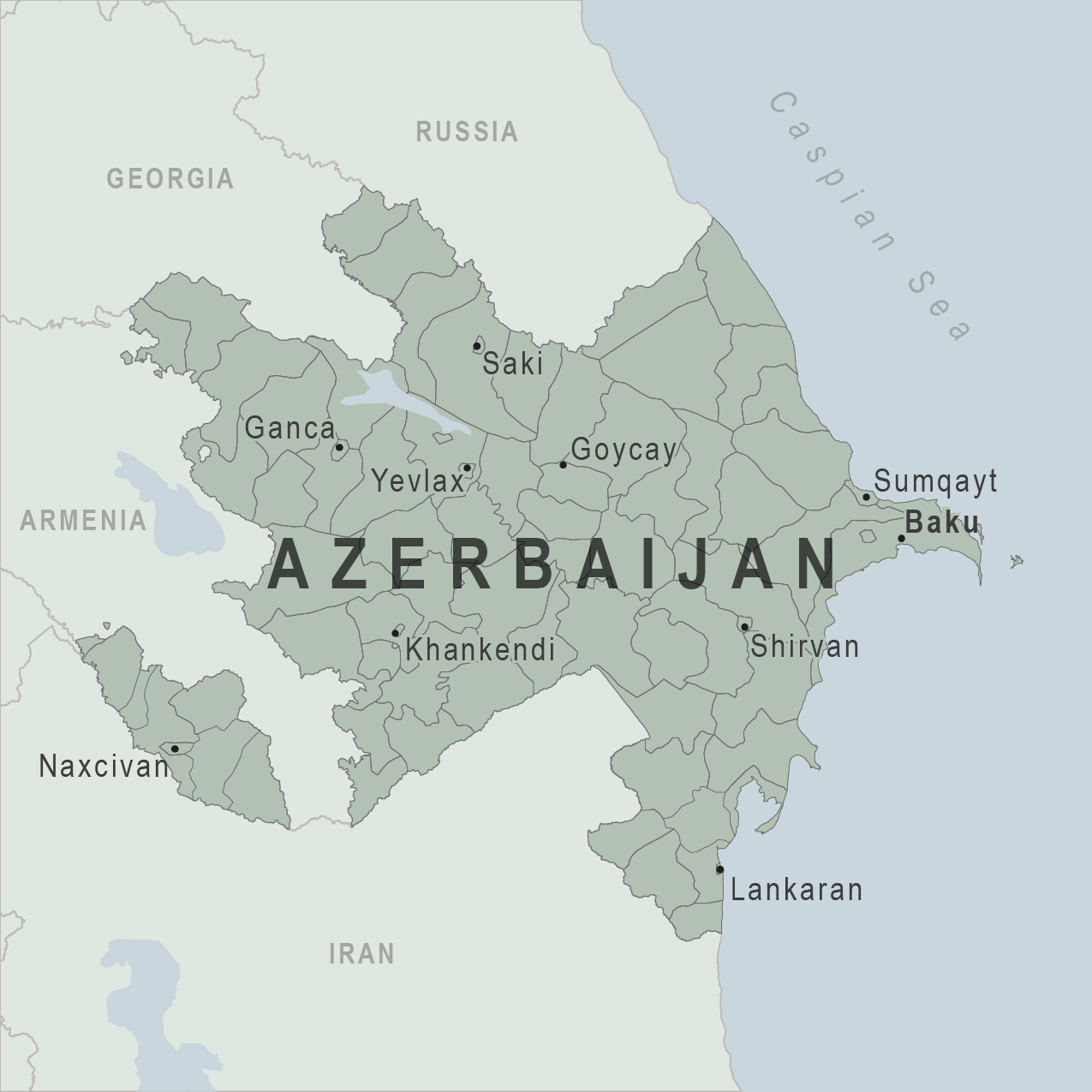
Be aware of current health issues in Azerbaijan. Learn how to protect yourself.
Level 1 Practice Usual Precautions
- Global Measles March 22, 2024 Many international destinations are reporting increased numbers of cases of measles. Destination List: Afghanistan, Angola, Armenia, Azerbaijan, Benin, Burkina Faso, Burundi, Cameroon, Central African Republic, Chad, Côte d'Ivoire (Ivory Coast), Democratic Republic of the Congo, Djibouti, Equatorial Guinea, Ethiopia, Gabon, Ghana, India, Indonesia, Kazakhstan, Kyrgyzstan, Lebanon, Liberia, Libya, Malaysia, Mauritania, Nepal, Niger, Nigeria, Pakistan, Qatar, Republic of South Sudan, Republic of the Congo, Romania, Russia, Senegal, Somalia, Sri Lanka, Sudan, Syria, Tajikistan, Togo, Turkey, United Arab Emirates, Uzbekistan, Yemen, Zambia
⇧ Top
Check the vaccines and medicines list and visit your doctor at least a month before your trip to get vaccines or medicines you may need. If you or your doctor need help finding a location that provides certain vaccines or medicines, visit the Find a Clinic page.
Routine vaccines
Recommendations.
Make sure you are up-to-date on all routine vaccines before every trip. Some of these vaccines include
- Chickenpox (Varicella)
- Diphtheria-Tetanus-Pertussis
- Flu (influenza)
- Measles-Mumps-Rubella (MMR)
Immunization schedules
All eligible travelers should be up to date with their COVID-19 vaccines. Please see Your COVID-19 Vaccination for more information.
COVID-19 vaccine
Hepatitis A
Recommended for unvaccinated travelers one year old or older going to Azerbaijan.
Infants 6 to 11 months old should also be vaccinated against Hepatitis A. The dose does not count toward the routine 2-dose series.
Travelers allergic to a vaccine component or who are younger than 6 months should receive a single dose of immune globulin, which provides effective protection for up to 2 months depending on dosage given.
Unvaccinated travelers who are over 40 years old, immunocompromised, or have chronic medical conditions planning to depart to a risk area in less than 2 weeks should get the initial dose of vaccine and at the same appointment receive immune globulin.
Hepatitis A - CDC Yellow Book
Dosing info - Hep A
Hepatitis B
Recommended for unvaccinated travelers younger than 60 years old traveling to Azerbaijan. Unvaccinated travelers 60 years and older may get vaccinated before traveling to Azerbaijan.
Hepatitis B - CDC Yellow Book
Dosing info - Hep B
Cases of measles are on the rise worldwide. Travelers are at risk of measles if they have not been fully vaccinated at least two weeks prior to departure, or have not had measles in the past, and travel internationally to areas where measles is spreading.
All international travelers should be fully vaccinated against measles with the measles-mumps-rubella (MMR) vaccine, including an early dose for infants 6–11 months, according to CDC’s measles vaccination recommendations for international travel .
Measles (Rubeola) - CDC Yellow Book
Rabid dogs are commonly found in Azerbaijan. If you are bitten or scratched by a dog or other mammal while in Azerbaijan, there may be limited or no rabies treatment available.
Consider rabies vaccination before your trip if your activities mean you will be around dogs or wildlife.
Travelers more likely to encounter rabid animals include
- Campers, adventure travelers, or cave explorers (spelunkers)
- Veterinarians, animal handlers, field biologists, or laboratory workers handling animal specimens
- Visitors to rural areas
Since children are more likely to be bitten or scratched by a dog or other animals, consider rabies vaccination for children traveling to Azerbaijan.
Rabies - CDC Yellow Book
Avoid contaminated water
Leptospirosis
How most people get sick (most common modes of transmission)
- Touching urine or other body fluids from an animal infected with leptospirosis
- Swimming or wading in urine-contaminated fresh water, or contact with urine-contaminated mud
- Drinking water or eating food contaminated with animal urine
- Avoid contaminated water and soil
Clinical Guidance
Avoid bug bites.
Crimean-Congo Hemorrhagic fever
- Tick bite
- Touching the body fluids of a person or animal infected with CCHF
- Avoid Bug Bites
Leishmaniasis
- Sand fly bite
Airborne & droplet
- Breathing in air or accidentally eating food contaminated with the urine, droppings, or saliva of infected rodents
- Bite from an infected rodent
- Less commonly, being around someone sick with hantavirus (only occurs with Andes virus)
- Avoid rodents and areas where they live
- Avoid sick people
Tuberculosis (TB)
- Breathe in TB bacteria that is in the air from an infected and contagious person coughing, speaking, or singing.
Learn actions you can take to stay healthy and safe on your trip. Vaccines cannot protect you from many diseases in Azerbaijan, so your behaviors are important.
Eat and drink safely
Food and water standards around the world vary based on the destination. Standards may also differ within a country and risk may change depending on activity type (e.g., hiking versus business trip). You can learn more about safe food and drink choices when traveling by accessing the resources below.
- Choose Safe Food and Drinks When Traveling
- Water Treatment Options When Hiking, Camping or Traveling
- Global Water, Sanitation and Hygiene | Healthy Water
- Avoid Contaminated Water During Travel
You can also visit the Department of State Country Information Pages for additional information about food and water safety.
Prevent bug bites
Bugs (like mosquitoes, ticks, and fleas) can spread a number of diseases in Azerbaijan. Many of these diseases cannot be prevented with a vaccine or medicine. You can reduce your risk by taking steps to prevent bug bites.
What can I do to prevent bug bites?
- Cover exposed skin by wearing long-sleeved shirts, long pants, and hats.
- Use an appropriate insect repellent (see below).
- Use permethrin-treated clothing and gear (such as boots, pants, socks, and tents). Do not use permethrin directly on skin.
- Stay and sleep in air-conditioned or screened rooms.
- Use a bed net if the area where you are sleeping is exposed to the outdoors.
What type of insect repellent should I use?
- FOR PROTECTION AGAINST TICKS AND MOSQUITOES: Use a repellent that contains 20% or more DEET for protection that lasts up to several hours.
- Picaridin (also known as KBR 3023, Bayrepel, and icaridin)
- Oil of lemon eucalyptus (OLE) or para-menthane-diol (PMD)
- 2-undecanone
- Always use insect repellent as directed.
What should I do if I am bitten by bugs?
- Avoid scratching bug bites, and apply hydrocortisone cream or calamine lotion to reduce the itching.
- Check your entire body for ticks after outdoor activity. Be sure to remove ticks properly.
What can I do to avoid bed bugs?
Although bed bugs do not carry disease, they are an annoyance. See our information page about avoiding bug bites for some easy tips to avoid them. For more information on bed bugs, see Bed Bugs .
For more detailed information on avoiding bug bites, see Avoid Bug Bites .
Stay safe outdoors
If your travel plans in Azerbaijan include outdoor activities, take these steps to stay safe and healthy during your trip.
- Stay alert to changing weather conditions and adjust your plans if conditions become unsafe.
- Prepare for activities by wearing the right clothes and packing protective items, such as bug spray, sunscreen, and a basic first aid kit.
- Consider learning basic first aid and CPR before travel. Bring a travel health kit with items appropriate for your activities.
- If you are outside for many hours in heat, eat salty snacks and drink water to stay hydrated and replace salt lost through sweating.
- Protect yourself from UV radiation : use sunscreen with an SPF of at least 15, wear protective clothing, and seek shade during the hottest time of day (10 a.m.–4 p.m.).
- Be especially careful during summer months and at high elevation. Because sunlight reflects off snow, sand, and water, sun exposure may be increased during activities like skiing, swimming, and sailing.
- Very cold temperatures can be dangerous. Dress in layers and cover heads, hands, and feet properly if you are visiting a cold location.
Stay safe around water
- Swim only in designated swimming areas. Obey lifeguards and warning flags on beaches.
- Practice safe boating—follow all boating safety laws, do not drink alcohol if driving a boat, and always wear a life jacket.
- Do not dive into shallow water.
- Do not swim in freshwater in developing areas or where sanitation is poor.
- Avoid swallowing water when swimming. Untreated water can carry germs that make you sick.
- To prevent infections, wear shoes on beaches where there may be animal waste.
Keep away from animals
Most animals avoid people, but they may attack if they feel threatened, are protecting their young or territory, or if they are injured or ill. Animal bites and scratches can lead to serious diseases such as rabies.
Follow these tips to protect yourself:
- Do not touch or feed any animals you do not know.
- Do not allow animals to lick open wounds, and do not get animal saliva in your eyes or mouth.
- Avoid rodents and their urine and feces.
- Traveling pets should be supervised closely and not allowed to come in contact with local animals.
- If you wake in a room with a bat, seek medical care immediately. Bat bites may be hard to see.
All animals can pose a threat, but be extra careful around dogs, bats, monkeys, sea animals such as jellyfish, and snakes. If you are bitten or scratched by an animal, immediately:
- Wash the wound with soap and clean water.
- Go to a doctor right away.
- Tell your doctor about your injury when you get back to the United States.
Consider buying medical evacuation insurance. Rabies is a deadly disease that must be treated quickly, and treatment may not be available in some countries.
Reduce your exposure to germs
Follow these tips to avoid getting sick or spreading illness to others while traveling:
- Wash your hands often, especially before eating.
- If soap and water aren’t available, clean hands with hand sanitizer (containing at least 60% alcohol).
- Don’t touch your eyes, nose, or mouth. If you need to touch your face, make sure your hands are clean.
- Cover your mouth and nose with a tissue or your sleeve (not your hands) when coughing or sneezing.
- Try to avoid contact with people who are sick.
- If you are sick, stay home or in your hotel room, unless you need medical care.
Avoid sharing body fluids
Diseases can be spread through body fluids, such as saliva, blood, vomit, and semen.
Protect yourself:
- Use latex condoms correctly.
- Do not inject drugs.
- Limit alcohol consumption. People take more risks when intoxicated.
- Do not share needles or any devices that can break the skin. That includes needles for tattoos, piercings, and acupuncture.
- If you receive medical or dental care, make sure the equipment is disinfected or sanitized.
Know how to get medical care while traveling
Plan for how you will get health care during your trip, should the need arise:
- Carry a list of local doctors and hospitals at your destination.
- Review your health insurance plan to determine what medical services it would cover during your trip. Consider purchasing travel health and medical evacuation insurance.
- Carry a card that identifies, in the local language, your blood type, chronic conditions or serious allergies, and the generic names of any medications you take.
- Some prescription drugs may be illegal in other countries. Call Azerbaijan’s embassy to verify that all of your prescription(s) are legal to bring with you.
- Bring all the medicines (including over-the-counter medicines) you think you might need during your trip, including extra in case of travel delays. Ask your doctor to help you get prescriptions filled early if you need to.
Many foreign hospitals and clinics are accredited by the Joint Commission International. A list of accredited facilities is available at their website ( www.jointcommissioninternational.org ).
In some countries, medicine (prescription and over-the-counter) may be substandard or counterfeit. Bring the medicines you will need from the United States to avoid having to buy them at your destination.
Select safe transportation
Motor vehicle crashes are the #1 killer of healthy US citizens in foreign countries.
In many places cars, buses, large trucks, rickshaws, bikes, people on foot, and even animals share the same lanes of traffic, increasing the risk for crashes.
Be smart when you are traveling on foot.
- Use sidewalks and marked crosswalks.
- Pay attention to the traffic around you, especially in crowded areas.
- Remember, people on foot do not always have the right of way in other countries.
Riding/Driving
Choose a safe vehicle.
- Choose official taxis or public transportation, such as trains and buses.
- Ride only in cars that have seatbelts.
- Avoid overcrowded, overloaded, top-heavy buses and minivans.
- Avoid riding on motorcycles or motorbikes, especially motorbike taxis. (Many crashes are caused by inexperienced motorbike drivers.)
- Choose newer vehicles—they may have more safety features, such as airbags, and be more reliable.
- Choose larger vehicles, which may provide more protection in crashes.
Think about the driver.
- Do not drive after drinking alcohol or ride with someone who has been drinking.
- Consider hiring a licensed, trained driver familiar with the area.
- Arrange payment before departing.
Follow basic safety tips.
- Wear a seatbelt at all times.
- Sit in the back seat of cars and taxis.
- When on motorbikes or bicycles, always wear a helmet. (Bring a helmet from home, if needed.)
- Avoid driving at night; street lighting in certain parts of Azerbaijan may be poor.
- Do not use a cell phone or text while driving (illegal in many countries).
- Travel during daylight hours only, especially in rural areas.
- If you choose to drive a vehicle in Azerbaijan, learn the local traffic laws and have the proper paperwork.
- Get any driving permits and insurance you may need. Get an International Driving Permit (IDP). Carry the IDP and a US-issued driver's license at all times.
- Check with your auto insurance policy's international coverage, and get more coverage if needed. Make sure you have liability insurance.
- Avoid using local, unscheduled aircraft.
- If possible, fly on larger planes (more than 30 seats); larger airplanes are more likely to have regular safety inspections.
- Try to schedule flights during daylight hours and in good weather.
Medical Evacuation Insurance
If you are seriously injured, emergency care may not be available or may not meet US standards. Trauma care centers are uncommon outside urban areas. Having medical evacuation insurance can be helpful for these reasons.
Helpful Resources
Road Safety Overseas (Information from the US Department of State): Includes tips on driving in other countries, International Driving Permits, auto insurance, and other resources.
The Association for International Road Travel has country-specific Road Travel Reports available for most countries for a minimal fee.
Maintain personal security
Use the same common sense traveling overseas that you would at home, and always stay alert and aware of your surroundings.
Before you leave
- Research your destination(s), including local laws, customs, and culture.
- Monitor travel advisories and alerts and read travel tips from the US Department of State.
- Enroll in the Smart Traveler Enrollment Program (STEP) .
- Leave a copy of your itinerary, contact information, credit cards, and passport with someone at home.
- Pack as light as possible, and leave at home any item you could not replace.
While at your destination(s)
- Carry contact information for the nearest US embassy or consulate .
- Carry a photocopy of your passport and entry stamp; leave the actual passport securely in your hotel.
- Follow all local laws and social customs.
- Do not wear expensive clothing or jewelry.
- Always keep hotel doors locked, and store valuables in secure areas.
- If possible, choose hotel rooms between the 2nd and 6th floors.
Healthy Travel Packing List
Use the Healthy Travel Packing List for Azerbaijan for a list of health-related items to consider packing for your trip. Talk to your doctor about which items are most important for you.
Why does CDC recommend packing these health-related items?
It’s best to be prepared to prevent and treat common illnesses and injuries. Some supplies and medicines may be difficult to find at your destination, may have different names, or may have different ingredients than what you normally use.
If you are not feeling well after your trip, you may need to see a doctor. If you need help finding a travel medicine specialist, see Find a Clinic . Be sure to tell your doctor about your travel, including where you went and what you did on your trip. Also tell your doctor if you were bitten or scratched by an animal while traveling.
If your doctor prescribed antimalarial medicine for your trip, keep taking the rest of your pills after you return home. If you stop taking your medicine too soon, you could still get sick.
Malaria is always a serious disease and may be a deadly illness. If you become ill with a fever either while traveling in a malaria-risk area or after you return home (for up to 1 year), you should seek immediate medical attention and should tell the doctor about your travel history.
For more information on what to do if you are sick after your trip, see Getting Sick after Travel .
Map Disclaimer - The boundaries and names shown and the designations used on maps do not imply the expression of any opinion whatsoever on the part of the Centers for Disease Control and Prevention concerning the legal status of any country, territory, city or area or of its authorities, or concerning the delimitation of its frontiers or boundaries. Approximate border lines for which there may not yet be full agreement are generally marked.
Other Destinations
If you need help finding travel information:
Message & data rates may apply. CDC Privacy Policy
File Formats Help:
- Adobe PDF file
- Microsoft PowerPoint file
- Microsoft Word file
- Microsoft Excel file
- Audio/Video file
- Apple Quicktime file
- RealPlayer file
- Zip Archive file
Exit Notification / Disclaimer Policy
- The Centers for Disease Control and Prevention (CDC) cannot attest to the accuracy of a non-federal website.
- Linking to a non-federal website does not constitute an endorsement by CDC or any of its employees of the sponsors or the information and products presented on the website.
- You will be subject to the destination website's privacy policy when you follow the link.
- CDC is not responsible for Section 508 compliance (accessibility) on other federal or private website.
Update April 12, 2024
Information for u.s. citizens in the middle east.
- Travel Advisories |
- Contact Us |
- MyTravelGov |
Find U.S. Embassies & Consulates
Travel.state.gov, congressional liaison, special issuance agency, u.s. passports, international travel, intercountry adoption, international parental child abduction, records and authentications, popular links, travel advisories, mytravelgov, stay connected, legal resources, legal information, info for u.s. law enforcement, replace or certify documents.
Before You Go
Learn About Your Destination
While Abroad
Emergencies
Share this page:
Travel Advisory November 2, 2023
Azerbaijan - level 2: exercise increased caution.
Reissued after periodic review with general security updates.
Exercise increased caution in Azerbaijan due to terrorism concerns and areas of armed conflict . Some areas have increased risk. Read the entire Travel Advisory.
Do not travel to:
- The border region with Armenia.
- The Nagorno-Karabakh region and surrounding territories due to recent hostilities.
Country Summary: Terrorist groups that continue to plot attacks pose a risk in Azerbaijan. Terrorists may attack with little or no warning, targeting tourist locations, transportation hubs, markets/shopping malls, local government facilities, hotels, clubs, restaurants, places of worship, parks, major sporting and cultural events, educational institutions, airports, and other public areas.
Until September 2020 the territory of Nagorno-Karabakh and seven surrounding territories were under Armenian control. Following armed hostilities in the fall of 2020 and fall of 2023, Azerbaijan took control of these seven territories and Nagorno-Karabakh. Further military activity could occur in the region.
Read the country information page for additional information on travel to Azerbaijan.
If you decide to travel to Azerbaijan:
- Enroll in the Smart Traveler Enrollment Program ( STEP ) to receive Alerts and make it easier to locate you in an emergency.
- Follow the Department of State on Facebook and Twitter .
- Review the Country Security Report for Azerbaijan.
- Avoid demonstrations.
- Stay alert in locations frequented by foreigners.
- Monitor local media for breaking events and adjust your plans based on new information.
- Prepare a contingency plan for emergency situations. Review the Traveler’s Checklist .
- Visit the CDC page for the latest Travel Health Information related to your travel.
- Visit our website for Travel to High-Risk Areas .
Border with Armenia– Level 4: Do Not Travel There is the potential for fighting along the Azerbaijan-Armenia border as part of the ongoing armed conflict. U.S. citizens should avoid the area. Exercise caution on roads near Azerbaijan’s border with Armenia. Be aware that some portions of the road may cross international boundaries without notice. Roads may be controlled by checkpoints or closed to travelers without notice. The U.S. embassy has prohibited embassy employees and their families from non-essential travel to the border region.
Nagorno-Karabakh – Level 4: Do Not Travel The U.S. government is unable to provide emergency services to U.S. citizens in and around Nagorno-Karabakh due to landmine contamination and restricted access.
Embassy Messages
View Alerts and Messages Archive
Quick Facts
One page per stamp
Travelers may bring in any amount of foreign currency as long as they declare it upon arrival.
Travelers may depart with up to $10,000 undeclared, or up to $50,000 or equivalent if they provide documents showing they declared the amount to customs upon arrival.
Embassies and Consulates
U.s. embassy baku.
111 Azadliq Prospekti AZ1007 Baku, Azerbaijan Telephone: +(994) (12) 488-3300 Emergency After-Hours Telephone: +(994) (12) 488-3300 Fax: +(994) (12) 488-3695 Email: [email protected]
Destination Description
See the Department of State’s Fact Sheet on Azerbaijan for information on U.S.-Azerbaijan relations.
Entry, Exit and Visa Requirements
You need a passport and a visa to enter Azerbaijan . Acquire a visa that covers the dates of your trip before you go. Visit the Embassy of Azerbaijan’s website for the most current visa information.
- Electronic visas ( E-Visas ) are available through the “ASAN Visa” system.
- An E-Visa is typically issued within 3 (three) working days of the online application, is a single-entry visa, and is valid for 90 days . The E-Visa fee is $20, paid electronically. Once approved, the E-Visa is sent to the applicant via email. Travelers must print this information and present it to border security officials on arrival in Azerbaijan.
- Multiple-entry visas valid for up to 365 days are available through the Embassy of Azerbaijan.
- You must register with the State Migration Service (SMS) within 15 calendar days of arrival if your intended period of stay is more than 15 days. Visit the State Migration Service website for the most current registration information.
- Law enforcement officials have at times detained individuals from Armenia or with Armenian surnames for questioning or denied them entry into the country. Such individuals may encounter anti-Armenian sentiments while in Azerbaijan.
- Individuals with “Republic of Artsakh” entry stamps in their passport could be questioned or denied entry upon arrival to Azerbaijan.
Land Borders: Land borders between Azerbaijan and all neighboring countries remain closed, except for freight transportation. Entry into Azerbaijan is possible only by air. Foreigners are permitted to exit by land.
Some HIV/AIDS entry restrictions exist for visitors to, and foreign residents of, Azerbaijan. Medical tests are required for those applying for temporary or permanent residence permits and must be performed at designated clinics in Azerbaijan.
Please verify this information with the Embassy of Azerbaijan before you travel.
Find information on dual nationality , prevention of international child abduction and customs regulations on our websites
Safety and Security
Terrorism: Terrorist groups and those inspired by such organizations are intent on attacking U.S. citizens abroad. Terrorists are increasingly using less sophisticated methods of attack – including knives, firearms, vehicles and rudimentary IEDs– to more effectively target crowds. Frequently, their aim is unprotected or vulnerable targets, such as:
- High-profile public events (sporting contests, political rallies, demonstrations, holiday events, celebratory gatherings, etc.)
- Hotels, clubs, and restaurants frequented by tourists
- Places of worship
- Shopping malls and markets
- Public transportation systems (including subways, buses, trains, and scheduled commercial flights)
For more information, see our Terrorism page.
The Nagorno-Karabakh Area and Conflict:
- The U.S. Government is unable to provide emergency services to U.S. citizens in and around Nagorno-Karabakh.
- Exercise caution near the Azerbaijan-Armenia border. Despite the declaration of a cessation in hostilities, the danger posed by intermittent gunfire, land mines, and poor road conditions continue. Roads near the conflict zone may be controlled by checkpoints or closed to travelers without notice .
- For more information regarding business and commercial activities in these areas, please visit the Investment Climate Statement .
U.S. citizens of Armenian descent may encounter anti-Armenian sentiments in Azerbaijan.
Exercise caution in the region of Nardaran , located approximately 28 miles (45 km) from Baku on the Absheron Peninsula. Nardaran is culturally conservative and has been the site of several anti-United States and anti-Israel protests. It has also been the subject of government raids, which have sometimes resulted in violence.
Crime: Crime is relatively low and violent crime is infrequent. The majority of reported crimes involve burglary, assault , or petty crime such as pickpocketing .
- Be careful in areas that attract large crowds or are very isolated. Criminals have targeted foreigners walking alone, late at night, or under the influence of alcohol.
- Some women have reported incidents of unwanted male attention while walking alone and taking taxis. Sexual assault may be underreported due to cultural stigma.
- Financial scams are increasingly common. While the majority involves internet dating, there are reports of scams related to fraudulent real estate deals, licensing requirements, and travel advertisements.
- There are reports of increased credit and bank card fraud , such as credit card skimming.
International Financial Scams: See the Department of State and the FBI pages for information on scams.
Avoid demonstrations and riots, which police have previously suppressed with force . Demonstrations occur periodically. They may take place in response to political or economic issues, on politically significant holidays, and during international events.
- Demonstrations can be unpredictable, avoid areas around protests and demonstrations.
- Check local media for updates and traffic advisories.
Victims of Crime: U.S. citizens who are victims of crime should report crimes to the local police and then contact the U.S. Embassy. Contact the local police by dialing 102 and contact the U.S. Embassy at (+994 12) 488 3300. Remember that local authorities are responsible for investigating and prosecuting crimes.
See our webpage on help for U.S. victims of crime overseas .
- Help you find appropriate medical care
- Assist you in reporting a crime to the police
- Contact relatives or friends with your written consent
- Provide general information regarding the victim’s role during the local investigation and following its conclusion
- Provide a list of local attorneys
- Provide our information on victim’s compensation programs in the U.S.
- Provide an emergency loan for repatriation to the United States and/or limited medical support in cases of destitution
- Help you find accommodation and arrange flights home
- Replace a stolen or lost passport
Domestic Violence: U.S. citizen victims of domestic violence are encouraged to contact the U.S. Embassy for assistance identifying local resources for victims of domestic violence, which can include shelters, medical assistance, and legal aid. Victims may contact the State Committee for Family, Women, and Children Affairs by telephone at (+994 12) 498 00 92 or [email protected] for assistance.
Tourism: The tourism industry is unevenly regulated, and safety inspections for equipment and facilities do not commonly occur. Hazardous areas/activities are not always identified with appropriate signage, and staff may not be trained or certified either by the host government or by recognized authorities in the field. In the event of an injury, appropriate medical treatment is typically available only in Baku. First responders are generally unable to access areas outside of Baku and to provide urgent medical treatment. U.S. citizens are encouraged to purchase medical evacuation insurance .
Local Laws & Special Circumstances
Criminal Penalties: You are subject to local laws. If you violate local laws, even unknowingly, you may be expelled, arrested, or imprisoned. You can be legally detained in jail for up to four months during an investigation. Individuals establishing a business or practicing a profession that requires permits or licensing should seek information from the competent local authorities, prior to practicing or operating a business.
Furthermore, some crimes are also prosecutable in the United States, regardless of local law. For examples, see our website on crimes against minors abroad and the Department of Justice website.
Arrest Notification: If you are arrested or detained, ask police or prison officials to notify the U.S. Embassy immediately. There are often delays in consular notification after arrests of U.S. citizens. See our webpage for further information.
Restrictions on Photography: It is illegal to take photographs of military installations and equipment. Police may stop you even if you take photographs of non-military sites, like oil fields, buildings, and public squares. Cooperate with the police.
Military Service : Azerbaijan has mandatory military service for male citizens ages 18 to 35. If Azerbaijan considers you a citizen, you could face fines or arrest if you have not completed your military service. Dual citizen males ages 18 to 35 have been prevented from departing Azerbaijan on U.S. or Azerbaijan passports – until they resolved military service requirements with the Azerbaijan government. The U.S. Embassy in Baku cannot resolve this issue for affected individuals. Information regarding Azerbaijan’s mandatory military service, including contact information, can be found on Azerbaijan’s State Service for Mobilization and Conscription website . Information about renouncing Azerbaijani citizenship is available through the Embassy of Azerbaijan .
Drones: Azerbaijan does not allow the import of drones without prior authorization. Drones brought into the country without authorization are subject to confiscation by customs officials.
Customs: Taking carpets, artwork, and other cultural artifacts out of the country requires an export certificate. Consult the seller or the Azerbaijan National Carpet Museum for assistance.
Counterfeit and Pirated Goods: Although counterfeit and pirated goods are prevalent in many countries, they may still be illegal according to local laws. You may also pay fines or have to give them up if you bring them back to the United States. See the U.S. Department of Justice website for more information.
Faith-Based Travelers: See the following webpages for details:
- Faith-Based Travel Information
- International Religious Freedom Report – see country reports
- Human Rights Report – see country reports
- Hajj Fact Sheet for Travelers
- Best Practices for Volunteering Abroad
LGBTQI+ Travelers: Lesbian, gay, bisexual, transgender, queer, and intersex (LGBTQI+) individuals are not specifically protected by antidiscrimination laws. Societal intolerance, discrimination, and violence based on sexual orientation and gender identity remain a problem in Azerbaijan. It is not illegal to organize events in support of LGBTQI+ persons, but societal intolerance generally prevented these events. LGBTQI+ individuals have reported that employers sometimes found other reasons to fire LGBTQI+ employees due to their sexual orientation or gender identity. One of the main concerns for local LGBTQI+ persons is the perceived failure of law enforcement agencies to act on violations of the rights of LGBTQI+ persons and indifference to investigating crimes committed against LGBTQI+ persons in Azerbaijan. The Department of State’s Human Rights Report documents incidents of police brutality against individuals based on sexual orientation and notes that authorities did not investigate or punish those responsible.
See our LGBTQI+ Travel Information page and section 6 of our Human Rights report for further details.
Travelers with Disabilities : Azerbaijani law prohibits discrimination against persons with physical, sensory, intellectual, or mental disabilities, but accessibility for persons with disabilities is limited throughout the country. Expect accessibility to be limited in transportation, lodging, and general infrastructure.
Students: See our Students Abroad page and FBI travel tips .
Women Travelers: See our travel tips for Women Travelers .
For emergency medical services in Azerbaijan, dial 103 .
Ambulance services are widely available, but training and availability of emergency responders may be below U.S. standards. Ambulances are typically not staffed with trained paramedics and often have little or no medical equipment. Injured or seriously ill travelers may prefer to take a taxi or private vehicle to the nearest major hospital rather than wait for an ambulance.
We do not pay medical bills. Be aware that U.S. Medicare/Medicaid does not apply overseas. Most hospitals and doctors overseas do not accept U.S. health insurance.
Medical Insurance: Make sure your health insurance plan provides coverage overseas. Most care providers overseas only accept cash payments. See our webpage for more information on overseas insurance coverage. Visit the U.S. Centers for Disease Control and Prevention for more information on type of insurance you should consider before you travel overseas
We strongly recommend you obtain supplemental insurance to cover medical evacuation.
Always carry your prescription medication in original packaging, along with your doctor’s prescription. Check with the Embassy of Azerbaijan or the State Customs Committee to ensure the medication is legal in Azerbaijan.
Vaccinations: Be up to date on all vaccinations recommended by the U.S. Centers for Disease Control and Prevention.
- World Health Organization
- U.S. Centers for Disease Control and Prevention (CDC)
Air Quality: Visit AirNow for information on air quality at U.S. Embassies and Consulates. Baku is estimated to have air pollution levels higher than those in major U.S. cities.
The U.S. Embassy maintains a list of doctors and hospitals . We do not endorse or recommend any specific medical provider or clinic.
Health Facilities in General:
- Adequate health facilities are available in Baku but some facilities in Baku and in other areas, particularly in rural areas, may be below U.S. standards.dequate health facilities are available in Baku but some facilities in Baku and in other areas, particularly in rural areas, may be below U.S. standards.
- Hospitals and doctors often require payment “up front” prior to service or admission. Credit card payment is not always available. Most hospitals and medical professionals require cash payment in advance.
- Private hospitals usually require advance payment or proof of adequate insurance before admitting a patient.
- Travelers should make efforts to obtain complete information on billing, pricing, and proposed medical procedures before agreeing to any medical care.
- Medical staff may speak little or no English.
- Patients bear all costs for transfer to or between hospitals.
- Psychological and psychiatric services are limited, even in Baku.
Medical Tourism and Elective Surgery:
- Medical tourism is a rapidly growing industry. People seeking health care overseas should understand that medical systems operate differently from those in the United States and are not subject to the same rules and regulations. Anyone interested in traveling for medical purposes should consult with their local physician before traveling and visit the U.S. Centers for Disease Control and Prevention website for more information on Medical Tourism.
- We strongly recommend supplemental insurance to cover medical evacuation in the event of unforeseen medical complications.
Your legal options in case of malpractice are very limited in Azerbaijan.
Pharmaceuticals:
- Exercise caution when purchasing medication overseas. Pharmaceuticals, both over the counter and requiring prescription in the United States, are often readily available for purchase with few controls. Counterfeit medication is common and may prove to be ineffective, the wrong strength, or contain dangerous ingredients. Medication should be purchased in consultation with a medical professional and from reputable establishments.
- U.S. Customs and Border Protection and the Food and Drug Administration are responsible for rules governing the transport of medication back to the United States. Medication purchased abroad must meet their requirements to be legally brought back into the United States. Medication should be for personal use and must be approved for usage in the United States. Please visit the U.S. Customs and Border Protection and the Food and Drug Administration websites for more information.
- Azerbaijan imposes strict restrictions on the importation of many pain killers and other prescription narcotics available in the United States. Travelers should avoid carrying or shipping such medications. If travelers must bring such medications, they should bring diagnosis and prescription paperwork from a licensed practitioner in the United States.
- Many locations in Azerbaijan, such as Shahdagh and Tufandag, are at high altitude. Be aware of the symptoms of altitude sickness, and take precautions before you travel. Visit the U.S. Centers for Disease Control and Prevention website for more information about Travel to High Altitudes .
Water Quality:
- In many areas, tap water is not potable. Bottled water and beverages are generally safe, although you should be aware that many restaurants and hotels serve tap water unless bottled water is specifically requested. Be aware that ice for drinks may be made using tap water.
Adventure Travel
- Visit the U.S. Centers for Disease Control and Prevention website for more information about Adventure Travel .
General Health Language:
The following diseases are prevalent:
- Tuberculosis
Travel and Transportation
Road Conditions and Safety: The information below is provided for general reference only.
- Road conditions in Azerbaijan differ significantly from those in the United States. Exercise caution when driving in Azerbaijan.
- Reckless driving is very common. Many drivers do not pay attention to traffic regulations, signals, lane markings, pedestrians, or other drivers. Drivers often travel at extremely high speeds, and accidents are frequent and often serious.
- Older sections of the roadway system are poorly constructed and poorly lit. Many rural roads are largely unpaved. Driving hazards, such as open manholes, debris, and potholes are common in Baku.
- Unfinished road sections may be extremely dangerous due to lack of proper construction and hazard signage.
- Watch out for pedestrians. Pedestrians routinely disregard vehicles, crosswalks, signs and signals, and in general act carelessly.
- Exercise caution on roads near the border with Armenia. Be aware that some portions of the road may cross international boundaries without notice. Roads may be controlled by checkpoints or closed to travelers without notice.
Traffic Laws: Vehicles drive on the right. Routine traffic stops are common. If you are driving, keep all required documents with you, including passport or local registration documents, driver’s license, vehicle registration documents, and proof of insurance.
- Foreigners residing in Azerbaijan for more than 30 days must obtain a local driver’s license through ASAN Xidmet .
- Azerbaijan has strict laws about driving under the influence of alcohol. It is illegal to drive with any measurable amount of alcohol in your system.
Public Transportation:
- The Baku metro system is an inexpensive option for transportation. Security cameras provide excellent coverage of all metro platforms throughout the system. There are police units at each metro station, and bag checks may be carried out at the entrance to each station.
- Because safety and licensing standards do not match those found in the United States, U.S. Embassy personnel are not authorized to use public buses.
- For safety, we recommend using only marked taxis if you choose to take one.
- Public transportation throughout the rest of the country remains overcrowded and poorly maintained .
See our Road Safety page for more information.
Aviation Safety Oversight: The U.S. Federal Aviation Administration (FAA) has assessed the Government of Azerbaijan’s State Civil Aviation Administration as in compliance with International Civil Aviation Organization (ICAO) aviation safety standards. Further information may be found on the FAA’s safety assessment page .
Maritime Travel: Mariners planning travel to Azerbaijan should also check for U.S. maritime advisories and alerts . Information may also be posted to the U.S. Coast Guard homeport website , and the NGA broadcast warnings .
For additional travel information
- Enroll in the Smart Traveler Enrollment Program (STEP) to receive security messages and make it easier to locate you in an emergency.
- Call us in Washington, D.C. at 1-888-407-4747 (toll-free in the United States and Canada) or 1-202-501-4444 (from all other countries) from 8:00 a.m. to 8:00 p.m., Eastern Standard Time, Monday through Friday (except U.S. federal holidays).
- See the State Department’s travel website for the Worldwide Caution and Travel Advisories .
- Follow us on Twitter and Facebook .
- See traveling safely abroad for useful travel tips.
Review information about International Parental Child Abduction in Azerbaijan . For additional IPCA-related information, please see the International Child Abduction Prevention and Return Act (ICAPRA) report.
Travel Advisory Levels
Assistance for u.s. citizens, azerbaijan map, learn about your destination, enroll in step.

Subscribe to get up-to-date safety and security information and help us reach you in an emergency abroad.
Recommended Web Browsers: Microsoft Edge or Google Chrome.
Make two copies of all of your travel documents in case of emergency, and leave one with a trusted friend or relative.
Afghanistan
Antigua and Barbuda
Bonaire, Sint Eustatius, and Saba
Bosnia and Herzegovina
British Virgin Islands
Burkina Faso
Burma (Myanmar)
Cayman Islands
Central African Republic
Cote d Ivoire
Curaçao
Czech Republic
Democratic Republic of the Congo
Dominican Republic
El Salvador
Equatorial Guinea
Eswatini (Swaziland)
Falkland Islands
France (includes Monaco)
French Guiana
French Polynesia
French West Indies
Guadeloupe, Martinique, Saint Martin, and Saint Barthélemy (French West Indies)
Guinea-Bissau
Isle of Man
Israel, The West Bank and Gaza
Liechtenstein
Marshall Islands
Netherlands
New Caledonia
New Zealand
North Korea (Democratic People's Republic of Korea)
Papua New Guinea
Philippines
Republic of North Macedonia
Republic of the Congo
Saint Kitts and Nevis
Saint Lucia
Saint Vincent and the Grenadines
Sao Tome and Principe
Saudi Arabia
Sierra Leone
Sint Maarten
Solomon Islands
South Africa
South Korea
South Sudan
Switzerland
The Bahamas
Timor-Leste
Trinidad and Tobago
Turkmenistan
Turks and Caicos Islands
United Arab Emirates
United Kingdom
Vatican City (Holy See)
External Link
You are about to leave travel.state.gov for an external website that is not maintained by the U.S. Department of State.
Links to external websites are provided as a convenience and should not be construed as an endorsement by the U.S. Department of State of the views or products contained therein. If you wish to remain on travel.state.gov, click the "cancel" message.
You are about to visit:
Wander-Lush
Visit Azerbaijan: The Ultimate Azerbaijan Travel Guide
- The Caucasus
The fire of true enthusiasm is like the fires of Baku, which no water can ever quench… Ouida
The Land of Fire
Burning hillsides, oozing mud volcanoes, ancient fire-worship temples and skyscrapers twisted to mimic roaring flames – from urban to rural, Azerbaijan is one of the most fascinating countries on earth.
A contrast to neighbouring Georgia and Armenia, this former Soviet Republic is set beneath the same Caucasus mountains, and yet feels a world apart.
Beyond the defensive walls of the Icherisheher , Baku’s historic Old City, there have been no holds barred in sculpting the capital’s distinctive skyline. From the Heydar Aliyev Center to the Flame Towers , you have to see Baku’s modern marvels in person to fully appreciate them.
Walk the Bulvar , an enormous promenade that follows the curve of the Caspian coast, and stroll Baku’s Parisian-style boulevards. Just beyond the manicured parks and fountains, you’ll find the same Soviet-style apartment blocks that run as a common thread throughout the region.
You need not travel far from Baku to get a window onto the unreal landscape of the Absheron Peninsula . Spend a day in Gobustan National Park , home to sloshing mud volcanoes and petroglyphs. After dark, head to Yanar Dag , an oil seam that was set aflame by a farmer’s cigarette butt in the 1970s and has been lighting up the night ever since.
Travel around Azerbaijan by bus , following in the footsteps of traders and merchants who once coursed through the country on their way from East to West. Reminders of the old Silk Road are everywhere, from the copper workshops of Lahic , to the caravanserais of Sheki . The latter is a must-see for its UNESCO-Listed Summer Palace of the Sheki Khans and the lesser-known Winter Palace. Both are opulence embodied, with their miniature paintings and shebeki stained glass windows.
Visit the carpet workshops in Quba , hike in the mountains around Xinaliq (one of the highest villages in the region), and make a detour to visit the second-largest city, Ganja . In the enclave of Nakhchivan , only accessible via a quick flight from Baku, you’ll find yet more curiosities – including Alinja Fortress , billed as the Caucasus’ answer to Machu Pichu.

Azerbaijan travel essentials
Please note: Some of these links are affiliate links, meaning I may earn a commission if you make a purchase by clicking a link (at no extra cost to you). Learn more .
April/May or September/October (spring/fall shoulder seasons).
How long in Azerbaijan?
2-3 full days for Baku; 7 days for the highlights; 2-3 weeks to see everything.
Daily budget
40-50 USD per person per day (mid-range hotel; local meals; day tours; museum tickets).
Getting there
Fly into Baku, Ganja or Gabala; bus/train/taxi from Georgia or Iran.
Azerbaijan evisa
eVisa (single-entry; 30 days) required for most passports.
Getting around
Hire a car; use intercity trains and marshrutka vans.
Where to stay
Hostels, family-run guesthouses or hotels.
Tours & experiences
City tours, alpine hiking and mud volcanoes.
Explore Azerbaijan
Discover all the best things to do in Azerbaijan with my latest travel guides.
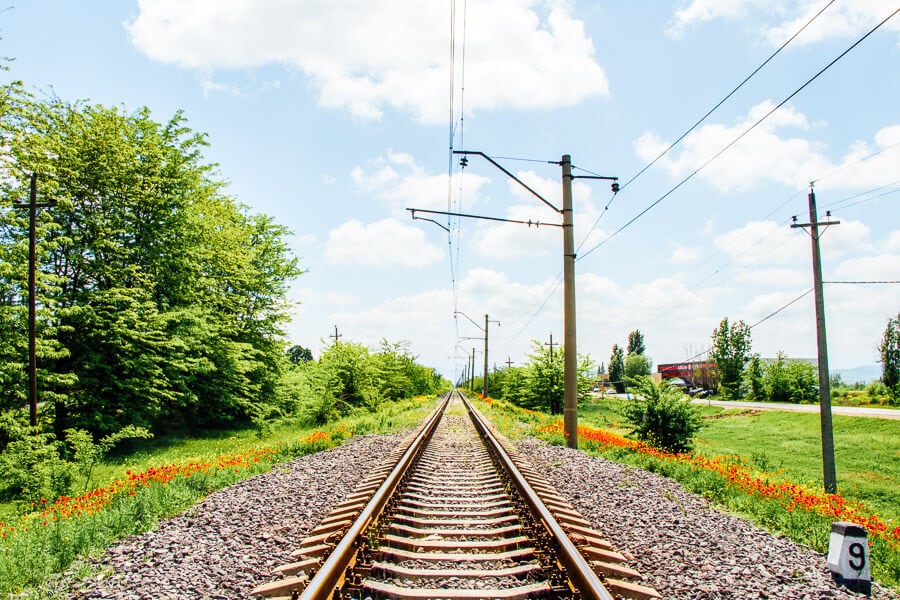
Everything You Need to Know About the Baku Tbilisi Kars Railway
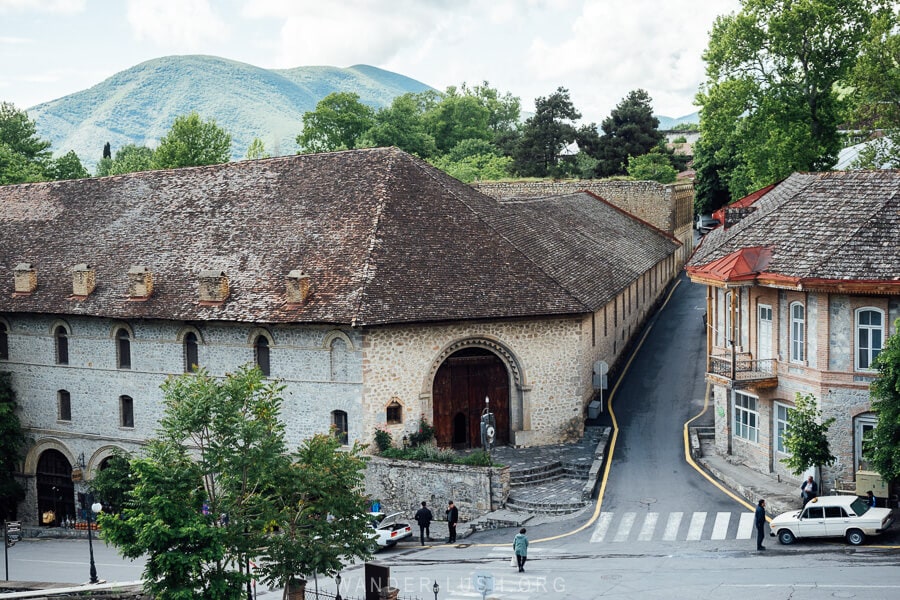
17 Magical Things to Do in Sheki: A Complete Guide to Azerbaijan’s Silk Road City

10 Tips for Visiting the Sheki Khan’s Palace, Azerbaijan’s Jewel
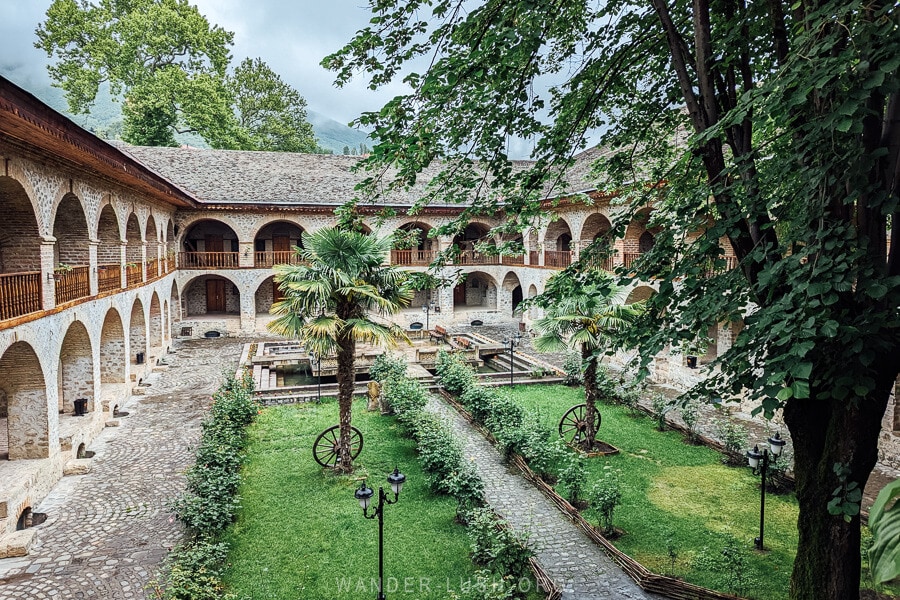
Sleeping in a Silk Road Caravanserai: How to Stay at the Incredible Sheki Karvansaray Hotel in Azerbaijan

How to Travel from Baku to Sheki in 2024 (& Where to Stop Along the Way)
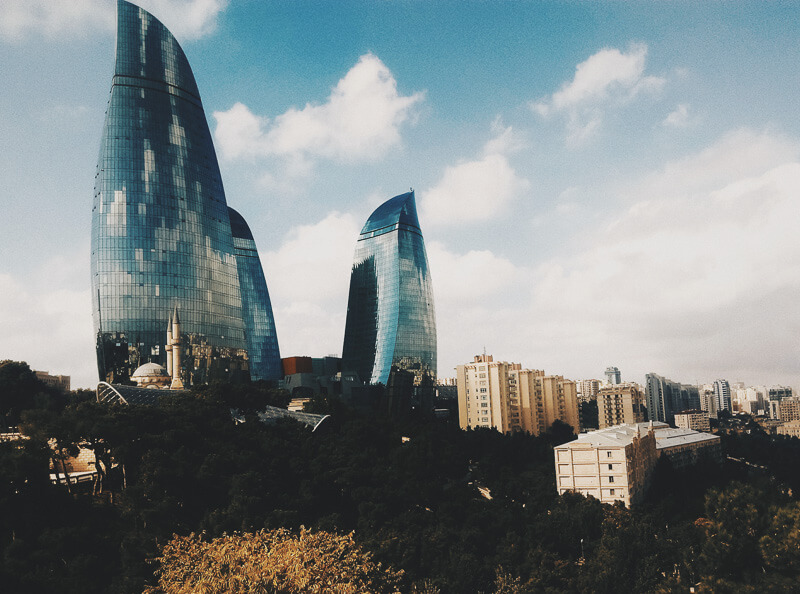
How to Travel from Tbilisi, Georgia to Baku, Azerbaijan by Overnight Train
My azerbaijan favourites.
Xinaliq to Qalayxudat, north-eastern Azerbaijan.
Must-eat meal
Piti (aromatic meat stew served with bread).
local experience
Sip chai in a local teashop in Baku.
best souvenir
A Kelagayi silk scarf printed with buta motifs.
We’re sorry, this site is currently experiencing technical difficulties. Please try again in a few moments. Exception: request blocked
Nomadic Matt's Travel Site
Travel Better, Cheaper, Longer
Azerbaijan Travel Guide
Last Updated: February 26, 2024
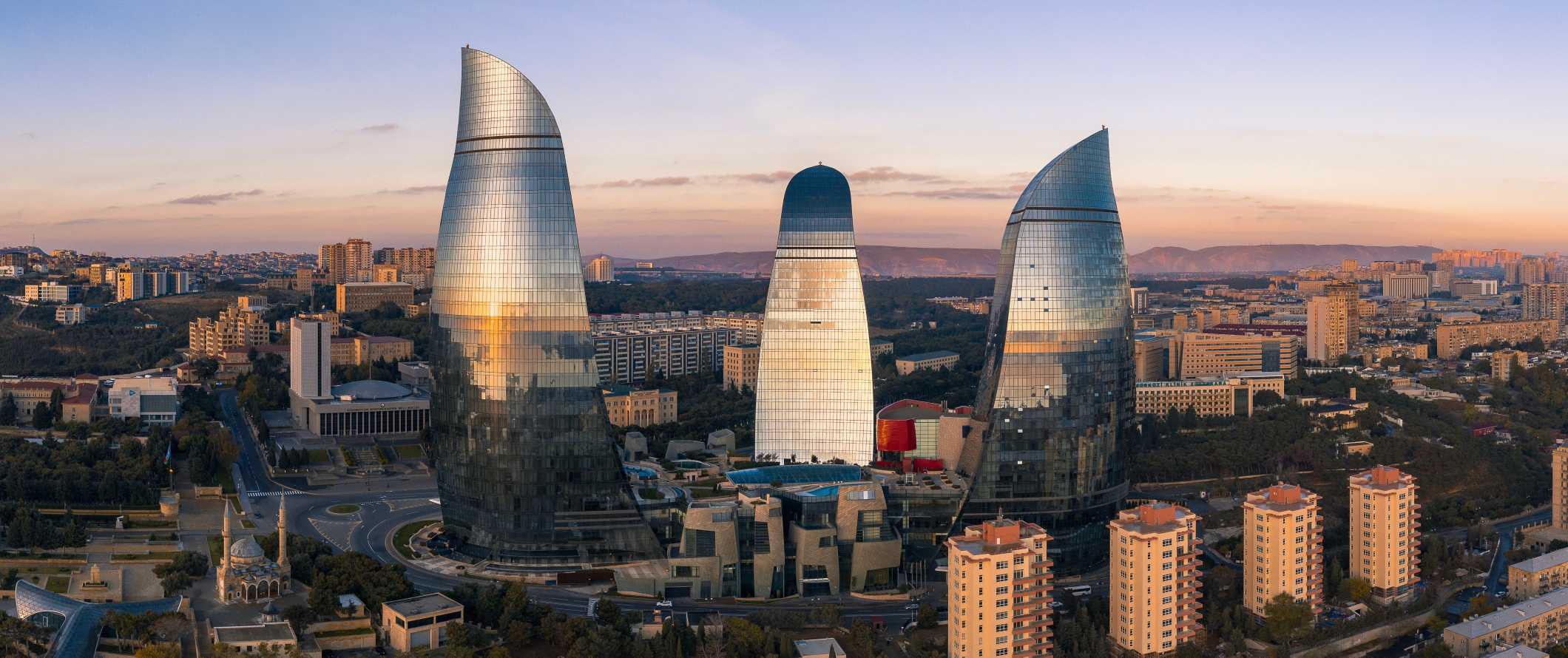
Dubbed “the land of fire,” Azerbaijan is a former Soviet republic famous for its high-tech capital city of Baku, the Great Caucasus mountains, and strange fire phenomenon of Fire Mountain (hence the country’s nickname).
I knew two things about Azerbaijan before I visited: it won the Eurovision Song Contest in 2011 and it has a lot of oil money.
Though a very rural and quiet country, when I backpacked around Azerbaijan, I found it to be one of those “undiscovered gems” that too many people skip — especially if you want to get out and hike without crowds!
Azerbaijan is an amazing, wonderful, beautiful, and friendly place. The country became the world’s first secular democratic Muslim-majority state when it first declared independence in 1918. Today, Baku, the capital, is a modern city steeped in oil money with a recently built subway, fast Wi-Fi, and tons of Parisian-style buildings (in the 1900s, newly rich oil barons modeled the city after Paris) as well as towering and futuristic steel and glass buildings.
The rest of the country is incredibly rural with small towns surrounded by gorgeous mountains and farmland. In tiny villages, old men with canes sat in town squares gazing at passersby’s like out of some movie. Locals, who don’t see many visitors, are very welcoming.
From things to do, costs, ways to stay safe, save money, how to get around, and more, this travel guide to Azerbaijan will help you plan your trip and ensure you make the most of your time in the off-the-beaten-path destination!
Table of Contents
- Things to See and Do
- Typical Costs
- Suggested Budget
- Money-Saving Tips
- Where to Stay
- How to Get Around
- How to Stay Safe
- Best Places to Book Your Trip
- Related Blogs on Azerbaijan
Top 5 Things to See and Do in Azerbaijan
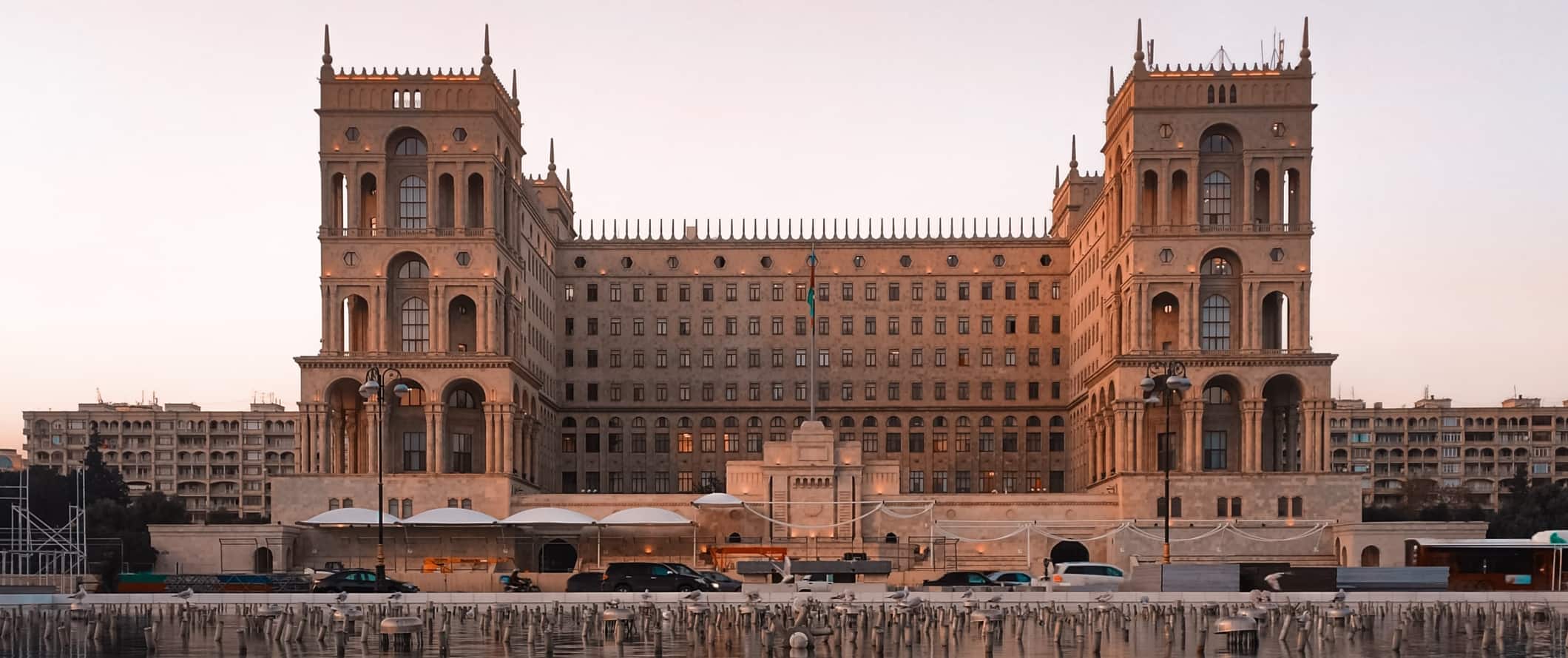
1. Explore Baku
Baku, the capital city of Azerbaijan, lies along the Caspian Sea and is a somewhat curious mix of old walled city and modern skyscrapers. It’s a cool small city that only needs a day or two. There’s good food, interesting museums, and amazing wine bars. The Old Town, called Icherisheher, is a maze of cobblestone streets where you’ll find museums, art galleries, mosques, and two landmarks—Maiden Tower and Shirvanshahs’ Palace. Restaurants and rooftop bars have great views over the waterfront, where you can stroll on Baku Boulevard and take a ride on the Baku Eye Ferris wheel. Architecture buffs won’t want to miss the Zara Hadid-designed Heydar Aliyev Centre, a museum focused on Azerbaijani art and culture; and the Carpet Museum, in a clever building shaped like a rolled-up carpet. The most prominent examples of modern architecture are the three iconic Flame towers—LED-covered skyscrapers that curve at the top.
2. Visit Sheki
The city of Sheki was a famous stop on the Silk Road, and the large old caravanserai (inn with a courtyard) dating to the early 18th century still stands today. Built like a castle to protect merchants (high walls, one gate), you can stay there today for around 50 AZN per night. Silk is still produced in the well-preserved historic town center where you can also see craftsmen at work. The city is known for its colored glass mosaics called shebeke, which are set in wooden lattice framework without glue or nails. With a facade covered in shebeke, Sheki Khan’s Palace is worth a visit to see the intricately patterned frescoes, ceramics, and other ornate decorations in this former summer palace.
3. Go to Lahij
Lahij is beautiful, with cobblestone streets and stellar views of the valley. A tiny, remote town, Lahij’s mountainous location makes it a popular summer destination for people looking to escape the heat of lower elevations. Known for coppersmithing, Lahij artisans have perfected the art of handcrafting and engraving plates, cookware, water vessels, and other items. Other handmade items from tin and leather are sold in shops where you can often see two or three generations at work. There a lot of hiking trails and activities around that you can do too. You’ll find some castle ruins on the trail leading up from the nearby river and waterfall but be warned: it’s a steep 6 kilometers (3.7 miles) up and the ruins (really just a wall) are easily missed.
4. See the Gobustan Petroglyph Reserve
The UNESCO-listed Gobustan Petroglyph Reserve is home to 6,000 rock paintings that are up to 40,000 years old. The well-preserved sketches display ancient populations traveling on reed boats, men hunting antelope and wild bulls, and women dancing. Unique to Gobustan is that the petroglyphs date from the Mesolithic Era to the Middle Ages and document life over the centuries. The area, including tombs and caves, has provided archaeological findings like jewelry and weapons that you can see in the Gobustan Museum.
5. Visit Ateshgah
Ateshgah is a temple just outside Baku that has been used as a Hindu, Sikh, and now a Zoroastrian place of worship. Each room has panels detailing the temple’s history and the Zoroastrian religion. In the complex center is a naturally occurring, unquenchable flame representing God that has inspired pilgrims for millennia. Enclosed by stone walls in the shape of a pentagon, the fire altar is in the middle of the courtyard. About 19 miles from Baku, which has long been called the City of Fire, it’s open daily. Admission is 4 AZN.
Other Things to See and Do in Azerbaijan
1. check out the mud volcanoes.
Azerbaijan is home to nearly a third of the world’s mud volcanoes, which form when pockets of underground gas force their way to the surface. They’re like geysers, but with mud, and since they’re not made from magma, the mud is pretty cold (just above freezing temperature). Of the country’s 700 mud volcanoes, 350 are active and range from little bubbling pools to entire islands like Dashli that were formed by mud eruptions and also have mud volcanoes. The ones at Gobustan National Park are the most popular to visit from Baku on a day tour (it’s possible to take a bus to the park’s entrance but finding the volcanoes isn’t easy). Half-day tours start from about 60 AZN.
2. Tour the Sheki Khan’s Palace
The Sheki Khan’s Palace was built in 1797 and was once the summer residence for the Khans. It is one of the most ornate and iconic buildings in the South Caucasus. Its shebeke windows (incredibly delicate stained glass with geometric patterns made specifically by Azerbaijan masters) cast brilliant rays of colored light across the entire interior. The palace opens daily from 10am-6pm and costs 2 AZN or 5 AZN with a guide.
3. See the Palace of the Shirvanshahs
Within Baku’s walled Inner City is the 54-acre limestone Palace of the Shirvanshahs. Surrounded by walls and topped by domes, the sprawling palace complex was built in the 15th century and includes a mosque with a 16-meter (52 foot) minaret, bathhouse, mausoleum, ancient bathhouse ruins, and an octagon-shaped tomb known as the “Dervish’s Tomb.” The complex features grand gates adorned with intricately carved arabesques, doorways covered in Arabic scripture, magnificent domes, and courtyards with octagonal reflecting pools. Inside, there are displays of traditional artifacts such as clothing, jewelry, ancient texts, weaponry, and more. The famous 12th-century Maiden Tower, an iconic Azerbaijani monument with Arabic, Persian and Ottoman influences, is here too. Standing at over 29.5 meters (97 feet), it offers panoramic views of the city from the top. (Fun fact: They still have no idea what this tower was built for, though over 20 legends attempt to explain its purpose.) The Palace is open daily from 10am until 6pm and admission is 2 AZN or 6 AZN for a guided tour.
4. Relax on the beaches of the Absheron
During the summer, the residents of Baku migrate to their country houses (known as dachas ) on the Absheron Peninsula to escape the city heat. In recent years, thanks to the resorts popping up along the coast, tourists are following suit. The public beaches at Mardakan or Buzovna are two popular choices for sunbathing and swimming in the warm waters of the Caspian Sea.Restaurants specialize in fish, and you can rent an umbrella or tent and purchase refreshments like tea and watermelon from beach vendors.
5. Go hiking in the Guba region
The Guba or Quba region, located 2 hours north of Baku, is a remote region famous for its traditional villages, rolling apple orchards, and mountainous landscapes perfect for lots of hiking. Tenghi Canyon is popular to visit, as is Khinalig, a major Zoroastrian center. Krasnaya Sloboda, the only all-Jewish town outside of Israel, is populated by the Juhuro, or Mountain Jews. Although you can travel here and hike independently, many companies offer organized day tours of the region, for around 53-115 AZN.
6. Hit the slopes
Azerbaijan may not be known internationally for its skiing, but it does have two winter resorts that offer an “off-the-beaten-path” winter experience: Shahdag Mountain Resort and Tufandag Mountain Resort. The ski season is very short, lasting just two months from mid-December to late February. A ski day pass costs about 25-35 AZN. Ski lessons cost around 40 AZN per lesson. Shahdag offers an Alpine Coaster thrill ride and snowshoeing while Tufandog’s observation deck that juts out over a cliff and its 22- and 65-foot swings attract Instagrammers with no fear of heights year round.
7. Go to Quba
Head north by bus to the mountain town of Quba for a cooler climate, old mosques, and traditional carpet weaving in beautiful alpine surroundings. Home to less than 40,000 people, there are dramatic panoramic views everywhere you turn, with pastel-colored houses and red-tiled roofs standing out against the lush verdant mountains. Nestled on the slopes of Shahdag mountain on a flowing river, Quba remains similar to 19th-century Azerbaijan. While you’re here, make sure to visit the Quba Genocide Memorial Complex, which is dedicated to the memory of the 12,000 Azerbaijanis who were killed by the Bolsheviks and Armenians during the March Days genocide that took place in 1918.
8. See Qabala
Once strategically located along the middle of the Silk Road, this dusty, old, not-so-small town is named after the nearby Gabala village. The walled town, dating back to the 4th-century, used to be the ancient capital of Caucasian Albania. As such, there are many ancient monuments and archaeological sites here, including a thousand-year-old defense tower, a 4th-century temple, a 13th-century mosque, and a mausoleum. The area is also home to wonderful hiking trails, beautiful waterfalls, dense woodlands, lakes, and one of the best ski resorts in the country. Take an early bus from Sheki and spend the night here. All the attractions are close together so you can easily see the town in a day.
9. Hang out in Ganja
Azerbaijan’s third-biggest city dates to the 6th century and features many attractions, historical sites, and parks. Main attractions include the 18th-century Shah Abbas Caravanserai (similar to the one in Sheki), traditional mosques and churches from the 14th-19th centuries, the domed, red-bricked 17th-century Chokak Hamam, the 19th-century Khan Gardens, and the Tomb of Nizami Ganjavi, the country’s most famous 12th-century poet (he’s kind of a national hero). The most important museum here is the Ganja State History-Ethnography Museum where you can learn the history of the region from ancient to modern times through its displays of over 30,000 artifacts and objects. For a quirkier thing to see, visit the Bottle House, a private residence built in the 1960s and covered in over 48,000 glass bottles.
10. Visit Lankaran
This sleepy resort town on the Caspian Sea is home to the Old Prison and Lighthouse (Stalin was a prisoner here for a while), an ancient bazaar, an 18th-century fortress, and a 19th-century mosque. You can spend a good day sightseeing here and then another on the beaches further south in Kenaramesha. If you have more time, take a day trip to the Ghizil-Agaj State Reserve, which is home to some 250 bird species.
11. Skip Yanar Dag (aka the “Fire Mountain”)
Yanar Dag (Fire Mountain or Burning Mountain) is a natural gas fire that blazes continuously on a hillside just outside Baku. Marco Polo once described the land in this area as being on fire because of phenomena like this, but this is one of the only fires left in the region. It’s small, so I wouldn’t make the journey specifically to see this, but it’s included in most tours of the region anyway.
Azerbaijan Travel Costs
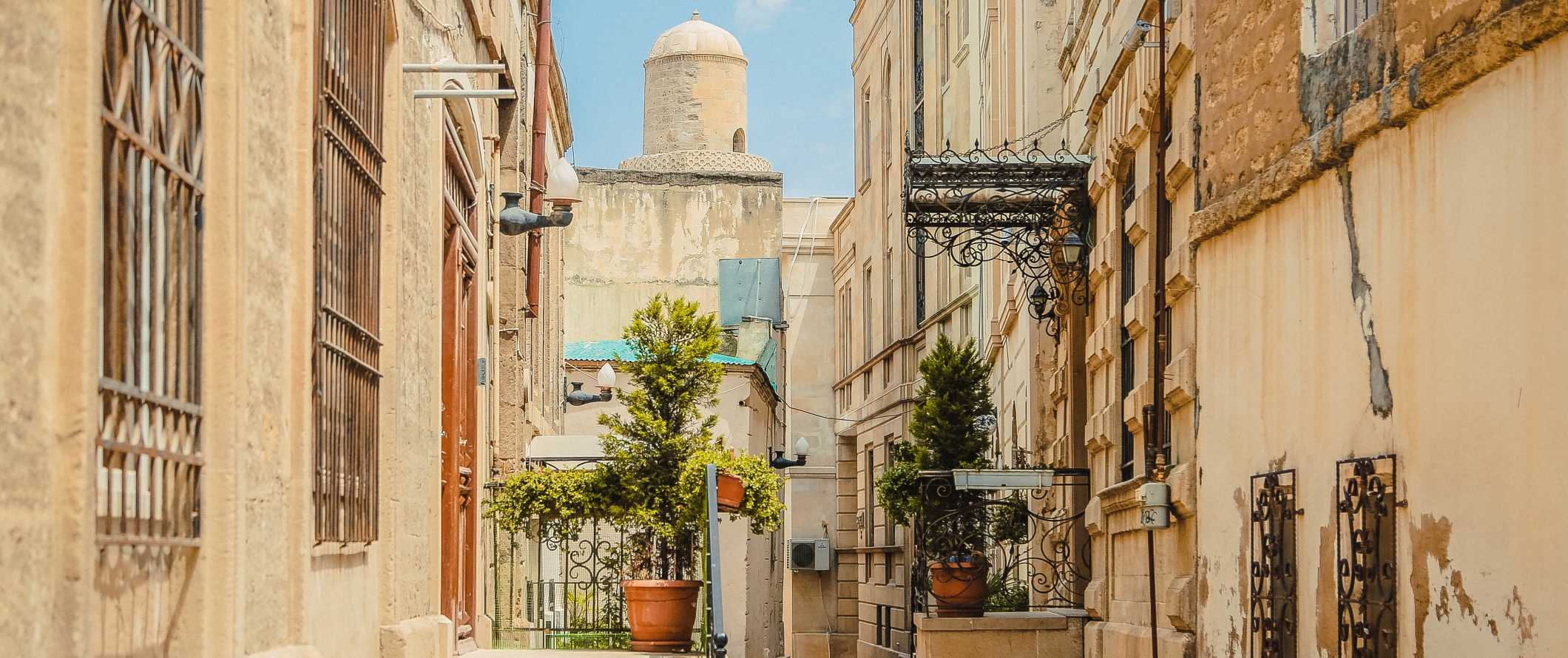
Accommodation – There are only a handful of hostel options in Azerbaijan. A bed in a 4-6-bed dorm costs around 26-32 AZN per night in Baku and 10-20 AZN anywhere else. Prices in Baku are generally higher than elsewhere around the country.
A private room in a hostel is around 40-80 AZN per night. Most hostels have self-catering facilities, Wi-Fi, and free breakfast.
Budget hotels and guesthouses are much more common in the country. These cost around 60-85 AZN per night for a double room that includes breakfast.
Airbnb is available in Azerbaijan, with private rooms starting around 25 AZN per night while entire homes and apartments cost at least 80 AZN per night.
Wild camping is legal in Azerbaijan so feel free to pitch your tent anywhere, apart from a few national parks where it is forbidden (including Shirvan, Ag Gol or Absheron National Park). If you prefer to stay at a campsite with amenities, there are some campgrounds scattered around. You won’t find any online booking though, so keep your eyes peeled for signs when you get to a new place.
Food – Azerbaijani cuisine is a blend of Mediterranean and Middle Eastern flavors and is usually heavily spiced, aromatic, and vegetable-rich. Many traditional cooking methods (such as using copper or clay cookware) are still in use today. For meat, mutton, lamb, and sturgeon are the most comm, while vegetables widely used include eggplant, cucumber, red pepper, and tomato.
Dining out is very affordable in Azerbaijan. Street food like döner kebabs cost 2-3.50 AZN. Fast food like McDonald’s costs about 9 AZN for a combo meal while a whole pizza is 7.50-11 AZN.
A meal at a restaurant serving traditional cuisine is around 7-11 AZN. Look for traditional meals like plov, or pilaf, which uses saffron-flavored rice, fried meat, and vegetables. This is usually shared and costs around 10-12 AZN for a large plate. Cold starters, such as hummus or salads, cost 3-7 AZN. Traditional soups, of which there are many varieties, are around 3-5 AZN.
“Western” food is more expensive, with main dishes (such as a burger) costing around 16-18 AZN. Fish or steak dishes are generally around 25-40 AZN. A three-course meal at a higher-end restaurant costs about 50 AZN.
For drinks, you can expect to pay 2-4 AZN for a beer or soda, 6-8 for a glass of wine, and 8-10 AZN for a cocktail. A cappuccino is around 4-5 AZN.
If you are planning to cook your own food, a week’s worth of basic groceries costs 50-70 AZN but since most places don’t have kitchens, you’re better off just buying snacks and grab-and-go meals if you don’t want to eat at a restaurant.
Backpacking Azerbaijan Suggested Budgets
If you are backpacking Azerbaijan, my suggested budget is 85 AZN per day. This covers staying in a hostel dorm, eating street food, cooking some meals, visiting a few attractions like museums and palaces, and using local transportation to get around.
On a mid-range budget of about 175 AZN per day, you can stay in a private hostel room or Airbnb, eat out a lot more, take some guided tours, enjoy a few drinks out, take some taxis, and visit more paid attractions.
On a “luxury’ budget of 375 AZN or more per day, you can stay in hotels, get a rental car, eat out for all your meals, drink as much as you want, and do all the activities and tours you want. This is just the ground floor for luxury though — the sky is the limit!
Use the chart below to get some idea of how much you need to budget daily, depending on your travel style. Keep in mind these are daily averages – some days you’ll spend more, some days you’ll spend less (you might pay less every day). We want to give you a general idea of how to make your budget. Prices are in AZN.
Azerbaijan Travel Guide: Money-Saving Tips
Baku can be kind of expensive but, once you leave the capital, prices drop considerably and it’s easy to see a lot and spend a little. Here are some additional ways to save money when you visit Azerbaijan:
- Take a free walking tour – While in Baku, take a free walking tour to familiarize yourself with the city. I recommend using Baku Free Tour .
- Wild camp – It’s free to wild camp in Azerbaijan, so bring a tent and camp just about anywhere you like!
- Cook your own meals – Some hostels here don’t include kitchen facilities, so if you want to save money, make sure you book accommodation that does. Buying your own groceries may not be as glamorous as going out to eat, but it will save you money!
- Stay with a local – If you plan ahead, you can usually find nice Couchsurfing hosts throughout the country if you look in advance. This way, you not only have a place to stay but you’ll have a local host that can share their insider tips and information!
- Walk everywhere – All of the major towns and cities in Azerbaijan are quite walkable, so skip the public transportation (and the taxis) if you want to save a few extra dollars.
- Enjoy the free spaces – There are plenty of free parks as well as many free hiking trails around the country. Save your budget and enjoy the outdoors!
- Bring a water bottle – The tap water here is generally not safe to drink so bring a reusable water bottle to save money and reduce your plastic use. LifeStraw is my go-to brand as their bottles have built-in filters to ensure your water is always clean and safe.
Where to Stay in Azerbaijan
Azerbaijan had a boom in 4-5-star hotels during the first influx of tourism, but today there are more budget-friendly accommodations available for backpackers. New hostels are popping up all the time, but most of them are still in Baku. Here are some of my favorite places to stay in Azerbaijan:
- Sahil Hostel (Baku)
- Travel Inn Hostel (Baku)
- Hostel Ilgar (Sheki)
How to Get Around Azerbaijan
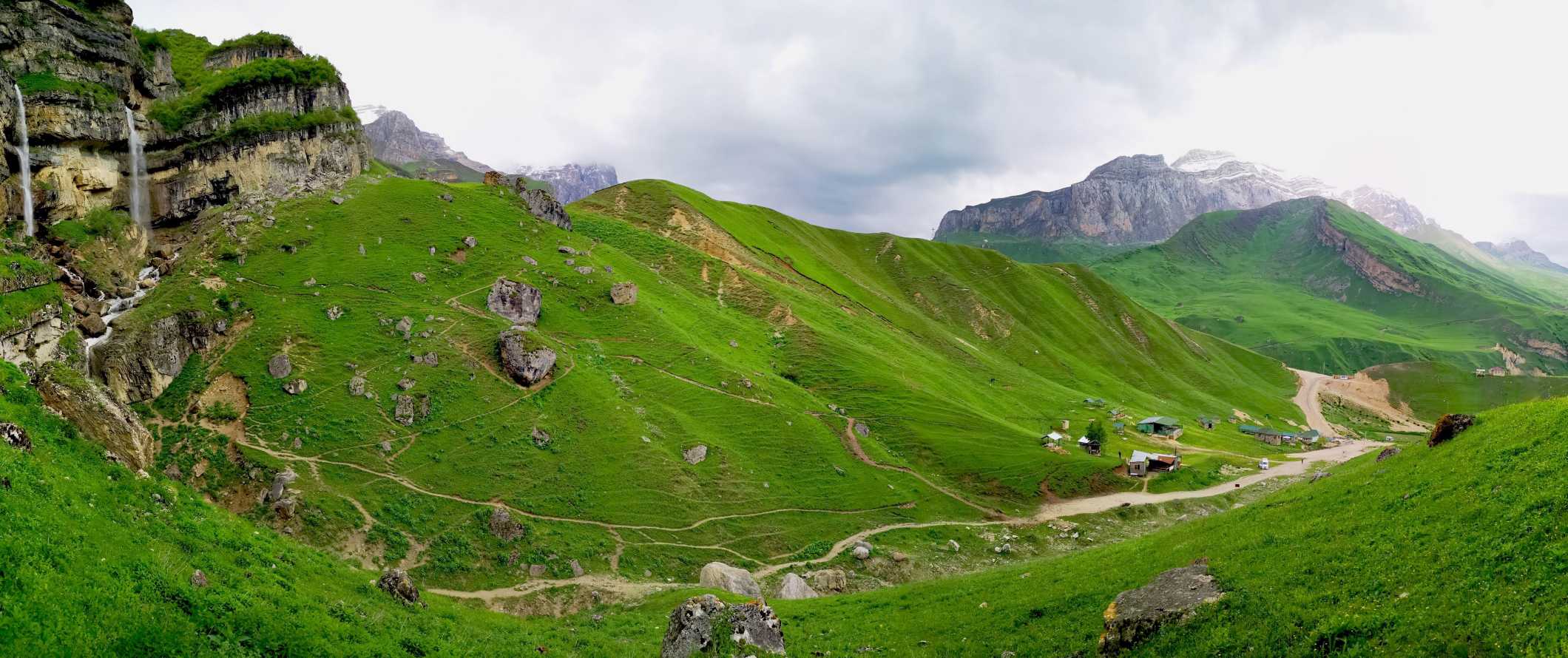
Public Transportation – Public transportation prices vary by city, but expect to pay around 0.20 AZN for a standard ticket for the bus.
Baku has a subway system that costs 0.30 AZN per ride. You need a prepaid smart card, called BakiKart, to access the metro. The card itself costs 2 AZN and you can refill it as much as you like.
If you need to take a taxi, prices start around 1.89 AZN and costs around 0.60 AZN for every kilometer.
Bus – Buses and minibuses (marshrutkas) are the most common options for intercity travel. Marshrutkas are the local favorite for getting around, so you can always find one that goes wherever you need to go. They run on general timetables, but usually just leave whenever they are full. Expect to pay about 2 AZN for an 80-kilometer (50-mile) trip. Going from Baku to Quba is around 160 kilometers (100 miles), takes around 2-3 hours, and costs 5 AZN. You usually pay the bus driver directly, but be sure to check at the stations, especially larger ones.
Trains – Trains in Azerbaijan are a lot slower and less frequent than buses; however, if you’re not in a rush, night trains can be an excellent option to save on a night’s accommodation. Baku connects directly with Tbilisi , Moscow, Rostov, Kiev, Kharkiv ( Ukraine ), Brest ( Belarus ) as well as towns and cities within Azerbaijan. It is possible to travel across Azerbaijan overnight in a reserved sleeping berth for as little as 9 AZN. Booking in advance is advisable during the peak season to ensure you can reserve a bunk.
For detailed information on the trains in Azerbaijan and to book, use TuTu .
Budget Airlines – The main airline that services all major cities in Azerbaijan is Azerbaijan Airlines. However, unless you are pressed for time, I wouldn’t fly. It’s a hassle, expensive, and flights are infrequent.
Car Rental – Car rentals can be as low as 60 AZN per day for a multi-day rental when booked in advance. If you’re driving, make sure to have an International Driving Permit (IDP) as you need one for any car rental.
When to Go to Azerbaijan
The best time to visit Azerbaijan really depends on the activities you want to do. Spring and early summer are the nicest months for hiking and enjoying outdoor activities, with temperatures usually between 10-20°C (50-68°F).
From April to June is when the flowers are in full bloom in the lowlands, and July is a popular month for trekking. It’s still warm during this time, but there aren’t as many crowds. This time of year is especially good for outdoor activities. August can be particularly hot, with temperatures as high as 40°C (104°F).
Temperatures drop below freezing in the winter months, but if you’re here to ski, this is the time to do it. Although Azerbaijan has a large Muslim population, the locals celebrate Christmas with markets and festivals throughout December.
How to Stay Safe in Azerbaijan
Azerbaijan is very safe. I mean like super safe. The country is ruled by one of those “president for life” guys (the current president has been in power since 2003 and is the son of the former president) and in order to increase tourism, has created severe punishments for crimes against tourists. Therefore, you are unlikely to get in trouble because everyone knows the harsh penalties if they get caught. There’s a lot of tourist police around too.
As in any destination, never leave your drink unattended when out at the bar and never walk home alone intoxicated. Solo female travelers should feel safe here, though it’s best to avoid walking around alone at night just to be safe.
When you get out of Baku, the cities and towns are pretty small and everyone knows everyone. People aren’t going to try to scam you. That said, here is a list of common travel scams to keep an eye out for just to be safe.
If you need police assistance, dial 102 for help.
Also, do not try and talk politics here. Because “the president for life” type doesn’t like dissent, a quick way to get in trouble is to talk about politics and criticize the government. Avoid politics to avoid trouble.
For more in-depth coverage of how to stay safe in Azerbaijan, check out this post we wrote that answers some frequently asked questions and concerns.
Always trust your gut instinct. Make copies of your personal documents, including your passport and ID. Forward your itinerary along to loved ones so they’ll know where you are.
The most important piece of advice I can offer is to purchase good travel insurance. Travel insurance will protect you against illness, injury, theft, and cancellations. It’s comprehensive protection in case anything goes wrong. I never go on a trip without it as I’ve had to use it many times in the past. You can use the widget below to find the policy right for you:
Azerbaijan Travel Guide: The Best Booking Resources
These are my favorite companies to use when I travel. They consistently have the best deals, offer world-class customer service and great value, and overall, are better than their competitors. They are the companies I use the most and are always the starting point in my search for travel deals.
- Skyscanner – Skyscanner is my favorite flight search engine. They search small websites and budget airlines that larger search sites tend to miss. They are hands down the number one place to start.
- Hostelworld – This is the best hostel accommodation site out there with the largest inventory, best search interface, and widest availability.
- Booking.com – The best all around booking site that constantly provides the cheapest and lowest rates. They have the widest selection of budget accommodation. In all my tests, they’ve always had the cheapest rates out of all the booking websites.
- HostelPass – This new card gives you up to 20% off hostels throughout Europe. It’s a great way to save money. They’re constantly adding new hostels too. I’ve always wanted something like this and glad it finallt exists.
- Get Your Guide – Get Your Guide is a huge online marketplace for tours and excursions. They have tons of tour options available in cities all around the world, including everything from cooking classes, walking tours, street art lessons, and more!
- The Man in Seat 61 – This website is the ultimate guide to train travel anywhere in the world. They have the most comprehensive information on routes, times, prices, and train conditions. If you are planning a long train journey or some epic train trip, consult this site.
- Rome2Rio – This website allows you to see how to get from point A to point B the best and cheapest way possible. It will give you all the bus, train, plane, or boat routes that can get you there as well as how much they cost.
- FlixBus – Flixbus has routes between 20 European countries with prices starting as low 5 EUR! Their buses include WiFi, electrical outlets, a free checked bag.
- SafetyWing – Safety Wing offers convenient and affordable plans tailored to digital nomads and long-term travelers. They have cheap monthly plans, great customer service, and an easy-to-use claims process that makes it perfect for those on the road.
- LifeStraw – My go-to company for reusable water bottles with built-in filters so you can ensure your drinking water is always clean and safe.
- Unbound Merino – They make lightweight, durable, easy-to-clean travel clothing.
- Top Travel Credit Cards – Points are the best way to cut down travel expenses. Here’s my favorite point earning credit cards so you can get free travel!
Azerbaijan Travel Guide: Related Articles
Want more info? Check out all the articles I’ve written on backpacking/traveling Azerbaijan and continue planning your trip:
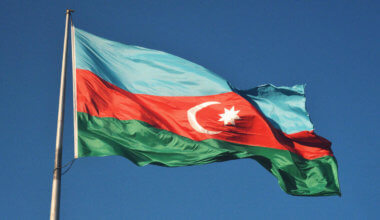
Is Azerbaijan Safe to Visit?
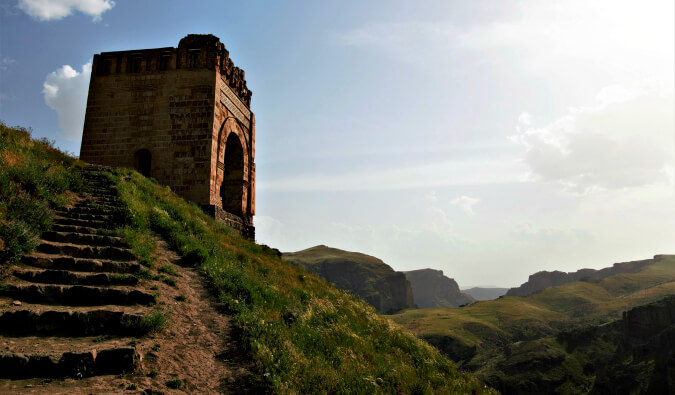
Azerbaijan Itinerary: 1 & 2-Week Routes for First-Time Visitors
Get my best stuff sent straight to you, pin it on pinterest.
- Where To Stay
- Transportation
- Booking Resources
- Related Blogs

Azerbaijan Travel Advice – Everything You Need to Know

- Gepostet am 1. April 2021
- last updated 5. August 2022
- , in: Azerbaijan
Table of content
Azerbaijan is a very diverse country: millennia-old cities, deserted mountain landscapes, restored fire temples, impressive UNESCO World Heritage sites, magnificent Khan palaces, peculiar mud volcanoes, iridescent petroglyphs, and a capital that has both: history and future. It’s not easy to find practical information to help you plan your trip. I’ve been traveling to the mysterious country in the South Caucasus off and on for six years and would like to share with you my very own Azerbaijan travel advice, so that your vacation is guaranteed to be a success!
Azerbaijan Travel Advice – Top Tips
Baku is not called the “City of Beating Winds” for nothing. In the semi-desert city, the desert sand sweeps through the streets now and then. In a country like Azerbaijan, which has nine of eleven existing climate zones, the regional climatic conditions can vary greatly. Therefore, in our tips on travelling to Azerbaijan, we also start with the climate, travel time and weather.
Weather, climate and travel time
Each region has its climatic peculiarities, but the country knows little rainfall. Along the coast the climate is relatively mild all year round. It is more rainy in the warm and humid south around Lənkəran. In the exclave of Naxçıvan, the thermometer can drop to minus 25 degrees in winter and climb to plus 40 degrees in summer. Gəncə and Şəki are two of the coldest regions in Azerbaijan, with an average daily maximum temperature of only 20 degrees.
Touristically interesting are the months of June, August and September. The best time to travel to Lahic with its steppe climate is from May to September. It is not uncommon for the temperature to reach 30 degrees in July. In 2013 the first ski resorts were opened in the Greater and Lesser Caucasus (in Qəbələ and in Qusar). The ideal time to visit Azerbaijan is April to June, before the summer heat sets in with an average of 26–33 degrees and the summer vacations begin. Since Azerbaijanis travel a lot in their own country, it gets crowded everywhere. During the summer months, the water temperature of the Caspian Sea is 21 degrees or more.
The climate at Abşeron and in Baku
The Abşeron Peninsula has a steppe climate. There is a lot of sun, little precipitation, but now and then very strong winds. Baku is not called the “City of Winds” for nothing. On such days, visibility does not clear up because sand from the desert is blown into the city with the wind. The Azerbaijani capital counts an average of 284 sunny days per year and only one or two rainy days per month. From October to March there are rarely more than six rainy days.
Daytime highs are 25 to 30 degrees from June to September, or 35 degrees in recent summers, 5 to 10 degrees from December to March, and something in between in other months. Nighttime lows are 19 to 23 degrees from June to September, 1 to 5 degrees from December to March, and 8 to 15 degrees in other months. In winter, temperatures can drop below freezing, but only at night. Ice and snow are rare, but possible in December, January, February and March.
When to travel to Baku?
The objectively best months with good weather guarantee are May to October. In April, the (European) trees in Baku start to blossom, and there is wonderful photographic weather. From June to August, however, it gets very hot, but stays dry. You should definitely look for a hotel with air conditioning. September and October are ideal months, even if the days are already getting shorter. February is the coldest month of the year. In winter it is dark early and often overcast, but November can still be very beautiful.
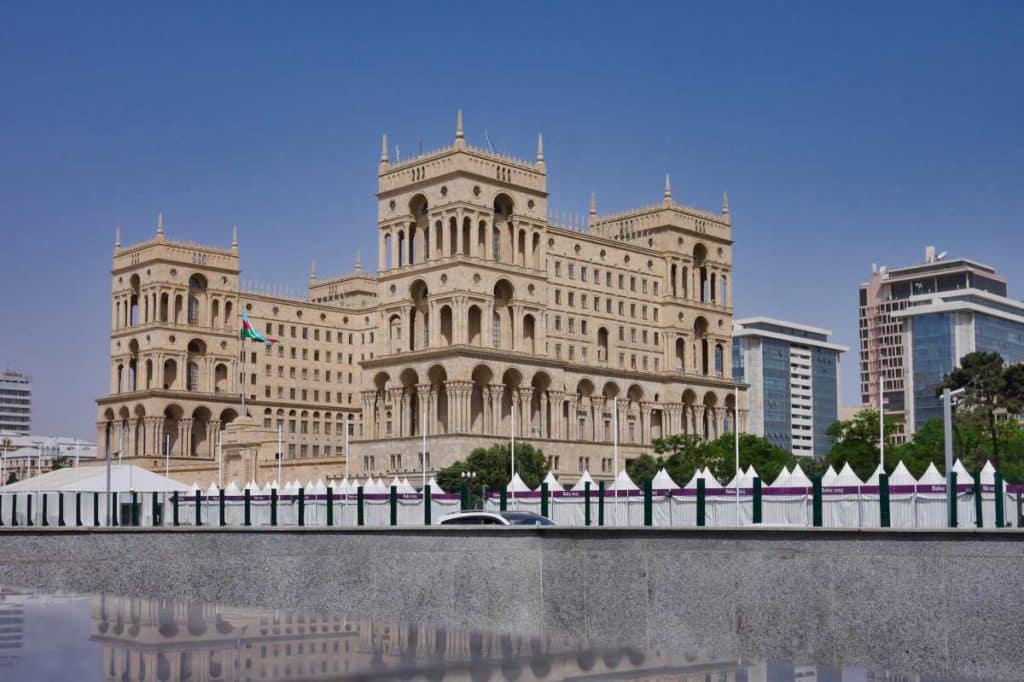
Aserbaidschan Sehenswürdigkeiten
A country as diverse as Azerbaijan offers numerous unforgettable destinations. But some of them are more for connoisseurs. We have summarized more on this page about Azerbaijan . In any case, the following places in Azerbaijan are must-sees:
- Baku – The Azerbaijani capital is a feast for architecture fans. In addition to oriental buildings such as the Şirvanşah Palace, the Maiden’s Tower and the Juma Mosque, Art Nouveau villas, neo-Gothic palaces, magnificent Soviet buildings and modern glass palaces such as the three Flame Towers will surprise you.
- Heydər Əliyev Center – Zaha Hadid designed this spectacular exhibition center in Baku, where the permanent exhibition “Mini Azerbaijan” with miniature buildings from all over the country on a scale of 1:33 is particularly worth seeing.
- The Fire Temple of Suraxanı – On the Abşeron Peninsula there is not only a Zoroastrian fire temple, but also a natural gas fire called Yanar Dağ burning since ancient times.
- Qobustan – In the Qobustan National Park there are 6000 year old rock paintings, which are not for nothing a UNESCO World Heritage Site. You should also pay a visit to the bubbling mud volcanoes in the area.
- Şəki – The 2000-year-old Silk Road town of Şəki boasts the UNESCO-protected Khan Palace and three mystical caravanserais. One of them has been converted into a hotel.
- Gəncə – The second largest city in Azerbaijan was once an important trade center. It is an excellent starting point for a trip to the former German settlements of Göygöl, Tovus, Şəmkir and Çınarlı. In Kedabag you can follow in the footsteps of the Siemens brothers.
- Lahic – The enchanted mountain village of Lahic lies at an altitude of almost 1400 meters and is surrounded by castle ruins and waterfalls – a wonderful hiking area.
- Lənkəran – Nature lovers will find national parks with hiking trails, lagoons with flamingos, untouched steppe landscapes and real primeval forest in the subtropical climate on the Caspian Sea.
- Naxçıvan – The breathtakingly beautiful, mountainous enclave is an almost unknown eco-paradise. Between Ararat and Ordubad lie the “Machu Picchu” of Eurasia, the Tomb of Noah and the oldest salt mine in the world.
- Nabran – Here, in the most popular seaside resort of the Abşeron Peninsula, a beautiful sandy beach merges with untouched forests. Eco-tourism is coming, hiking is already possible.
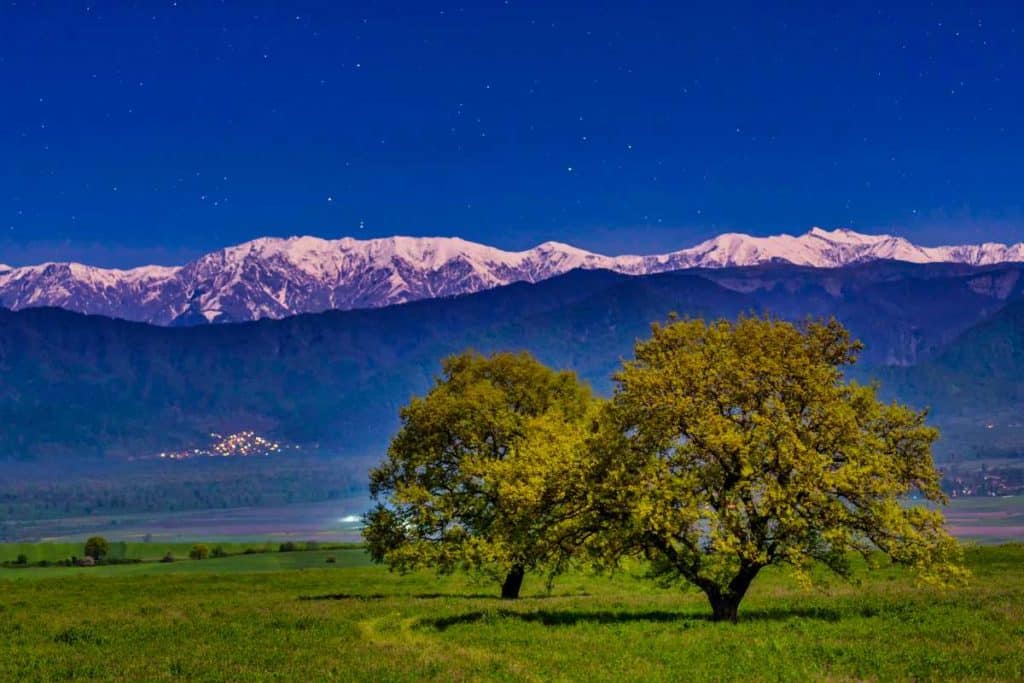
What else there is to see
The places just described represent a top 10 for a trip to Azerbaijan. However, there are many other exciting places that many tourists may not yet have on the screen:
- Şıxov Beach – The James Bond film “The World Is Not Enough” was filmed at the gates of Baku. You can even swim to the discarded oil platform.
- Zaqatala – 40 kilometers from Zaqatala the largest waterfall in Azerbaijan is located. The steep descent into the rocky gorge is a must for adventurers.
- Qəbələ – Around this small town on the Great Caucasus, 150 kilometers from the Iranian border, a world-class ski area is developing, with beautiful resorts and cable cars.
- Naftalan – Wellness lovers will find something entirely new here: lukewarm petroleum baths in the renovated Chinar Sanatorium.
- Sumqayıt – 30 kilometers outside Baku, the “donkeys”, the oil production pumps, can still be seen in action. 14 kilometers to the northwest are the red-and-white striped Candy Mountains, one of Azerbaijan’s iconic landscapes.
Entering Azerbaijan
For travelers from most Western countries a passport valid for 3 months after departure is sufficient. Some temporary passports are also accepted.
Everyone who wants to travel to Azerbaijan needs a visa (E-visa). Tourist visas are valid for 30 days and easy to get online. A copy of the passport must be scanned and paid for by credit card. After three days at the latest, you will receive the visa as a PDF (without photo) and print it out. It must be presented upon entry. An extension of the visa is possible at the Ministry of Foreign Affairs in Baku.
Registration
International visitors must register with the State Migration Service within 72 hours of arrival if they intend to stay in the country for more than 15 days. Those staying with friends or acquaintances must register themselves. Hotels usually take care of this service.
Azerbaijan Arrival – How to get to Azerbaijan
To start your Azerbaijan trip, logically, you must first come to Azerbaijan. Here we will show you what travel options are available.
The safe and comfortable Azerbaijan Airlines (AZAL), which has been operating since 1992, takes you directly to Baku. Ukraine International Airlines offers flights from several Western cities to Baku (with a stop in Kiev).
Travelling inside Azerbaijan
Driving a cab is still very cheap in Azerbaijan and the best choice for a day trip from Baku. However, if you want to make a round trip or drive inland, it makes sense to take a rental car, preferably with four-wheel drive. The road system is surprisingly good, but speed traps lurk at every corner. In any case, there are plenty of gas stations!
In recent years, airports have also been built in smaller cities in Azerbaijan. There are direct connections from Baku to Gəncə and to Naxçıvan.
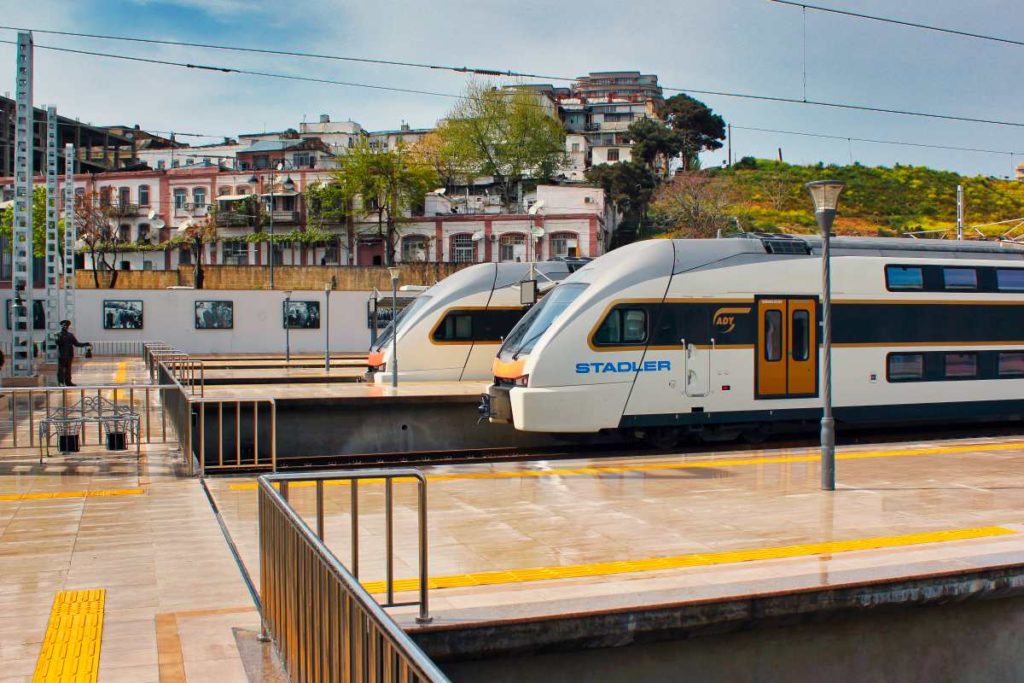

By train or bus
Between Baku and Tbilisi in Georgia, there is a brand new night train that runs through the Caucasus. There are also train connections in the country itself, e.g. from Baku to Gəncə, Şəki and Lənkəran, but the trains usually run only once a day. From the central bus station in Baku, buses go in all directions, also several times a day.
There is a metro only in the capital Baku. Currently, there are two metro lines. The stations and carriages are similar to those in other cities of the former USSR. The metro is fast and cheap, but in the city center there are only two stations from which you can get to the outskirts of the city. The airport is to be connected in the near future.
Cabs operate in all cities. In Baku, there are the aubergine-colored Baklanjan cabs, which are real London cabs. You should not expect to speak foreign languages, but you can get by with Russian.
Azerbaijani food
In Azerbaijan you will surely want to try the local cuisine. This article from Christian Lang , which lists the most important dishes of Azerbaijani cuisine, will help you.
Overnight stay in Azerbaijan
The standard of Azerbaijani hotels has improved significantly in recent years. In Baku there are recommendable hotels in every category. For little money you can even stay in the old town. Reviews on sites like Expedia * are helpful.
Eating and drinking in Azerbaijan
Azerbaijani cuisine has much to offer and has also been influenced over time by the regional cuisines of Iran, Turkey and Georgia. These various influences have been combined with ancient traditions and thus evolved. In our article on Azerbaijani food , we have summarized the most delicious dishes for you. By the way, the drinking water should not be drunk in the whole country.
Azerbaijani belongs to the southwestern Turkic languages and is closely related to Turkish. It sounds relatively foreign to our ears, yet it is useful to learn at least some phrases in Azerbaijani, the people here are very happy when foreigners learn their language!
Russian is also common, so if you speak this language, you will also get ahead in many places. More and more young people speak English as well.
You want to learn more Azerbaijani? Then we recommend you this book.
- Mammadova, Raena (Author)
Azerbaijan is a very safe country. In Baku you see a lot of police in the cityscape. Even in the dark, you can feel safe. The crime rate is even lower than in many European cities of this size. As a visitor, you should always carry your passport and visa. Provocative clothing is not welcome.
Emergency numbers
Should something happen, you can call the emergency numbers. Often someone on the end of the line speaks English:
- Fire Brigade: Tel. 101
- Police: Tel. 102
- Ambulance: Tel. 103
- Lost and Found: Tel. 5909191
- Ministry of Tourism Information Center: Tel. 147
Electricity
The mains voltage is 220 V. With a European plug, you can plug any electrical appliance into one of the type C and F sockets used in Azerbaijan. As far as mains voltage and sockets are concerned, there are no differences compared to Western countries.
In Baku there are English and even German speaking doctors. The hospitals are modern, but often do not meet European standards. Outside Baku, the standard is lower.
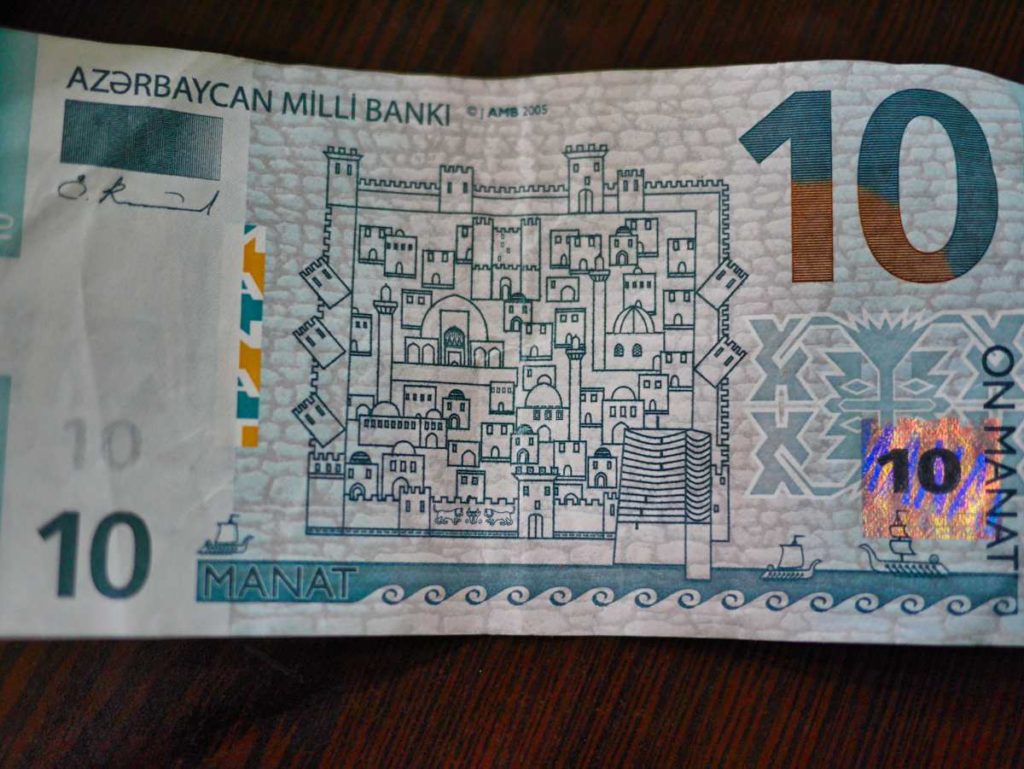
The official currency in Azerbaijan since 1992 is the Azərbaycan Manatı. The Manatı is legal tender and must be accepted everywhere.
Withdrawing money in Azerbaijan
You can find ATMs in almost all cities in Azerbaijan. It is important that when withdrawing and paying you do not select the conversion in euros or dollars, but in the local currency, otherwise it will be expensive. You can use your EC card (Maestro) and/or credit card to withdraw Manat. Credit cards are not always accepted. The most common is the Visa card.
Telephone and Internet
WiFi is available in almost every café, hotel or restaurant in larger cities. However, you will be asked to enter your cell phone number and also click on the flag of the country where the provider is located. A few seconds later you will receive a password via SMS. Normally, you search for the network “Baktelekom”, for example, and open the browser. After entering the SMS password, the WLAN is activated.
Book recommendations
Everything you need to know about Azerbaijan’s troubled past, presented in a nutshell.
- Johenning, Heike Maria (Author)
You want to know more about Azerbaijan’s culture? Than this book is the right choice!
- Heike Maria Johenning (Author)
Classical travel guide, that also covers Armenia and Georgia.
- Holger Kretzschmar (Author)
To prepare your trip, it is best to learn a few words in Azerbaijani. This book is great for beginners!
- John, Constanze (Author)
This compendium should probably contain pretty much all the dishes that exist in Azerbaijani cuisine. Wonderfully designed and over 800 pages strong!
- Said, Kurban (Author)
Portrait of Azerbaijan, presenting the country in all its facets.
What other Azerbaijan travel advice is important to you? Have you been here before? Let us know and write us a comment! And make sure to follow us on Facebook for more articles.
* – this link is an affiliate link. If you buy or order something here, we will receive a small commission. It won’t cost you a cent extra and we can continue to write new articles for you. Thank you for your support!
Heike Maria Johenning
Other interesting articles.
Has anything changed in the information? Do you have any tips or questions? We look forward to your comment!
Share this post
Für Echte Fans
Unser wöchentlicher newsletter für echte osteuropafans, for real fans, our weekly newsletter for real eastern europe fans.
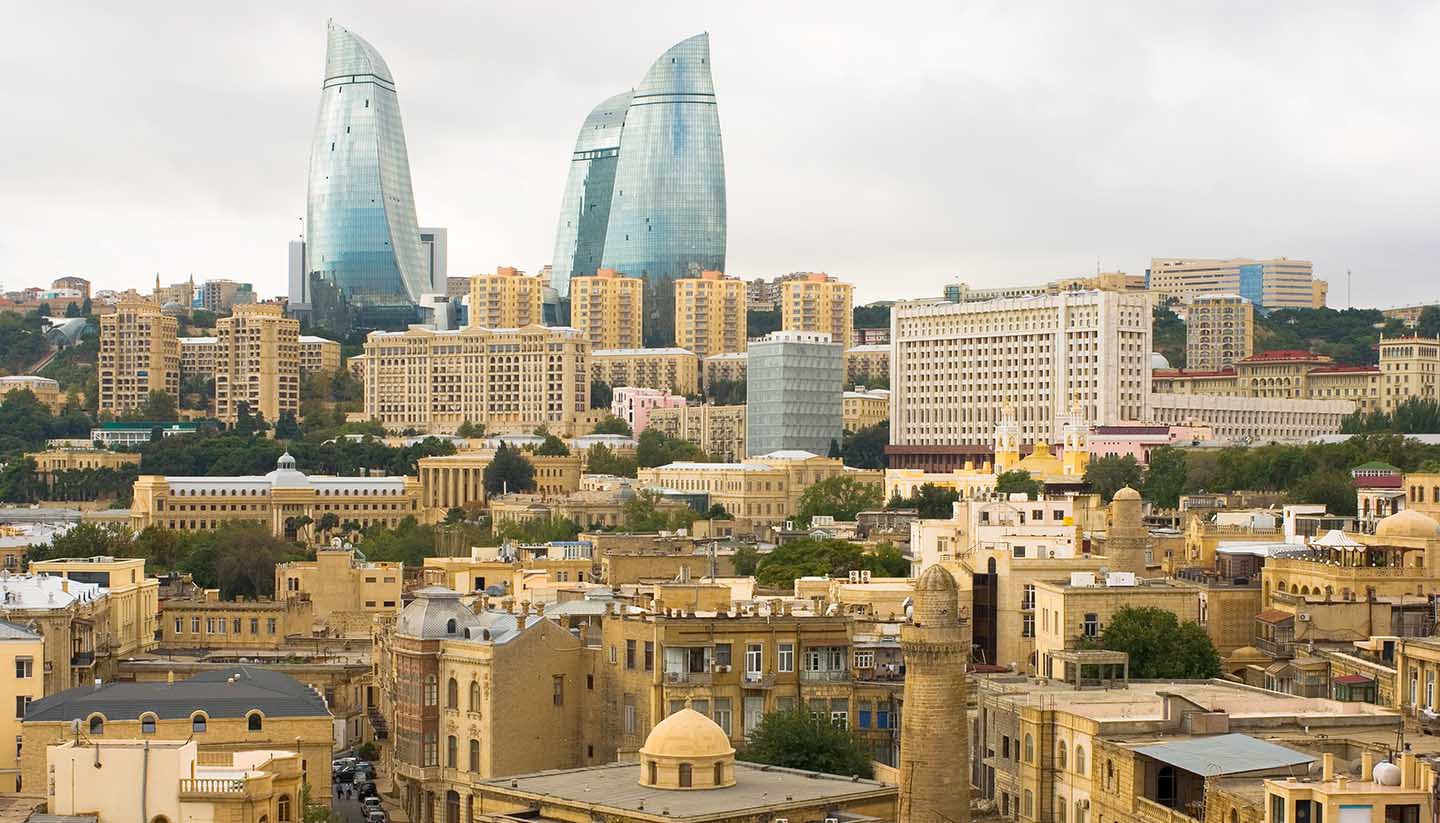
Introducing Azerbaijan
About azerbaijan.
- Images of Azerbaijan
- History, language & culture
- Weather & geography
- Doing business & staying in touch
Plan your trip
- Travel to Azerbaijan
- Where to stay
While you’re there
- Things to see & do
- Shopping & nightlife
- Food & drink
- Getting around
Before you go
- Passport & visa
- Public Holidays
- Money & duty free
Book your flights
- Baku Heydar Aliyev International Airport
Azerbaijan travel guide
The original 'East-meets-West' destination, Azerbaijan sashays between space-age cityscapes and Arabian Nights exotica, taking in some of the most extraordinary landscapes in Caucasia en route.
Sitting at the crossroads between Europe and Asia, this former Soviet Republic is marginally bigger than Ireland, yet boasts an astonishing variety of natural wonders – from snow-capped mountains and bubbling mud volcanoes to sandy deserts and subtropical forests.
The northern hinterland is arguably the prettiest region thanks to the Caucasus Mountains, which rise to the misty heights of 4,466m (14,652ft). These lofty peaks are home to bears, wolves and leopards, not to mention nomadic shepherds, who move their flocks up and down these mountains in search of fresh pastures as they have done for thousands of year.
Meanwhile, along the boulevards of downtown Baku, nouveau riche residents butterfly between expensive boutiques. The capital's exclusive shops, modern architecture and luxury hotels – spoils of Caspian Sea oil – jar somewhat with the UNESCO old town.
Though oil has transformed the economy in recent years, Azerbaijan has always been of strategic importance. Nestling on the shores of the Caspian Sea, the camel caravans of the Silk Road once passed through the land, which, over the centuries, has been incorporated into the Persian, Turkish and Russian empires.
Today Azerbaijan is a sovereign state and, although Islamic, the mood is determinedly secular. Alcohol is not only readily available, but proudly produced. Grapes have been cultivated here for millennia and local vineyards develop some excellent wines. Azeri cuisine is also enjoying a renaissance thanks a profusion of new eateries popping up in downtown Baku.
86,600 sq km (33,400 sq miles).
9,915,179 (UN estimate 2016).
112.9 per sq km.
President Ilham Aliyev since 2003.
Prime Minister Ali Asadov since 2019.
Travel Advice
Your travel insurance could be invalidated if you travel against FCDO advice.
Areas where FCDO advises against travel
Nagorno-karabakh and surrounding areas.
The Foreign, Commonwealth & Development Office ( FCDO ) advises against all travel to:
- Nagorno-Karabakh
- the districts (‘rayons’) of Zengilan, Jabrayil, Qubadli, Lachin and Kelbajar on the Azerbaijan-Armenia border
- western areas of the rayons of Khojavand, Fuzuli and Aghdam
Azerbaijan-Armenia border
The FCDO advises against all travel to within 5km of the border with Armenia.
Find out more about why FCDO advises against travel .
UK government support
Help for British nationals is extremely limited in Nagorno-Karabakh. The British Embassy is not able to give support in person in these areas.
Before you travel
No travel can be guaranteed safe. Read all the advice in this guide and any specific travel advice that applies to you:
- women travellers
- disabled travellers
LGBT+ travellers
- solo and independent travel
- volunteering and adventure travel
Travel insurance
If you choose to travel, research your destinations and get appropriate travel insurance . Insurance should cover your itinerary, planned activities and expenses in an emergency.
About FCDO travel advice
The Foreign, Commonwealth & Development Office ( FCDO ) provides advice about risks of travel to help British nationals make informed decisions. Find out more about FCDO travel advice .
Follow and contact FCDO travel on Twitter , Facebook and Instagram . You can also sign up to get email notifications when this advice is updated.
This advice reflects the UK government’s understanding of current rules for people travelling on a full ‘British citizen’ passport from the UK, for the most common types of travel.
The authorities in Azerbaijan set and enforce entry rules. If you’re not sure how these requirements apply to you, contact the Azerbaijani Embassy in the UK.
COVID-19 rules
There are no COVID-19 testing or vaccination requirements for travellers entering Azerbaijan.
Passport validity requirements
To enter Azerbaijan as a visitor, your passport must usually have an ‘expiry date’ at least 6 months after the date you arrive and at least 2 blank pages for entry stamps. See ‘visa requirements’ for more details.
To enter Azerbaijan as a resident, your passport must have an ‘expiry date’ at least 3 months after the expiry date of your temporary or permanent residence permit.
Check with your travel provider that your passport and other travel documents meet requirements. Renew your passport if you need to.
You will be denied entry if you do not have a valid travel document or try to use a passport that has been reported lost or stolen.
Checks at border control
Anyone who has previously visited areas of Nagorno-Karabakh without the permission of the Azerbaijani authorities could be refused entry to Azerbaijan.
Visa requirements
You must have a visa to visit Azerbaijan.
Applying for a visa
Apply and pay for a visa from the ASAN Visa (e-visa) service . Apply at least 3 days in advance. An urgent 3-hour service is available for an additional fee.
E-visas are normally single entry and allow a 30 day visit within a 90 day period of validity. You must print out the e-visa and bring it with your passport to show on arrival. Officials will check that your passport is valid for 3 months after the visa expiry date. This means your passport must be valid for at least 6 months after the date you arrive in Azerbaijan.
For other types of visa, such as a business visa or a work permit, contact the Azerbaijani Embassy in the UK at least one month before your travel date.
Extending your visa
You can extend your 30 days by applying to the State Migration Service at least 3 days before the end of the permitted stay.
If you overstay your visa without permission, you may have to leave the country within 48 hours. Contact the State Migration Service as soon as possible. They can issue a letter giving you permission to leave. You will have to pay a fine of 300 to 400 Azerbaijani manat. Make sure you get a receipt.
If you are in Azerbaijan, you can also call the Migration Information Centre on 919.
Registering with the authorities
If you’re staying in Azerbaijan for longer than 15 days, you must register with the State Migration Service online or in person. Hotels often provide this service for their guests, but you must do it yourself if you are staying in an apartment or private residence.
Vaccine requirements
For details about medical entry requirements and recommended vaccinations, see TravelHealthPro’s Azerbaijan guide .
Customs rules
There are strict rules about goods you can take into or out of Azerbaijan. You must declare anything that may be prohibited or subject to tax or duty. Follow advice from your airline about items you should declare.
If you are bringing a mobile phone or tablet into the country for the first time, you must complete a declaration online and show it to customs officials on arrival. You will need to give the IMEI number of your mobile, which you can find in settings, or by messaging *#06#
If you plan to use a local SIM card for more than 30 days, you must register it and pay a fee at a local post office. If you do not declare your device or register your sim card, they may not work on local networks and your device could be locked.
Exporting carpets and antiques
You need an export certificate to take antiques or art like carpets, samovars, copperware or paintings out of Azerbaijan. Your vendor will give you a certificate, or they are available from the Azerbaijan National Carpet Museum .
British-Azerbaijani dual nationality
Azerbaijan does not allow people aged 18 or over to hold dual nationality. You may be refused entry, denied departure or even face criminal liability if you’re found to be holding both an Azerbaijani passport and a passport of a different nationality. If you’re a British passport holder with links to Azerbaijan (through birth or otherwise) and wish to check your nationality status, contact the State Migration Service before you travel.
Children aged 17 and under holding a second nationality should not face any difficulties.
This guide also has safety advice for regions of Azerbaijan .
There is a high threat of terrorist attack globally affecting UK interests and British nationals, including from groups and individuals who view the UK and British nationals as targets. Stay aware of your surroundings at all times.
UK Counter Terrorism Policing has information and advice on staying safe abroad and what to do in the event of a terrorist attack. Find out how to reduce your risk from terrorism while abroad .
Terrorism in Azerbaijan
Terrorist attacks in Azerbaijan cannot be ruled out.
Attacks could be indiscriminate and against civilian targets, including places frequented by foreigner nationals, such as international hotels, restaurants, and pubs, as well as energy sector facilities. Be aware of your surroundings.
Political situation
The political situation in Azerbaijan is generally calm, but demonstrations and opposition rallies can occur.
Avoid large gatherings and any demonstrations. They are illegal and there could be a swift response from the authorities. Monitor the media for information about possible demonstrations and be alert to local and regional developments, which may trigger public disturbances. British media representatives should make sure they are clearly identifiable.
Tensions in Nagorno-Karabakh have calmed since 2023. FCDO continues to advise against all travel to Nagorno-Karabakh due to previous military and political action in the area. See Regional risks .
Crime levels in Baku are generally low. Be alert to possible bag-snatching or mugging, particularly if you are carrying large amounts of cash or valuables. The risk is higher after dark in the centre of town. Avoid displaying large sums of money or expensive-looking valuables and do not walk alone at night.
Take extra care to guard against card skimming when paying with a credit card or withdrawing money from ATMs.
Try to arrange to be picked up and dropped off as close to your hotel or apartment entrance as possible by a private or company driver, or use a known taxi firm or ride-hailing app.
You can report a crime at any local police station or by telephoning the police on 102. English-speaking staff are available on the telephone, but when reporting a crime at a police station take someone with you who can interpret. Do not sign any documents unless you understand them.
There are occasionally reports of government officials asking foreign nationals to make undocumented payments. If you think you have been mistreated by a traffic policeman or health professional, report your case to the relevant government department.
Laws and cultural differences
Azerbaijan is a largely secular society, although most of the population is Muslim. Religion is usually considered a private matter.
Personal ID
Police sometimes carry out checks of identity documents. Carry your passport at all times. Keep a copy of the photo page in a safe place.
In Baku local and foreign women usually dress in conservative western-style clothing. It is now more acceptable for men to wear shorts in Baku in the summer months. Outside of Baku it may still be frowned upon and you may receive unwelcome attention.
Ramadan is a holy month for Muslims. The dates vary by year and country. In 2024, Ramadan in Azerbaijan is expected to run from 11 March until 9 April. Get more advice when you arrive from your tour guide, hotel or business contacts.
You should also:
- check opening hours of shops and restaurants
- follow local dress codes – clothing that does not meet local dress codes may cause more offence at this time
- be aware that driving may be erratic, particularly when people are trying to get home at dusk.
- be patient and show tolerance
Illegal drugs and prison sentences
Possession or use of illegal drugs carries severe penalties. The usual penalty for smuggling drugs is a fine and a prison sentence of 3 to 7 years.
Using cameras
Be aware of cultural sensitivities when photographing mosques, churches and other religious sites or sites of commemoration, such as the Alley of Martyrs in Baku. If in doubt, ask for permission.
Military bases, equipment and installations in any condition are considered sensitive areas, and visitors have been detained and questioned while attempting to visit or photograph them.
While same-sex sexual activity is not illegal, LGBT+ people in Azerbaijan tend to keep a low profile. Showing affection in public is frowned upon, especially outside of Baku and among the older generation.
Holding hands or embracing between men is usually a sign of friendship.
Read more advice for LGBT+ travellers .
Transport risks
Road travel.
If you are planning to drive in Azerbaijan, see information on driving abroad and read the RAC guide on driving in Azerbaijan . The guide lists driving regulations and other legal requirements you need to be aware of.
Licences and permits
You’ll need to have both the 1968 version of the international driving permit ( IDP ) and your UK driving licence with you in the car. You cannot buy an IDP outside the UK, so get one before you travel.
After one month, you will need an Azerbaijani driving licence issued through the ASAN Service Offices . You need to carry a green card as proof you’re insured to drive in Azerbaijan.
Right-hand-drive cars are not permitted in Azerbaijan. If you’re planning to hire a car, check with your car hire company for information on their requirements before you travel.
Road conditions
Many vehicles are poorly maintained, and the standard of driving is erratic. Accidents are common, mainly due to poor or reckless driving and inconsistent enforcement of traffic rules. Drivers often ignore one-way signs.
Road closures and diversions are often unmarked. Take care when driving at night as many roads are of poor quality and badly lit. Traffic lights that are flashing amber at night mean cars can proceed with caution in either direction.
Drink-driving is a serious offence in in Azerbaijan. If you are tested and found to have any alcohol in your system, you may get a severe fine and possibly a prison sentence.
In the winter months snowfall often causes problems. Pack your vehicle with a blanket, shovel, torch, snacks and old carpet to help if you get stuck in snow.
Some visitors have reported being severely overcharged by local taxis. When using taxis, agree a fare up front, or make sure the taxi meter is switched on. Check that the taxi has working seatbelts.
Ride-hailing apps such as Uber and Bolt are widely available in Azerbaijan.
Rail travel
If you travel by train, secure your valuables, do not leave the compartment unattended, and lock the door from the inside, if your compartment allows.
Extreme weather and natural disasters
Earthquakes.
There is a risk of earthquakes across the Caucasus region, although there have been no recent serious earthquakes in Azerbaijan. The US Federal Emergency Management Agency website has advice about what to do before, during and after an earthquake .
This section has safety advice for regions of Azerbaijan. It only covers regions where the Foreign, Commonwealth & Development Office ( FCDO ) has specific advice.
You should also read FCDO ’s overall travel advice and safety and security advice .
FCDO advises against all travel to:
Support from the British Embassy is severely limited in areas of Nagorno-Karabakh region.
It is illegal to enter Nagorno-Karabakh without the permission of the Azerbaijani authorities. Anyone who has previously visited areas of Nagorno-Karabakh without the permission of the Azerbaijani authorities could be refused entry to Azerbaijan.
The Nagorno-Karabakh area is the subject of a continuing dispute between Azerbaijan and Armenia. Although a ceasefire was signed on 10 November 2020, tensions remain. On 19 September 2023, there was military action in Nagorno-Karabakh where civilian areas were hit, resulting in deaths and casualties. Further military activity cannot be ruled out.
Several other civilian areas to the east of Nagorno-Karabakh were affected by the conflict and could also contain unexploded weapons and landmines. These areas include, but are not limited to, the towns and rayons of Barda, Tartar, Ganja, Beylagan and Aghjabadi. The Azerbaijani authorities are working to remove unexploded weapons and landmines.
If you come across an unexploded weapon or landmine do not approach it or touch it. Make a note of where you saw it and notify the authorities on 102 or 112. Beware of more unexploded weapons or landmines nearby.
The FCDO also advises against all travel to within 5km of the rest of the border with Armenia.
Borders with Iran and Georgia
The land borders between Iran and Azerbaijan, and Georgia and Azerbaijan are temporarily closed.
Azerbaijan-Russia border
The land border between Azerbaijan and Russia (Dagestan) is closed. The FCDO continues to advise against all travel to Russia. For further details, see FCDO ’s travel advice for Russia .
Before you travel check that:
- your destination can provide the healthcare you may need
- you have appropriate travel insurance for local treatment or unexpected medical evacuation
This is particularly important if you have a health condition or are pregnant.
Emergency medical number
Call 103 and ask for an ambulance.
Contact your insurance company quickly if you’re referred to a medical facility for treatment.
Vaccine recommendations and health risks
At least 8 weeks before your trip:
- check the latest vaccine recommendations for Azerbaijan
- see where to get vaccines and whether you have to pay on the NHS travel vaccinations page
Go to TravelHealthPro to see what health risks you’ll face in Azerbaijan .
Altitude sickness is a risk in some parts of Azerbaijan, including the ski resorts of Shahdag and Tufangdag in the Gusar district, Lake Batabat in Nakhchivan, and the Talysh mountains. Read more about altitude sickness on TravelHealthPro .
The legal status and regulation of some medicines prescribed or bought in the UK can be different in other countries.
Read best practice when travelling with medicines on TravelHealthPro .
The NHS has information on whether you can take your medicine abroad .
Healthcare facilities in Azerbaijan
Medical facilities outside Baku are very limited. Carry a comprehensive first aid kit for any trips out of Baku. Even in Baku, serious illness or injury may require evacuation to Turkey or Western Europe. Make sure you have appropriate travel health insurance.
FCDO has a list of medical providers in Azerbaijan where some staff will speak English.
There is also guidance on healthcare if you’re living in Azerbaijan .
Travel and mental health
Read FCDO guidance on travel and mental health . There is also mental health guidance on TravelHealthPro .
The Foreign, Commonwealth & Development Office ( FCDO ) cannot provide tailored advice for individual trips. Read this travel advice and carry out your own research before deciding whether to travel.
Emergency services in Azerbaijan
Ambulance: 103
Police: 102
Contact your travel provider and insurer
Contact your travel provider and your insurer if you are involved in a serious incident or emergency abroad. They will tell you if they can help and what you need to do.
Refunds and changes to travel
For refunds or changes to travel, contact your travel provider. You may also be able to make a claim through insurance. However, insurers usually require you to talk to your travel provider first.
Find out more about changing or cancelling travel plans , including:
- where to get advice if you are in a dispute with a provider
- how to access previous versions of travel advice to support a claim
Support from FCDO
FCDO has guidance on staying safe and what to do if you need help or support abroad, including:
- finding English-speaking lawyers , funeral directors and translators and interpreters in Azerbaijan
- dealing with a death in Azerbaijan
- being arrested or imprisoned in Azerbaijan
- getting help if you’re a victim of crime
- what to do if you’re in hospital
- if you’re affected by a crisis , such as a terrorist attack
Contacting FCDO
Follow and contact FCDO travel on Twitter , Facebook and Instagram . You can also sign up to get email notifications when this travel advice is updated.
You can also contact FCDO online .
Help abroad in an emergency
If you’re in Azerbaijan and you need emergency help from the UK government, contact the British Embassy in Baku .
FCDO in London
You can call FCDO in London if you need urgent help because something has happened to a friend or relative abroad.
Telephone: 020 7008 5000 (24 hours)
Find out about call charges
Risk information for British companies
The Overseas Business Risk service offers information and advice for British companies operating in Azerbaijan on how to manage political, economic, and business security-related risks.

Book a Hotel
© Columbus Travel Media Ltd. All rights reserved 2024

Azerbaijan Travel

Azerbaijan travel invites you on a journey across the Caucasian leg of the Silk Road, where history and modernity collide across dreamy semi-desert landscapes. Retrace the path of ancient Zoroastrian pilgrims, walk the cobbled streets of artisan villages and examine ancient petroglyphs up close. From ultra-modern skyscrapers to bubbling mud volcanoes and medieval caravanserais, Azerbaijan surprises travelers at every step.
If Azerbaijan has already captured your imagination and you are looking for practical details on how to prepare for your upcoming trip, we invite you to check out our Azerbaijan Travel Tips .
Your Guide to Azerbaijan by a Local Travel Expert
- 1. Is Azerbaijan Worth Visiting?
- 2. Your Dream Vacation
- 3. Azerbaijan Visa Matters
- 4. Is Azerbaijan Safe for Travel?
- 5. Choose Your Transport
- 6. Best Time to Visit Azerbaijan
- 7. Azerbaijan Travel Map
- 8. How Many Days Do You Need in Azerbaijan?
- 9. At Your Service
- 10. Holidays and Festivals
- 11. Curious about Azerbaijani Cuisine?
- 12. Dos and Don’ts in Azerbaijan
- 13. Speak the Language
- 14. Virtual Azerbaijan Travel Guide: Further Reading
- 15. Did You Know That…
Is Azerbaijan Worth Visiting?
- Azerbaijan is full of contrasts , with nine climate zones stretching across the country. Snow-capped Caucasian Mountains border hot, dry deserts while sun-soaked meadows merge with Caspian Sea coasts. But Azerbaijan’s contrasts go beyond nature: cutting-edge architecture straddles caravanserais laden with secrets, while Soviet designs blend with Islamic architecture in a land that never ceases to amaze.
- Azerbaijan is the Land of Fire a nickname it has known since antiquity. It is home to some of the world’s most enviable gas and oil fields, nearly half of the world’s mud volcanoes, Ateshgah Zoroastrian Fire Temple and the natural, eternally burning flames of Yanar Dag (Burning Mountain).
- Azerbaijan is affordable , a land where thrifty travelers can find feasible options for extensive exploration. With delectable yet cheap food and cozy budget hotels and guesthouses, Azerbaijan offers options galore for the economical tourist.
- Azerbaijan blends the best of East and West as it sits at the juxtaposition of numerous civilizations. The old Silk Road atmosphere is still palpable among the merchants who proffer oriental spices in local bazaars, at the cozy tea houses hidden in the shade of glass office buildings and in the medieval Icheri Sheher (Inner City) guarded by forlorn Soviet structures .
Your Dream Vacation
Taste the arid winds of the Caucasian semi-desert, pray in the ancient temple of fire, stroll the corridor of oriental palaces and rest in the shadow of enduring caravanserais. Let Azerbaijan bewitch you with its delicious pilaf, tea served in delicate pear-shaped glasses and bustling bazaars. Craft your tour around the land’s fine-tuned artistic traditions, intricate petroglyphs or bubbling mud volcanoes.
Our Azerbaijan travel packages are as diverse as the clients we serve. Whether you are into history, outdoor adventures or cultural pursuits, chances are we have a tour that perfectly suits your interests. Options include everything from day trips to Azerbaijan’s major sites and attractions to extensive, multi-country expeditions. We are also happy to design a personalized Azerbaijan travel itinerary tailored to your specific needs and passions. Just drop us a message and get one step closer to your dream vacation!
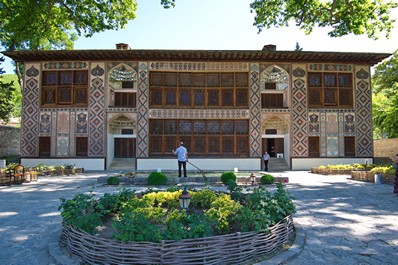
Visa Matters
In recent years, Azerbaijan’s visa policies have gradually become more relaxed. Currently, citizens of over 90 countries including Australia, EU members, Great Britain, Canada, New Zealand, UAE and the U.S. can apply for an e-visa which is issued within 3 days. Passport holders of another 12 countries, including China, Japan, Israel, and South Korea, can get a visa upon arrival, while citizens of 10 countries, including Russia, can enter Azerbaijan visa-free. Azerbaijan is open for tourism, and getting there has never been easier.
Is Azerbaijan Safe for Travel?
Overall, Azerbaijan is a very safe country to explore. Azerbaijanis are a kind, hospitable people who will go the extra mile to accommodate travelers. However, as in any country, crime does occur. Stay vigilant to avoid pickpockets and avoid flashing your belongings at bus terminals, train stations, on public transport and in other crowded areas. Negotiate prices with taxi drivers and street vendors in advance to avoid being overcharged.
If you decide to drive around the country on your own, drive during the daytime. Some roads, particularly in the mountains, are marked by potholes and uneven pavement, so driving after dark can be dangerous. Pay extra attention when crossing the street, as Azerbaijani drivers are not always mindful of pedestrians .
Choose Your Transport
A number of direct international flights connect Baku, the capital of Azerbaijan, with global travel hubs such as Beijing, Dubai, Frankfurt, Istanbul, London, Moscow, New York, Paris, Tbilisi and Tel Aviv. Other routes connect Baku with the major Central Asian cities of Almaty, Ashgabat, Nursultan, Tashkent and Tbilisi, and a convenient railway connection links Azerbaijan with Georgia, Russia and Ukraine.
Once in Azerbaijan, you can explore the country in a private vehicle or utilize domestic flights for longer routes between Baku and Ganja, Nakhichavan and other cities.
Please note that Azerbaijan travel restrictions do not permit direct travel between Armenia and Azerbaijan .
Best Time to Visit Azerbaijan
With nine climate zones stretching across the country, Azerbaijan is a worthy travel destination year-round. Spring and autumn draw the most crowds with their pleasant temps and vibrant landscapes, but summer and winter also have plenty to offer:
Winter: Winter transforms the high peaks of Azerbaijan into a snowy white paradise. Ski resorts at Shahdag and Tufandag are filled with frenzied fun, while many see wintertime as a chance to slow down and relax over hearty Azerbaijani food. Since Azerbaijan’s winter is usually quite mild, many local attractions are still accessible to travelers. With fewer tourists around, you can count on a much more individualized experience and unbeatable off-season discounts.
Spring: The season starts with the Persian New Year, the country’s most important holiday celebrated at the end of March. If you want to shape your tour around cultural immersion activities, spring is a great time to come! The weather noticeably warms up by late spring, when flowers and green foliage start to dominate the landscape. Not surprisingly, nature lovers find spring the best period to enjoy Azerbaijan’s great outdoors. Autumn: As September approaches, the summer heat decreases while fruits and vegetables ripen in gardens and farms. Travelers flock to admire the autumn forests surrounding Lake Goygol in Ganja or to observe bird migrations in local national parks.
Autumn: As September approaches, the summer heat decreases while fruits and vegetables ripen in gardens and farms. Travelers flock to admire the autumn forests surrounding Lake Goygol in Ganja or to observe bird migrations in local national parks.
Summer: Summers in Azerbaijan are hot, with temperatures in Baku occasionally reaching 40°C (104°F). It’s the perfect time to explore the Caspian Sea beaches or, if you wish to escape the coastal heat, to hike in the Caucasus Mountains.
- Azerbaijan Weather
- When is the best time to visit Azerbaijan?
Azerbaijan Travel Map
Use the Azerbaijan Map to locate the country’s main cities and find out what each one has to offer:
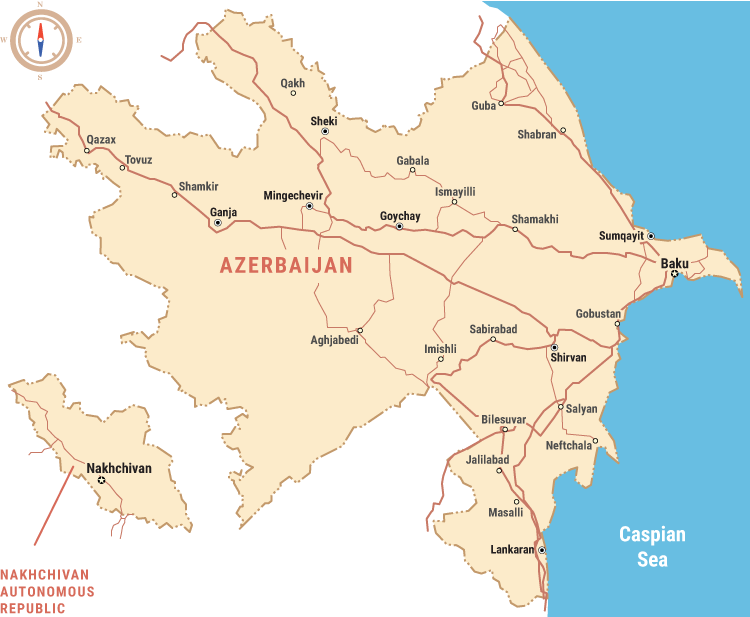
How Many Days Do You Need in Azerbaijan?
Our local tourism specialists have offered their personal Azerbaijan travel advice for must-see sites and itineraries:
- Baku – Metropolitan capital of Azerbaijan where trendy skyscrapers mix with historical sites galore, it’s also the perfect gateway for exploration of Absheron Peninsula and nearby Gobustan. How long should I stay? 1-2 days Major Sites: Icheri Sheher , Heydar Aliyev Center , Baku Boulevard, Nizami Street, Azerbaijan Carpet Museum How to get off the beaten path: Explore the bustling alleys of Green Market (Yashil Bazaar) or visit the Modern Art Museum.
- Greater Baku – This large area surrounding the capital encompasses almost the entire Absheron Peninsula as well as a number of islands. Befitting its size, Greater Baku spoils with a variety of attractions, from natural phenomena to manmade architectural and historical wonders. How long should I stay? 1-2 days Major Sites: Ateshgah Temple , Gobustan Rock Art Cultural Landscape , Gobustan Mud Volcanoes, Yanar Dag How to get off the beaten path: Visit Gala State Historical Ethnographic Reserve to explore the history of Absheron Peninsula.
- Sheki – This fascinating city is the cultural and architectural gem of Azerbaijan. Sheki is rich in Islamic architecture, delectable regional food and fascinating Silk Road history. How long should I stay? 1-2 days Major Sites: Sheki Khan’s Palace , Juma Mosque, Sheki Caravanserai, 19th-century hammam How to get off the beaten path: Dedicate some time to explore Gelersen-Gerersen Fortress , or visit Christian Church in Kish .
- Ganja – One of the oldest cities in the Caucasus, Ganja boasts a plethora of historical and cultural monuments. The town prides itself as the birthplace of the famous Persian poet Nizami, and his tomb is a popular site for visitors. How long should I stay? 1-2 days Major Sites: Imam-zade Mausoleum , Old Ganja Fortress , Nizami Ganjavi Mausoleum , Sheikh Bahauddin Complex , the bottle house How to get off the beaten path: Slow down to enjoy the beauty of Goygol National Park with its alpine landscape, crystal clear lakes and pristine forests.
- Quba – Set on the northeastern slopes of Shahdag Mountain, Quba spoils summer vacationers with a cool climate and spectacular mountain scenery, not to mention the best apples in Azerbaijan. How long should I stay? 1-2 days Major Sites: Chirag-Kala Fortress , Gilgilchay Fortress , Juma Mosque , Sakina-Khanum Mosque How to get off the beaten path: Experience the unique culture of Khinalug , the oldest village in Azerbaijan, or visit the elusive Jewish community at Red Town (Red Sloboda).
- Shamakhi – Home to a sizeable astrophysical observatory, Shamakhi was the former capital of the Shirvan Empire and one of the largest trade centers along the Caucasian Silk Road. Today the city is famous for silk production, carpet weaving and an impressive number of historical monuments. It is also one of the best places to try Azerbaijani wine. How long should I stay? 1-2 days Major Sites: Juma Mosque , Yeddi Gumbez Mausoleum , Village of Lahij , Diri-Baba Mausoleum-Mosque , Gulistan Fortress How to get off the beaten path: Explore local wineries to sample young local wine.
- Nakhichevan (Nakhchivan) – Azerbaijan’s oldest city is also the capital of the Nakhchivan Autonomous Republic. Local tradition claims that Noah founded the city after the Flood and subsequently died and was buried here. To reach Nakhchivan, you must catch a domestic flight from Baku. How long should I stay? 2-3 days Major Sites: Gulistan Mausoleum , Momine Khatun Mausoleum How to get off the beaten path: Leave the city behind and step into the ruins of the magnificent Alinja Fortress, visit the spectacular Karabaglar Mausoleum or explore the ancient Gemigaia Petroglyphs .
- Gabala – An ancient city with a history dating back to the 4th century BC. With its many ruins and relics, Gabala is a perfect destination for history buffs. How long should I stay? 1 day Major Sites: ruins and excavations of Old Gabala , ancient capital of Caucasian Albania How to get off the beaten path: Visit Udin Temple , a unique architectural monument of Caucasian Albania, or drive to Hazra village to see 15th-16th century domed tombs.
- Lankaran – A subtropical paradise in southeast Azerbaijan near the border with Iran. The city’s landscape harmoniously combines high mountain tops, fertile lowlands and pebbly coasts. How long should I stay? 1 day Major Sites: Lankaran Fortress , Pir Hussein Mosque and Mausoleum How to get off the beaten path: Immerse yourself in Khanega , a sophisticated complex of mausoleums and mosques on the banks of Pirsagat river.
- Naftalan – This small city in the foothills of the Lesser Caucasus attests to the importance of oil to Azerbaijan’s economy and culture. In Naftalan, local oil is believed to have therapeutic effects and is used as a natural treatment in unique oil spas. How long should I stay? As long as you want to stay at a spa resort, usually at least a week Major Sites: Naftalan oil spa resort and treatments How to get off the beaten path: Enjoy a visit to the quirky Museum of Crutches, where you can admire a collection of crutches left behind by patients said to be successfully treated in Naftalan.
- Nabran – This popular Caspian Sea resort delights with subtropical forestland and a long, lovely beach. How long should I stay? 1-2 days Major Sites: Nabran beach and affiliated resort facilities How to get off the beaten path: Leave the beach behind and hike in the Nabran forests, rich with unique trees particular to this area.
At Your Service
Whether you would like to join a group tour, arrange a day trip or simply get a little help with domestic transport, we would love to make your trip smooth and memorable. Our Azerbaijan Travel services include:
Azerbaijan Holidays and Festivals
Azerbaijan is the only Muslim country in the South Caucasus, and as such the country’s culture and customs vary widely from their predominantly Christian neighbors. This difference is apparent when it comes to national holidays: As Muslims, Azerbaijanis observe Ramadan Bayrami (Eid al-Fitr) and Gurban Bayrami (Eid al-Adha) but not Christmas or Easter. Persian New Year, or Navruz, is also widely celebrated in the country.
Most parties in Azerbaijan are loud, colorful and full of laughter. This hospitable nation is always happy to welcome guests during festivities, so take advantage of the opportunity by arranging your Azerbaijan travels around one of these celebrations:

New Year (1st-2nd January) – New Year is one of the most popular holidays in the country, a joyful time spent with relatives and friends. It begins on the evening of 31st December with a splendid feast. Once the clock strikes midnight, spectacular fireworks shows erupt all across the country. The best ones take place in Baku, particularly at Baku Boulevard. Best place to celebrate: Baku
Novruz (20th-25th March) – Navruz is the celebration of the Lunar New Year, which according to Persian tradition begins with the arrival of spring. The festival is celebrated with song, dance, games and copious amounts of food. Best place to celebrate: Baku, Sheki
Republic Day (28th May) – Republic Day commemorates the Azerbaijan Democratic Republic, established on 28th May, 1918. The Republic was the first secular democratic country in the Islamic world, a fact which brings great pride to Azerbaijanis. Each year on this day, top officials lay a wreath at the Republic Monument in Baku, and concerts and parades celebrating Azerbaijan’s history and culture are held across the country. Best place to celebrate: Baku
Gabala Music Festival (July-August) – Gabala Festival starts at the end of July and lasts for a week. This open-air festival combines classical piano concerts with jazz improvisations and an evening of traditional mugham music. Best place to celebrate: Gabala (Qabala)
Baku International Jazz Festival (October) – This fantastic musical event, which has been taking place in Baku since 2005, brings together jazz musicians and jazz lovers from all around the globe. Rather than a one-day event, it’s a series of concerts stretched over several days. Best place to celebrate: Baku
Goychay Pomegranate Festival (November) – The Pomegranate Festival is an annual cultural celebration featuring a carnival and an exhibition dedicated to different varieties of pomegranates and pomegranate products. Visitors can also enjoy concerts of traditional Azerbaijani music, performances of various folklore groups and friendly competitions. Best place to celebrate: Goychay
Check out our list of Azerbaijan holidays to learn more about other events you can incorporate into your Azerbaijan travel plans.
Curious about Azerbaijani Cuisine?
Our list of top dishes to taste while in Azerbaijan:
- Dolma: Delicious dish of minced meat, rice, spices and herbs which are wrapped in vine or cabbage leaves or stuffed inside a vegetable before being cooked. In 2017, the Azerbaijani tradition of making dolma was inscribed on the UNESCO List of the Intangible Cultural Heritage of Humanity.
- Kebab: Pieces of seasoned meat, usually mutton, placed on skewers and fried over a coal barbecue called a mangal (manqal). The dish is frequently served with vegetables and a thin, unleavened flatbread called lavash.
- Ovdukh: A yogurt-based soup served cold. Yogurt is mixed with water and poured over sliced boiled meat, hard-boiled eggs, sliced cucumber and herbs.
- Qovurma: A simple yet delicious dish featuring mutton spiced with saffron and stewed with onions and tomatoes. Qovurma can also include chicken and fruit.
- Kufta (kofta): Delectable meatballs made of mutton or beef in tomato sauce. The meal is flavored with onions, salt, pepper, sugar and vinegar.
- Lavangi: – The complete opposite of kufta, it features a whole baked fish, chicken or duck filled with walnuts, onions and spices before being baked. Lavangi is most popular in the coastal regions.
- Piti: A highly popular soup made of tail fat and vegetables cooked in an aromatic mutton bone broth.
- Plov: This sumptuously seasoned rice-based meal comes in over forty varieties that differ in ingredients and cooking techniques. Traditionally, Azerbaijani plov features warm rice and fried pieces of beef or chicken mixed with onions, nuts, dried fruits and spices. In some areas, wheat is used in place of rice.
- Qutab: A thinly rolled dough folded into a cylindrical shape and fried, qutab is usually filled with meat, green vegetables or pumpkin. The finished product is cut into smaller triangular pieces and served with a glass of yogurt.
- Baklava (Pakhlava): Azerbaijan’s most renowned dessert, it’s comprised of layers of thinly rolled wheat or rice dough mixed with honey and nuts. Baklava has many regional variations, but especially popular is the classic Baku pakhlava, with a nut on top of each piece.
Check out our Azerbaijan Travel Guidebook for Food for an in-depth look at
- Azerbaijan’s National Dishes
Dos and Don’ts in Azerbaijan
Azerbaijanis are a gracious people, quick to forgive any mistakes committed by foreigners unfamiliar with local customs. Still, knowing a bit about the host culture is seen as a sign of respect and helps a lot in forging friendships as you travel.
- Take off your shoes before walking into a mosque or home.
- Show respect for the elderly by giving them the best seats on buses and at dinner tables.
- Bring a gift if you will be joining a local family for a meal or an overnight stay.
- Confirm prices with taxi drivers before getting into the car to avoid being overcharged.
- Be prepared to answer personal questions. People in Azerbaijan will be interested in your personal life and will not hesitate to ask about your age, marital status, children, etc. This curiosity is simply a sign of interest and concern.
- Throw bread in the rubbish bin or leave it on the ground, as this is offensive to Azerbaijanis
- Discuss politics.
- Accept gifts straightaway - if someone offers you a present, it is polite to refuse it twice before accepting on the third time.
- Make the OK sign, an offensive gesture in Azerbaijani culture.
- Blow your nose in public, which is rude to Azerbaijanis.
Speak the Language
Knowing a few basic phrases in the local language is the best way to make local friends and connections during your Azerbaijan travels.
Here are some phrases that may come in handy:
Virtual Azerbaijan Travel Guide: Further Reading
- Azerbaijan Travel Tips
- Azerbaijan Tours Pages
Did You Know That...
Azerbaijan may be unfamiliar to many, but the country harbors many fascinating stories and facts:
- Ever heard of the Nobel Peace Prize? Well, Azerbaijan was where the Nobel family made its fortune by discovering and exporting oil to Europe. You can visit the house-museum of the Nobel Brothers in Baku.
- Azerbaijan was where crude oil excavations began. The first well was drilled there in 1848, a decade before drilling started in the United States.
- In other Azerbaijan news, the first oil pipeline in the world was built in 1906 to transfer the “black gold” from Baku to Batumi seaport (519 miles).
- About 45% of the world’s mud volcanoes are in Azerbaijan.
- Neft Daşları is a settlement built entirely on stilts. It started as an oil rig and developed into an entire town situated on elevated walkways in the Caspian Sea.
- Baku is the birthplace of Garry Kasparov, a former World Chess Champion.
Azerbaijan Guide
- Landmarks and Attractions
- UNESCO World Heritage Sites
- Handicrafts
- Exhibitions & Events
- Travel Restrictions - Covid-19
- Azerbaijan Tourism
- Azerbaijan Trip Planner
- Best Time to Visit
- Solo Traveler Guide
- Things to Do in Azerbaijan
- Azerbaijan Visa
- Azerbaijan Embassies
- Embassies in Azerbaijan
- Azerbaijan Airlines
- Crossing Borders
- Telephone Codes
Azerbaijan Services
- Group Tours
- Private Tours
- Cancellation Policy
- meetinazerbaijan
- Tourism Board
- Press & Media
- Azərbaycanca
- inspiring Azerbaijan
- interesting facts
- others about us
- publications
- sustainable Azerbaijan
- Northern route
- North-western route
- Western route
- Southern route
- museums & galleries
- architecture
- crafts making
- heritage sites
- UNESCO heritage
- religious sites
- experience local gastronomy
- wineries in Azerbaijan
- experience Baku's vibrant nightlife
- bazaar experience
- local designers
- national parks
- hiking in Azerbaijan
- adventure & outdoor activities
- birdwatching
- sport & adventure
- nature with kids
- culture with kids
- gastronomy with kids
- entertainment with kids
- medical tourism
- book flight & accommodation
- create your itinerary
- practical information
Azerbaijan through the seasons
- tourist visa to Azerbaijan
- useful vocabulary
- tourist info points
- event calendar
- 0 your favourites
- get inspired
- sustainability
- cities & destinations
- arts, culture and heritage
- food, drinks and nightlife
nature & adventure
- family holidays
health & wellness
- plan your trip
- good to know
what to do in Azerbaijan
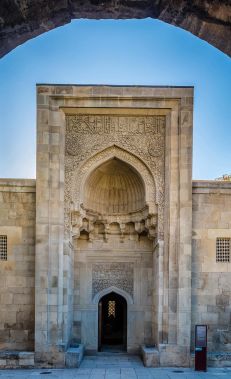
Explore Baku's Old City
A city within a city, the Old City is Baku's historic core and a UNESCO World Heritage Site. It has so much to explore, from the Maiden's Tower and Shirvanshahs' Palace to art galleries, theatres and cafés. More
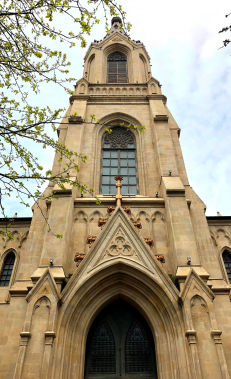
take a walking tour of Baku’s oil-boom architecture
Discover the stunning old architecture built in Baku during the late 19th century, early 20th century oil boom. Be inspired by its mix of styles, marvellous details and amazing stories. More
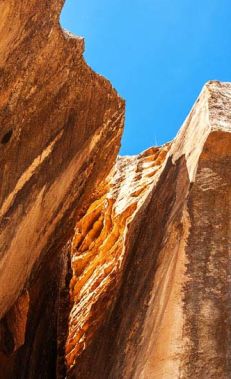
Discover Gobustan's ancient rock art
Uncover an astonishing collection of over 6,000 ancient petroglyphs charting ways of life dating back tens of thousands of years. More
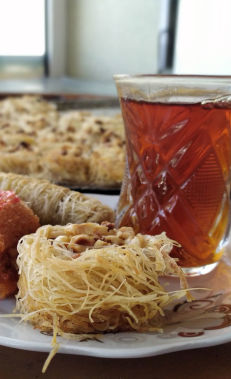
Take a masterclass of Guba cuisine
Learn how to cook the most delicious and traditional Guba sweets like pakhlava or bukma, from local chefs! Take a quick look and see how! More

Play golf in the beautiful countryside of Guba
If you are a golf and nature fan, you should visit Guba’s National Golf Club course in the foothills of the Caucasus Mountains, a splendid place to play! More
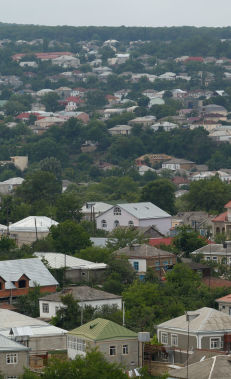
Stroll through time in central Gusar
Discover a peaceful old city highlighted by a few colourful old cottages reminiscent of a time when Gusar was part of the Russian Empire. More
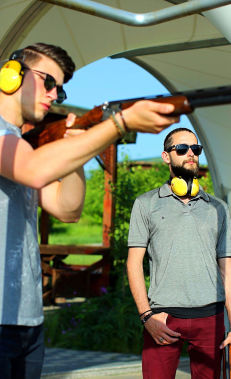
Hit the target at Gabala Shooting Club
Gabala has many shooting experiences set for you to enjoy. Visit the Gabala Shooting Club to improve your aim and enjoy its beautiful natural surroundings. More
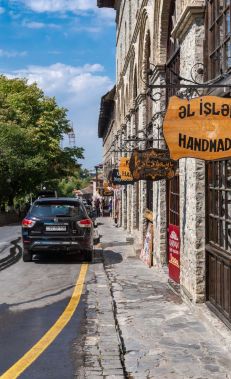
Call into Sheki's craft shops
Step into Sheki's boutiques and admire their authentic craftsmanship. Meet artisans and buy some pots, papags, instruments and more. More
get inspired by Azerbaijan
Select your travel preferences and get personalized recommendations for your trip to Azerbaijan. Drag the dot to indicate how interested you are in the following experiences.
culture & heritage
not interested
keen to avoid nature
shopping & bazaars
no shopping at all
food & drinks
not open to new tastes
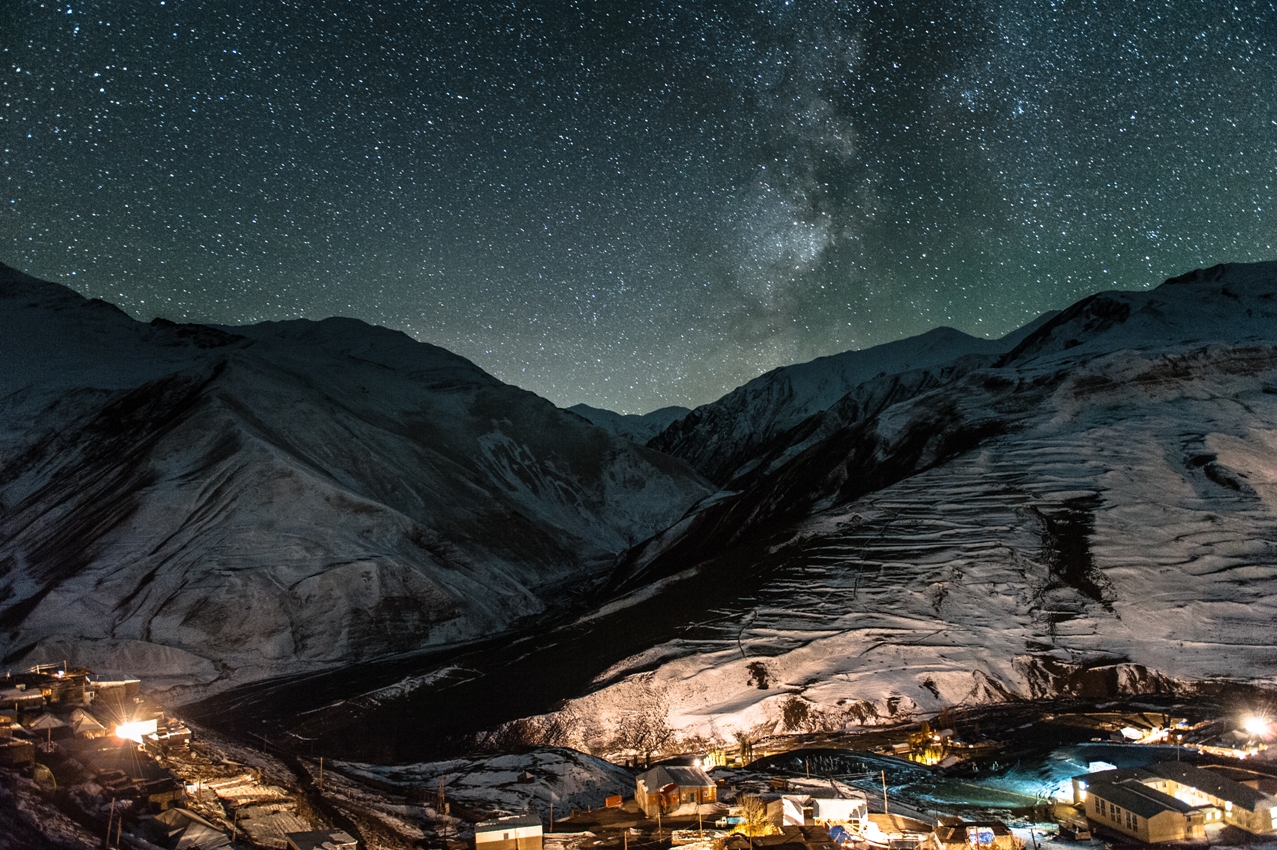
Historical pilgrimage site Imamzadeh Complex
The term ‘Imamzadeh’ signifies ‘descendant of an Imam’ or ‘child of an... More
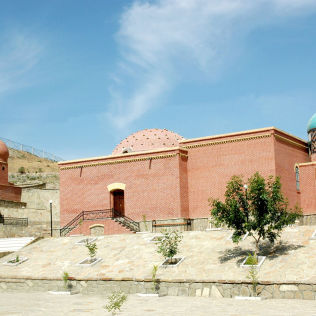
Embrace of nature Kükü village
The village of Kükü is among the larger settlements of Shahbuz District.... More
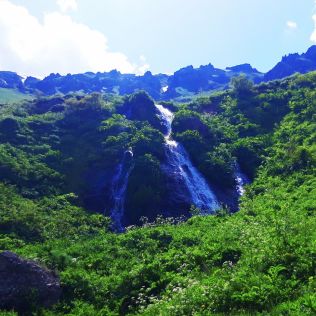
Kamil Aliyev carpets shine with weaving mastery
“Art will never disappear as long as every artist, every professional, no matter their field of art, approaches their work with seriousness and respect,” believed Kamil Aliyev, which is reflected in his works that are on display at Sunny Carpets Gallery in Baku. More
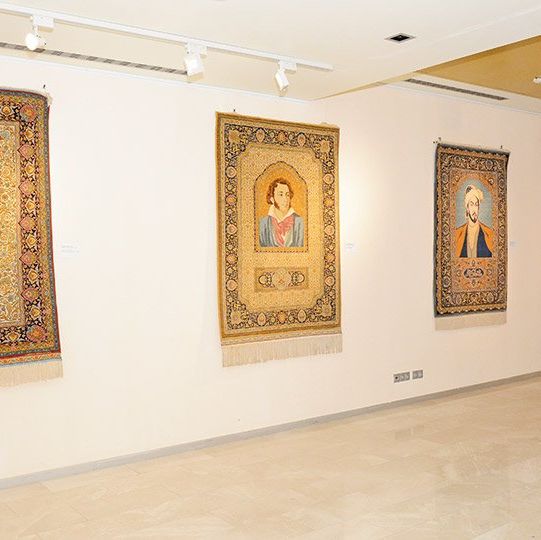
Recreation centres in Nakhchivan
If you're still wondering how best to spend your summer or winter holiday in Nakhchivan, you’ve come to the right... More
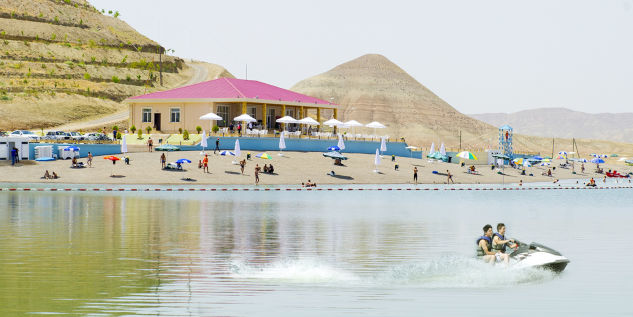
Huseyn Javid House Museum and Memorial Complex
Huseyn Javid was an outstanding Azerbaijani poet and playwright who was active... More
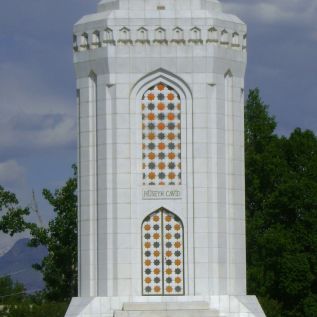
Azerbaijan right now #ExperienceAzerbaijan
Salam azerbaijan practical information.
Here in Azerbaijan you can count on the help of our generous people in every step of your journey. Still, here is some useful information we’d like you to know before you jump on a plane.
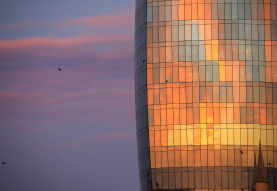
Find out if you need a visa to enter Azerbaijan and learn how to apply to get your e-visa. It is easy and fast. learn more
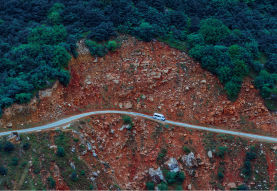
Practical information
Planning a trip can get really complicated, so to make it easier for you here’s a list of all the things you need to consider when planning a visit to Azerbaijan. learn more
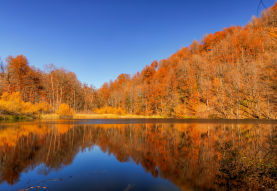
There’s plenty to see and do in Azerbaijan all year round, but every season has its own special vibe. learn more
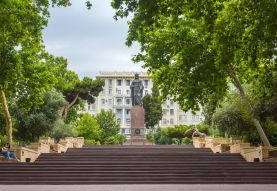
Useful vocabulary
English and Russian are widely understood and spoken in the capital, Baku, but as you travel across the country knowing a few words of Azerbaijani will definitely enrich your experiences. learn more
subscribe to our newsletter
We use cookies to improve your user experience. By using our website, you will be providing your consent to our use of cookies. To find out more, click here.
Cookies on GOV.UK
We use some essential cookies to make this website work.
We’d like to set additional cookies to understand how you use GOV.UK, remember your settings and improve government services.
We also use cookies set by other sites to help us deliver content from their services.
You have accepted additional cookies. You can change your cookie settings at any time.
You have rejected additional cookies. You can change your cookie settings at any time.
beta This is a test version of the layout of this page. Take the survey to help us improve it
- Help and services around the world
- UK help and services in Azerbaijan
Travelling to Azerbaijan
Includes travel advice and how to get married abroad.
Subscriptions
- Get emails for this topic Travelling to Azerbaijan
Azerbaijan travel advice
FCDO travel advice for Azerbaijan. Includes safety and security, insurance, entry requirements and legal differences.
Getting married or registering a civil partnership abroad
Requirements, paperwork and processes for weddings and civil partnerships overseas - registration, restrictions, fees
Reduce your risk from terrorism while abroad
How to minimise your risk, and what to do if there's a terrorist attack.
Is this page useful?
- Yes this page is useful
- No this page is not useful
Help us improve GOV.UK
Don’t include personal or financial information like your National Insurance number or credit card details.
To help us improve GOV.UK, we’d like to know more about your visit today. We’ll send you a link to a feedback form. It will take only 2 minutes to fill in. Don’t worry we won’t send you spam or share your email address with anyone.
- Skip to main content
- Skip to "About this site"
Language selection
Search travel.gc.ca.
Help us to improve our website. Take our survey !
COVID-19: travel health notice for all travellers
Azerbaijan travel advice
Latest updates: Laws and culture – updated information on Ramadan 2025
Last updated: April 15, 2024 14:40 ET
On this page
Safety and security, entry and exit requirements, laws and culture, natural disasters and climate, azerbaijan - exercise a high degree of caution.
Exercise a high degree of caution in Azerbaijan due to regular tensions in areas along the border between Azerbaijan and Armenia.
Districts in the western part of Azerbaijan - Avoid all travel
The Government of Canada’s ability to provide consular services in these regions is extremely limited.
Border with Armenia - Avoid all travel
This advisory excludes the area within 1 km of the border between Armenia and the Azerbaijani Autonomous Republic of Nakhchivan where you should avoid non-essential travel due to the risk of armed clashes.
Back to top
Districts in the western part of Azerbaijan
Unexploded ordnance continue to pose a risk in areas of western Azerbaijan, including the Nagorno-Karabakh region, especially in the following districts:
You must have special travel permission from Azerbaijani authorities to enter these areas.
The Government of Canada’s ability to provide consular services in these regions is extremely limited.
If you decide to travel to the Nagorno-Karabakh region and/or to districts in the Western part of Azerbaijan despite the advisory in effect:
- be extremely vigilant in remote areas
- stay on paved and main roads
- don’t walk in fields
- avoid roadside ditches, shoulders and unmarked trails
- pay attention to signs indicating the possible presence of unexploded ordnance
- report any suspicious items to local authorities
Border areas with Armenia
The Government of Canada’s ability to provide consular services in areas along the Armenia-Azerbaijan international borders is extremely limited.
The security environment remains highly volatile at the border between Azerbaijan and Armenia since the November 2020 ceasefire agreement ending the Second Karabakh War with Azerbaijan. The ceasefire observed by Russian peacekeepers remains in effect, but there have been numerous violations and tensions could resume at any time.
In 2023, Azerbaijan established a border checkpoint at a bridge at the entrance of the Lachin corridor at the border with Armenia. All other border crossings into Armenia are closed.
Border areas with Armenia are subject to extremely dangerous military activities, such as:
- mortar and artillery shelling
- rocket fire
- drone attacks
- heavy gunfire
If you choose to travel near the border with Armenia despite this advisory:
- exercise caution at all times
- avoid travelling at night
- monitor local and international media to stay informed on clashes
- follow instructions from local authorities and security forces
Crime is relatively low. Most reported crimes involve burglary, assault or petty crime, such as pickpocketing.
Thieves sometimes pose as police officers and demand that tourists pay on-the-spot fines. If faced with this situation, offer to follow the officer to the nearest police station to pay the fine.
- Avoid walking alone after dark
- Be careful in areas that attract large crowds and areas that are very isolated or dimly lit
- Don’t carry large amounts of cash
- Don’t display signs of affluence
- Ensure that your belongings, including your passport and other travel documents, are secure at all times
Credit card and ATM fraud occurs. Be cautious when using debit or credit cards:
- pay careful attention when your cards are being handled by others
- use ATMs located in well-lit public areas or inside a bank or business
- avoid using card readers with an irregular or unusual feature
- cover the keypad with one hand when entering your PIN
- check for any unauthorized transactions on your account statements
If you’re travelling to Azerbaijan to meet someone you’ve only met online, you may be the victim of a scam.
More about overseas fraud
Spiked food and drinks
There have been incidents of drink spiking, resulting in victims being robbed.
Never leave food or drinks unattended or in the care of strangers. Be wary of accepting snacks, beverages, gum or cigarettes from new acquaintances. These items may contain drugs that could put you at risk of sexual assault and robbery.
Demonstrations
Demonstrations take place from time to time.
Even peaceful demonstrations can turn violent at any time. Police may use force to suppress demonstrations.
They can also lead to disruptions to traffic and public transportation.
- Avoid areas where demonstrations and large gatherings are taking place
- Follow the instructions of local authorities
- Monitor local media for information on ongoing demonstrations
More about mass gatherings (large-scale events)
There is a threat of terrorism. Terrorist attacks could occur at any time.
Targets could include:
- government buildings, including schools
- places of worship
- airports and other transportation hubs and networks
- public areas such as tourist attractions, restaurants, bars, coffee shops, shopping centres, markets, hotels and other sites frequented by foreigners
Always be aware of your surroundings in public places.
Stay at hotels that have robust security measures. Keep in mind, however, that even the most secure locations can’t be considered completely free of risk.
Road Safety
Highways and major city roads are well-maintained, but driving can still be dangerous due to poor driving standards and poorly maintained cars. Many drivers do not pay attention to speed limit, traffic rules and traffic signs. Insufficient street lighting and signage make travel dangerous outside of Baku. The risk increases on certain roads that are shared with pedestrians and livestock.
Authorities don’t enforce traffic rules consistently.
Pedestrians should exercise caution.
Public transportation
Buses are poorly maintained, often overcrowded and unsafe, particularly outside of Baku. Baku Metro is reasonably maintained and has basic safety equipment. Expect to see security cameras throughout the platforms and a police presence at each metro station, particularly at night.
Only use officially marked taxis, which are metered, have seatbelts and are cheaper than unmarked taxis. Avoid shared taxis and unofficial taxis because passengers have been assaulted.
If you must travel by train, store personal belongings in a safe place and don’t leave your compartment unattended. Ensure the door is secured from the inside.
We do not make assessments on the compliance of foreign domestic airlines with international safety standards.
Information about foreign domestic airlines
General safety information
Tourist facilities are limited outside of the Absheron Peninsula, Baku, Lankoran and Quba.
Every country or territory decides who can enter or exit through its borders. The Government of Canada cannot intervene on your behalf if you do not meet your destination’s entry or exit requirements.
We have obtained the information on this page from the Azerbaijani authorities. It can, however, change at any time.
Verify this information with the Foreign Representatives in Canada .
Entry requirements vary depending on the type of passport you use for travel.
Before you travel, check with your transportation company about passport requirements. Its rules on passport validity may be more stringent than the country’s entry rules.
Regular Canadian passport
Your passport must be valid for at least 3 months beyond the date you expect to leave from Azerbaijan.
Passport for official travel
Different entry rules may apply.
Official travel
Passport with “X” gender identifier
While the Government of Canada issues passports with an “X” gender identifier, it cannot guarantee your entry or transit through other countries. You might face entry restrictions in countries that do not recognize the “X” gender identifier. Before you leave, check with the closest foreign representative for your destination.
Other travel documents
Different entry rules may apply when travelling with a temporary passport or an emergency travel document. Before you leave, check with the closest foreign representative for your destination.
Useful links
- Foreign Representatives in Canada
- Canadian passports
Canadians must be in possession of a visa to visit Azerbaijan.
Tourist visa: Required
Business visa: Required
Student visa: Required
Transit visa: Required
If you plan to visit Azerbaijan, you must have a visa before arriving in the country. As a tourist, you can apply for an e-visa through Azerbaijan’s online visa portal. You should do so at least 3 days before your planned arrival date.
E-visas are single entry and are valid for 30 days. If you require any other type of visa, you must apply for it from the Embassy of the Republic of Azerbaijan prior to departure.
To obtain any type of visa, you must present a letter of invitation from a contact in Azerbaijan, such as an employer or educational institution. If you don’t have a contact in Azerbaijan, the invitation letter should be submitted by the travel agency in Azerbaijan.
Azerbaijan’s online visa portal
Registration
You must register with the State Migration Service within 15 calendar days of arrival if you intend to stay more than 15 days. Ensure that your passport is stamped with a residency stamp.
Failure to register could result in a fine. You may be stopped from leaving Azerbaijan until the fine is paid.
If you intend to stay in Azerbaijan for more than 30 days, you must obtain a temporary residence card or apply to extend your visa.
State Migration Service
Nagorno-Karabakh
You may need to obtain prior authorization from the Azerbaijan authorities to enter and/or exit the Nagorno-Karabakh region. You should contact the nearest embassy or consulate of Azerbaijan before you travel.
Yellow fever
Learn about potential entry requirements related to yellow fever (vaccines section).
Children and travel
Learn more about travelling with children .
Relevant Travel Health Notices
- Global Measles Notice - 13 March, 2024
- COVID-19 and International Travel - 13 March, 2024
This section contains information on possible health risks and restrictions regularly found or ongoing in the destination. Follow this advice to lower your risk of becoming ill while travelling. Not all risks are listed below.
Consult a health care professional or visit a travel health clinic preferably 6 weeks before you travel to get personalized health advice and recommendations.
Routine vaccines
Be sure that your routine vaccinations , as per your province or territory , are up-to-date before travelling, regardless of your destination.
Some of these vaccinations include measles-mumps-rubella (MMR), diphtheria, tetanus, pertussis, polio, varicella (chickenpox), influenza and others.
Pre-travel vaccines and medications
You may be at risk for preventable diseases while travelling in this destination. Talk to a travel health professional about which medications or vaccines may be right for you, based on your destination and itinerary.
Yellow fever is a disease caused by a flavivirus from the bite of an infected mosquito.
Travellers get vaccinated either because it is required to enter a country or because it is recommended for their protection.
- There is no risk of yellow fever in this country.
Country Entry Requirement*
- Proof of vaccination is not required to enter this country.
Recommendation
- Vaccination is not recommended.
* It is important to note that country entry requirements may not reflect your risk of yellow fever at your destination. It is recommended that you contact the nearest diplomatic or consular office of the destination(s) you will be visiting to verify any additional entry requirements.
About Yellow Fever
Yellow Fever Vaccination Centres in Canada
There is a risk of hepatitis A in this destination. It is a disease of the liver. People can get hepatitis A if they ingest contaminated food or water, eat foods prepared by an infectious person, or if they have close physical contact (such as oral-anal sex) with an infectious person, although casual contact among people does not spread the virus.
Practise safe food and water precautions and wash your hands often. Vaccination is recommended for all travellers to areas where hepatitis A is present.
Hepatitis B is a risk in every destination. It is a viral liver disease that is easily transmitted from one person to another through exposure to blood and body fluids containing the hepatitis B virus. Travellers who may be exposed to blood or other bodily fluids (e.g., through sexual contact, medical treatment, sharing needles, tattooing, acupuncture or occupational exposure) are at higher risk of getting hepatitis B.
Hepatitis B vaccination is recommended for all travellers. Prevent hepatitis B infection by practicing safe sex, only using new and sterile drug equipment, and only getting tattoos and piercings in settings that follow public health regulations and standards.
Measles is a highly contagious viral disease. It can spread quickly from person to person by direct contact and through droplets in the air.
Anyone who is not protected against measles is at risk of being infected with it when travelling internationally.
Regardless of where you are going, talk to a health care professional before travelling to make sure you are fully protected against measles.
Coronavirus disease (COVID-19) is an infectious viral disease. It can spread from person to person by direct contact and through droplets in the air.
It is recommended that all eligible travellers complete a COVID-19 vaccine series along with any additional recommended doses in Canada before travelling. Evidence shows that vaccines are very effective at preventing severe illness, hospitalization and death from COVID-19. While vaccination provides better protection against serious illness, you may still be at risk of infection from the virus that causes COVID-19. Anyone who has not completed a vaccine series is at increased risk of being infected with the virus that causes COVID-19 and is at greater risk for severe disease when travelling internationally.
Before travelling, verify your destination’s COVID-19 vaccination entry/exit requirements. Regardless of where you are going, talk to a health care professional before travelling to make sure you are adequately protected against COVID-19.
The best way to protect yourself from seasonal influenza (flu) is to get vaccinated every year. Get the flu shot at least 2 weeks before travelling.
The flu occurs worldwide.
- In the Northern Hemisphere, the flu season usually runs from November to April.
- In the Southern Hemisphere, the flu season usually runs between April and October.
- In the tropics, there is flu activity year round.
The flu vaccine available in one hemisphere may only offer partial protection against the flu in the other hemisphere.
The flu virus spreads from person to person when they cough or sneeze or by touching objects and surfaces that have been contaminated with the virus. Clean your hands often and wear a mask if you have a fever or respiratory symptoms.
In this destination, rabies is commonly carried by dogs and some wildlife, including bats. Rabies is a deadly disease that spreads to humans primarily through bites or scratches from an infected animal. While travelling, take precautions , including keeping your distance from animals (including free-roaming dogs), and closely supervising children.
If you are bitten or scratched by a dog or other animal while travelling, immediately wash the wound with soap and clean water and see a health care professional. In this destination, rabies treatment may be limited or may not be available, therefore you may need to return to Canada for treatment.
Before travel, discuss rabies vaccination with a health care professional. It may be recommended for travellers who are at high risk of exposure (e.g., occupational risk such as veterinarians and wildlife workers, children, adventure travellers and spelunkers, and others in close contact with animals).
Safe food and water precautions
Many illnesses can be caused by eating food or drinking beverages contaminated by bacteria, parasites, toxins, or viruses, or by swimming or bathing in contaminated water.
- Learn more about food and water precautions to take to avoid getting sick by visiting our eat and drink safely abroad page. Remember: Boil it, cook it, peel it, or leave it!
- Avoid getting water into your eyes, mouth or nose when swimming or participating in activities in freshwater (streams, canals, lakes), particularly after flooding or heavy rain. Water may look clean but could still be polluted or contaminated.
- Avoid inhaling or swallowing water while bathing, showering, or swimming in pools or hot tubs.
Travellers' diarrhea is the most common illness affecting travellers. It is spread from eating or drinking contaminated food or water.
Risk of developing travellers' diarrhea increases when travelling in regions with poor standards of hygiene and sanitation. Practise safe food and water precautions.
The most important treatment for travellers' diarrhea is rehydration (drinking lots of fluids). Carry oral rehydration salts when travelling.
Typhoid is a bacterial infection spread by contaminated food or water. Risk is higher among children, travellers going to rural areas, travellers visiting friends and relatives or those travelling for a long period of time.
Travellers visiting regions with a risk of typhoid, especially those exposed to places with poor sanitation, should speak to a health care professional about vaccination.
Insect bite prevention
Many diseases are spread by the bites of infected insects such as mosquitoes, ticks, fleas or flies. When travelling to areas where infected insects may be present:
- Use insect repellent (bug spray) on exposed skin
- Cover up with light-coloured, loose clothes made of tightly woven materials such as nylon or polyester
- Minimize exposure to insects
- Use mosquito netting when sleeping outdoors or in buildings that are not fully enclosed
To learn more about how you can reduce your risk of infection and disease caused by bites, both at home and abroad, visit our insect bite prevention page.
Find out what types of insects are present where you’re travelling, when they’re most active, and the symptoms of the diseases they spread.
Animal precautions
Some infections, such as rabies and influenza, can be shared between humans and animals. Certain types of activities may increase your chance of contact with animals, such as travelling in rural or forested areas, camping, hiking, and visiting wet markets (places where live animals are slaughtered and sold) or caves.
Travellers are cautioned to avoid contact with animals, including dogs, livestock (pigs, cows), monkeys, snakes, rodents, birds, and bats, and to avoid eating undercooked wild game.
Closely supervise children, as they are more likely to come in contact with animals.
Human cases of avian influenza have been reported in this destination. Avian influenza is a viral infection that can spread quickly and easily among birds and in rare cases it can infect mammals, including people. The risk is low for most travellers.
Avoid contact with birds, including wild, farm, and backyard birds (alive or dead) and surfaces that may have bird droppings on them. Ensure all poultry dishes, including eggs and wild game, are properly cooked.
Travellers with a higher risk of exposure include those:
- visiting live bird/animal markets or poultry farms
- working with poultry (such as chickens, turkeys, domestic ducks)
- hunting, de-feathering, field dressing and butchering wild birds and wild mammals
- working with wild birds for activities such as research, conservation, or rehabilitation
- working with wild mammals, especially those that eat wild birds (e.g., foxes)
All eligible people are encouraged to get the seasonal influenza shot, which will protect them against human influenza viruses. While the seasonal influenza shot does not prevent infection with avian influenza, it can reduce the chance of getting sick with human and avian influenza viruses at the same time.
Person-to-person infections
Stay home if you’re sick and practise proper cough and sneeze etiquette , which includes coughing or sneezing into a tissue or the bend of your arm, not your hand. Reduce your risk of colds, the flu and other illnesses by:
- washing your hands often
- avoiding or limiting the amount of time spent in closed spaces, crowded places, or at large-scale events (concerts, sporting events, rallies)
- avoiding close physical contact with people who may be showing symptoms of illness
Sexually transmitted infections (STIs) , HIV , and mpox are spread through blood and bodily fluids; use condoms, practise safe sex, and limit your number of sexual partners. Check with your local public health authority pre-travel to determine your eligibility for mpox vaccine.
Tuberculosis is an infection caused by bacteria and usually affects the lungs.
For most travellers the risk of tuberculosis is low.
Travellers who may be at high risk while travelling in regions with risk of tuberculosis should discuss pre- and post-travel options with a health care professional.
High-risk travellers include those visiting or working in prisons, refugee camps, homeless shelters, or hospitals, or travellers visiting friends and relatives.
Medical services and facilities
Good health care is only available in major cities. Medical facilities outside Baku are very limited.
If you are travelling with prescription medication, check with the Azerbaijani embassy to ensure that your medication is legal in Azerbaijan. Carry a copy of your doctor’s prescription and the medication in its original packaging.
Avoid older medical clinics, which often lack basic drugs and equipment and have poor hygiene standards. Some medical clinics require upfront payment in cash for treatment. Medical evacuation, which can be very expensive, may be necessary in the event of serious illness or injury.
Make sure you get travel insurance that includes coverage for medical evacuation and hospital stays.
Travel health and safety
Keep in Mind...
The decision to travel is the sole responsibility of the traveller. The traveller is also responsible for his or her own personal safety.
Be prepared. Do not expect medical services to be the same as in Canada. Pack a travel health kit , especially if you will be travelling away from major city centres.
You must abide by local laws.
Learn about what you should do and how we can help if you are arrested or detained abroad .
Illegal or restricted activities
It is strictly forbidden to take pictures of military installations and equipment. Trespassing on military sites can lead to arrest. Visitors have been detained and questioned when attempting to photograph military bases, equipment and installations, all of which are considered sensitive.
Promoting religion and trying to convert others are not permitted.
Identification
Carry your passport at all times. Keep a photocopy of your passport in a safe place in case it’s lost or confiscated. If you are a resident, you must provide proof of residency status. Police checks in public areas are common. You could be fined if you fail to provide proper identification on request from an official.
Penalties for possession, use or trafficking of illegal drugs are severe. Convicted offenders can expect jail sentences of 3 to 7 years and/or heavy fines.
Drugs, alcohol and travel
2SLGBTQI+ travellers
Azerbaijani law does not prohibit sexual acts between individuals of the same sex. However, homosexuality is not widely accepted in Azerbaijani society.
Travel and your sexual orientation, gender identity, gender expression and sex characteristics
Dual citizenship
Azerbaijan doesn’t legally recognize dual citizenship for adults (those 18 or older).
If local authorities consider you a citizen of Azerbaijan, they may refuse to grant you access to Canadian consular services. This will prevent us from providing you with those services.
A citizen of Azerbaijan who has adopted citizenship of a foreign country needs to provide written information to the relevant Azerbaijani executive authority within a month. If you are in Azerbaijan, refer to the State Migration Service. If you are outside of the country, then refer to the Ministry of Foreign Affairs of Azerbaijan. Persons who do not report will be punished with fines ranging from 3000 to 5000 manats and/or community works from 360 to 480 hours, in accordance with the Criminal Code of Azerbaijan.
Canadians with Azerbaijani citizenship may be subject to national obligations, such as taxes and military service, and should check their status with the Embassy of the Republic of Azerbaijan to Canada prior to travelling.
Military service is mandatory for male Azerbaijani citizens between the ages of 18 and 35. Those who have not completed their military service could face fines or arrest.
General information for travellers with dual citizenship
International Child Abduction
The Hague Convention on the Civil Aspects of International Child Abduction is an international treaty. It can help parents with the return of children who have been removed to or retained in certain countries in violation of custody rights. It does not apply between Canada and Azerbaijan.
If your child was wrongfully taken to, or is being held in Azerbaijan by an abducting parent:
- act as quickly as you can
- consult a lawyer in Canada and in Azerbaijan to explore all the legal options for the return of your child
- report the situation to the nearest Canadian government office abroad or to the Vulnerable Children’s Consular Unit at Global Affairs Canada by calling the Emergency Watch and Response Centre.
If your child was removed from a country other than Canada, consult a lawyer to determine if The Hague Convention applies.
Be aware that Canadian consular officials cannot interfere in private legal matters or in another country’s judicial affairs.
- International Child Abduction: A Guidebook for Left-Behind Parents
- Travelling with children
- Canadian embassies and consulates by destination
- Emergency Watch and Response Centre
You must carry an international driving permit.
International Driving Permit
There is zero tolerance for drinking and driving.
Traffic stops are common. Always carry your licence, IDP, proof of insurance and vehicle registration.
You must have the following documents in the car:
- vehicle registration document
- passport and driver’s licence
- proof of insurance
- first aid kit
- proof that the car is roadworthy (check-up card)
If you own a car, you must get an annual roadworthiness test done between January 1 and October 31. You will be given a check-up card each year after the inspection.
Imports and exports
Customs authorities strictly enforce regulations concerning the import or export of firearms, religious materials, pieces of art and antiquities.
You must declare foreign currency upon entry. You can’t leave the country with more than you brought in.
Dress and behaviour
Azerbaijan is a secular state, but some people closely adhere to Islamic practices and beliefs.
- Behave discreetly
- Respect religious and social traditions to avoid offending local sensitivities
In 2025, the lunar month of Ramadan is expected to begin on or around February 28.
In public, between sunrise and sunset, be discreet when:
The currency of Azerbaijan is the Azerbaijani manat (AZN).
The economy is mostly cash-based. Credit cards are accepted at banks in Baku and in major hotels and restaurants. Few establishments accept credit cards outside of Baku. Several ATMs in major cities dispense both U.S. dollars and Azerbaijani manat.
Azerbaijan is in an active seismic zone.
Heavy rains may trigger floods and landslides, but there are also periods of drought.
Local services
In case of emergency, dial:
- police: 102
- medical assistance: 103
- firefighters: 101
The Police Office of Crimes By and Against Foreigners offers service in English. You can reach the office at +944 12 590 9966.
Consular assistance
There is no resident Canadian government office in Azerbaijan.You can obtain consular assistance and further consular information from the Embassy of Canada in Ankara, Türkiye.
Azerbaijan, Georgia. Offering consular services to Canadians in Iran.
For emergency consular assistance, call the embassy of Canada in Ankara and follow the instructions. At any time, you may also contact the Emergency Watch and Response Centre in Ottawa.
The decision to travel is your choice and you are responsible for your personal safety abroad. We take the safety and security of Canadians abroad very seriously and provide credible and timely information in our Travel Advice to enable you to make well-informed decisions regarding your travel abroad.
The content on this page is provided for information only. While we make every effort to give you correct information, it is provided on an "as is" basis without warranty of any kind, expressed or implied. The Government of Canada does not assume responsibility and will not be liable for any damages in connection to the information provided.
If you need consular assistance while abroad, we will make every effort to help you. However, there may be constraints that will limit the ability of the Government of Canada to provide services.
Learn more about consular services .
Risk Levels
take normal security precautions.
Take similar precautions to those you would take in Canada.
Exercise a high degree of caution
There are certain safety and security concerns or the situation could change quickly. Be very cautious at all times, monitor local media and follow the instructions of local authorities.
IMPORTANT: The two levels below are official Government of Canada Travel Advisories and are issued when the safety and security of Canadians travelling or living in the country or region may be at risk.
Avoid non-essential travel
Your safety and security could be at risk. You should think about your need to travel to this country, territory or region based on family or business requirements, knowledge of or familiarity with the region, and other factors. If you are already there, think about whether you really need to be there. If you do not need to be there, you should think about leaving.
Avoid all travel
You should not travel to this country, territory or region. Your personal safety and security are at great risk. If you are already there, you should think about leaving if it is safe to do so.

Travel Advice for Azerbaijan
Going to Azerbaijan and need to know about the latest government travel advice for Azerbaijan? Find the updated travel advice and travel warnings for Azerbaijan from governments around the world, here.
General Travel Advice and Warnings for Azerbaijan
The decision to take a trip to Azerbaijan is your choice and you are in charge of your individual safety and security whilst in Azerbaijan.
The content on this page is provided for information only and gathered from travel advice and warnings for Azerbaijan by governments around the globe to their citizens.
While we strive to give you accurate travel advice information, it is provided on an “as is” basis without warranty of any kind, expressed or implied.
This operators of this site does not assume responsibility and will not be liable for any damages in connection to the information offered.
General Cautions You Need to Bear In Mind Whilst Taking a Trip in Azerbaijan
Crime – Petty criminal activities such as pick pocketing in a crowded environment to sexual assault and robberies do occur in bigger cities of Azerbaijan. Make sure that all your personal valuables, including passports and other travel documents, are secure at all times.
Terrorism – Always be aware of your surroundings when in public places. Be particularly watchful if participating in sporting occasions and throughout religious holidays and various other public celebrations, as terrorists often use such celebrations to mount attacks.
Demonstrations and Protests – Demonstrations may take place. Even peaceful demonstrations can turn violent any time. They can also lead to disruptions to traffic and public transport. It is in your interest of safety and security to keep away from areas where demonstrations and big events are happening and comply with the directions of local authorities. Monitor local media in Azerbaijan for information on on-going demonstrations in Azerbaijan.
Scams – Take care in crowded tourist locations in Azerbaijan, where scammers target tourists. If you have actually been scammed in Azerbaijan, get to a safe location right away; take note, as soon as possible of the name and address of the facility where you were held; inform the police in Azerbaijan and get a report and if your credit card is used by the scammer call your credit card company to report the fraud; they will likely request a copy of the police report to cancel the financial transaction.
Spiked Food and Drinks – Never ever leave food or beverages unattended or in the care of strangers whilst taking a trip in Azerbaijan or anywhere else. Be wary of accepting snacks, beverages, gum or cigarettes from new acquaintances. These items may have drugs that could put you at risk of sexual assault and mugging.
What is the entry/exit conditions for Azerbaijan?
Every country or territory determines who can get in or exit through its borders, likewise Azerbaijan decides exactly who enter its borders. The Government of your home country cannot step in on your behalf if you do not meet your Azerbaijan’s entry or exit requirements.
To read more regarding the entry/exit requirement for Azerbaijan go to visa requirements for Azerbaijan or get the most recent information with the visa office at the Azerbaijani consulate in your home country.
Travel insurance for Azerbaijan
Health cover is just one of the major factors visitors obtain travel insurance. It will not avoid you getting ill or seriously injured, though it can prevent you suffering financially. Medical assistance overseas can be extremely expensive.
You must pay for all treatment you receive overseas. You can not expect to get free or subsidised care through your Azerbaijan’s public health system, like you would in your home country.
If you can’t pay, local authorities might jail you. The government from your home country can’t pay you medical costs for you, loan you money or get you out of jail.
You need travel insurance coverage for travelling to Azerbaijan . You also need to ensure you select a policy that is right for you.
Read the small print of your travel insurance policy.
Declare all pre-existing conditions to your travel insurance firm upfront. If you don’t, you might invalidate your travel insurance plan.
Inform your travel insurer the activities you plan to do, prior to you go. Many popular activities like snowboarding are omitted in standard policies. You might need to pay additional.
Check if you have free credit card travel insurance coverage. Some cards include travel insurance coverage cover. Nonetheless, they usually have various conditions than paid policies. Be aware of the differences.
If you’re visiting Azerbaijan from a country that has a reciprocatory healthcare arrangement, you still need travel health insurance. Agreements are restricted in what they’ll will cover.
If you have an incurable illness, you might not be able to obtain basic travel insurance policy. Nonetheless you may have the ability to find a specialised insurance company that covers you for health, accidents or property troubles unconnected to your ailment. Speak with your insurance company to find out.
Find out more about getting international travel insurance policy for Azerbaijan before you go.
© 2021 Government Travel Advice
- Terms and Conditions
- Privacy Policy

IMAGES
VIDEO
COMMENTS
Travel Advisory. November 2, 2023. Azerbaijan - Level 2: Exercise Increased Caution. O T. Reissued after periodic review with general security updates. Exercise increased caution in Azerbaijan due to terrorism concerns and areas of armed conflict. Some areas have increased risk. Read the entire Travel Advisory.
Nagorno-Karabakh and surrounding areas. The Foreign, Commonwealth & Development Office ( FCDO) advises against all travel to: Nagorno-Karabakh. the districts ('rayons') of Zengilan, Jabrayil ...
If you decide to travel to the Nagorno-Karabakh region and/or to districts in the Western part of Azerbaijan despite the advisory in effect: be extremely vigilant in remote areas. stay on paved and main roads. don't walk in fields. avoid roadside ditches, shoulders and unmarked trails.
COVID-19 Restrictions & Advisory. Last updated on 11/03/2024. The health and safety of our residents and visitors is of utmost priority and the Operational Headquarters under the Cabinet of Ministers of the Republic of Azerbaijan is working closely with the World Health Organization to monitor and limit the transmission of coronavirus (COVID-19).
Azerbaijan Level 3 Travel Advisory (August 31, 2022) By U.S. Embassy Baku. 5 MINUTE READ. August 31, 2022. Last Update: Reissued with updates to health information. Reconsider travel to Azerbaijan due to COVID-19-related restrictions and terrorism concerns. Some areas have increased risk. Read the entire Travel Advisory.
If, despite our advice, you travel to these areas, get professional security advice. Protests can turn violent. Avoid large public gatherings and exercise heightened caution in locations where foreigners may gather. Violent crime is rare in Azerbaijan, but foreigners have reported serious crimes, including home burglaries, robbery and assault.
Read more advice for LGBT+ travellers. Transport risks Road travel. If you are planning to drive in Azerbaijan, see information on driving abroad and read the RAC guide on driving in Azerbaijan ...
FCDO travel advice for Azerbaijan. Includes safety and security, insurance, entry requirements and legal differences.
An Ultimate Guide to Azerbaijan. aworldtotravel. on December 15, 2023 at 11:00 AM. If you're searching for an exciting, lesser-known destination for your next trip, Azerbaijan is an excellent choice. It's not overrun by tourists, which means you'll get to explore its unique charms without the crowds.
Follow basic safety tips. Wear a seatbelt at all times. Sit in the back seat of cars and taxis. When on motorbikes or bicycles, always wear a helmet. (Bring a helmet from home, if needed.) Avoid driving at night; street lighting in certain parts of Azerbaijan may be poor. Do not use a cell phone or text while driving (illegal in many countries).
For additional travel information. Enroll in the Smart Traveler Enrollment Program (STEP) to receive security messages and make it easier to locate you in an emergency. Call us in Washington, D.C. at 1-888-407-4747 (toll-free in the United States and Canada) or 1-202-501-4444 (from all other countries) from 8:00 a.m. to 8:00 p.m., Eastern ...
Spend a day in Gobustan National Park, home to sloshing mud volcanoes and petroglyphs. After dark, head to Yanar Dag, an oil seam that was set aflame by a farmer's cigarette butt in the 1970s and has been lighting up the night ever since. Travel around Azerbaijan by bus, following in the footsteps of traders and merchants who once coursed ...
Azerbaijan - Level 2: Exercise Increased Caution (November 15, 2022) Last Update: Reissued with updates to the Travel Advisory level, health information and "Do Not Travel" areas. Exercise increased caution in Azerbaijan due to terrorism concerns and areas of armed conflict. Some areas have increased risk. Read the entire Travel Advisory.
Azerbaijan Travel Costs. Accommodation - There are only a handful of hostel options in Azerbaijan. A bed in a 4-6-bed dorm costs around 26-32 AZN per night in Baku and 10-20 AZN anywhere else. Prices in Baku are generally higher than elsewhere around the country.
Azerbaijan Travel Advice - Top Tips. Baku is not called the "City of Beating Winds" for nothing. In the semi-desert city, the desert sand sweeps through the streets now and then. In a country like Azerbaijan, which has nine of eleven existing climate zones, the regional climatic conditions can vary greatly.
The Foreign, Commonwealth & Development Office (FCDO) cannot provide tailored advice for individual trips. Read this travel advice and carry out your own research before deciding whether to travel. Emergency services in Azerbaijan. Ambulance: 103. Fire: 101. Police: 102. Contact your travel provider and insurer
FCDO travel advice for Azerbaijan. Includes safety and security, insurance, entry requirements and legal differences.
Azerbaijan travel invites you on a journey across the Caucasus Silk Road to a land defined by diverse beauty, unusual natural phenomena and a colorful, upbeat culture. Use the travel guide to plan your next vacation, from visas and transportation to suggested itineraries and a crash course in the Azerbaijani language.
Baku Metro Ride - $0.12 (Yes, seriously) Baku Bus Ride - $0.12. Uber Ride in Baku - Between $2 and $4. Marshrutka Shared Bus Between Cities - Between $2 and $4. As you can see, depending on your travel style it is very easy to keep your costs of travelling in Azerbaijan down to around $20-$30 per day.
Visa. The land where the east meets the west, the sea hugs the mountains, and the old coexists with the new. From the people and their traditions to the culture and scenery, everything will take your breath away and compel you to take another look. Come visit Azerbaijan and experience all that it has to offer..
Azerbaijan travel advice. FCDO travel advice for Azerbaijan. Includes safety and security, insurance, entry requirements and legal differences. Getting married abroad
The border with Armenia, including the Nakhchivan Autonomous Republic of Azerbaijan, is closed. Nagorno-Karabakh and surrounding areas. Tensions between Azerbaijan and Armenia are high, due to territorial disputes. In September 2020, a violent conflict occurred between Armenia and Azerbaijan.
Crime - Petty criminal activities such as pick pocketing in a crowded environment to sexual assault and robberies do occur in bigger cities of Azerbaijan. Make sure that all your personal valuables, including passports and other travel documents, are secure at all times. Terrorism - Always be aware of your surroundings when in public places.